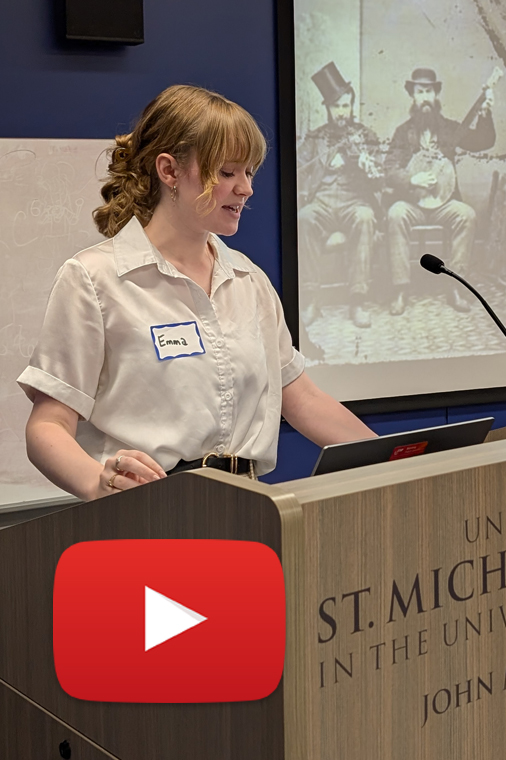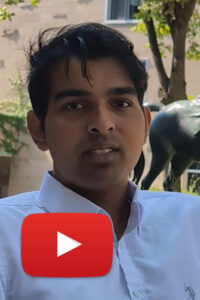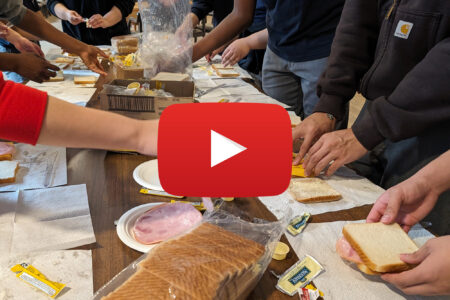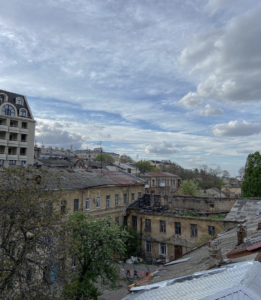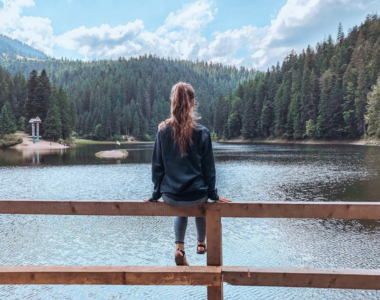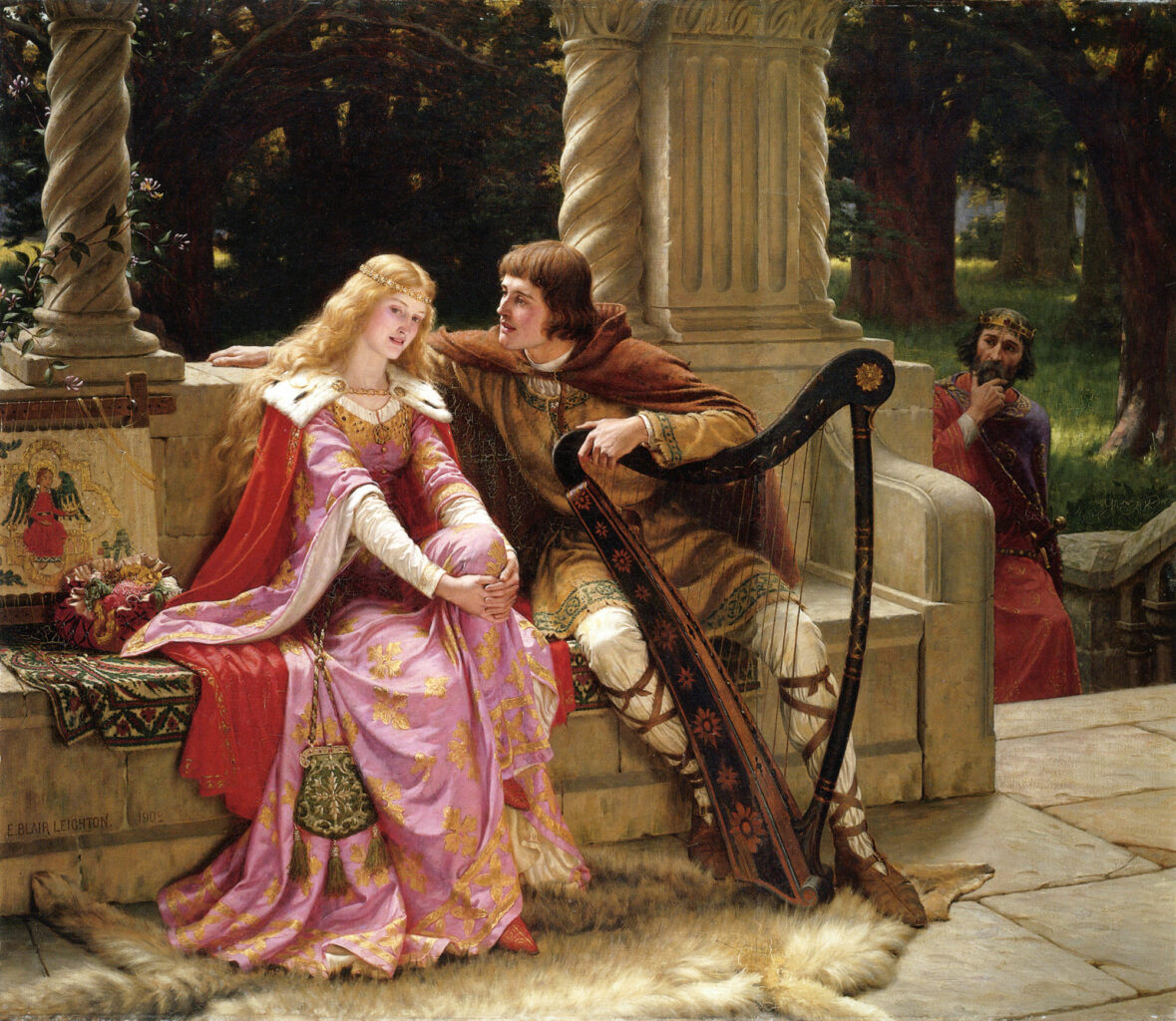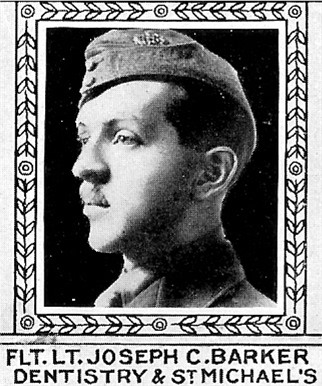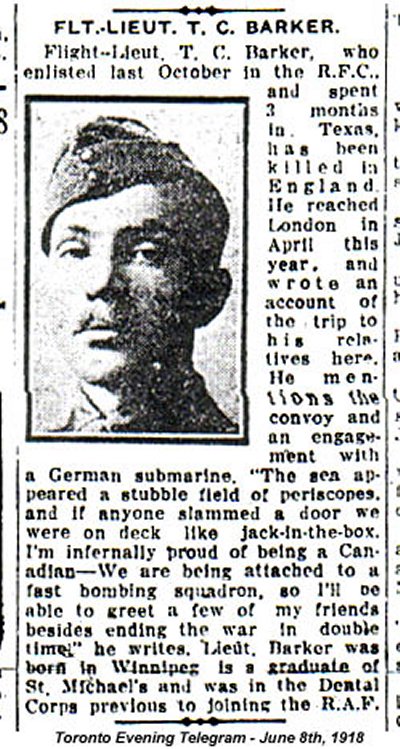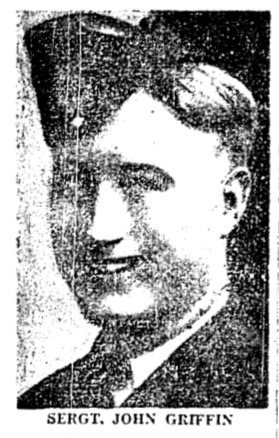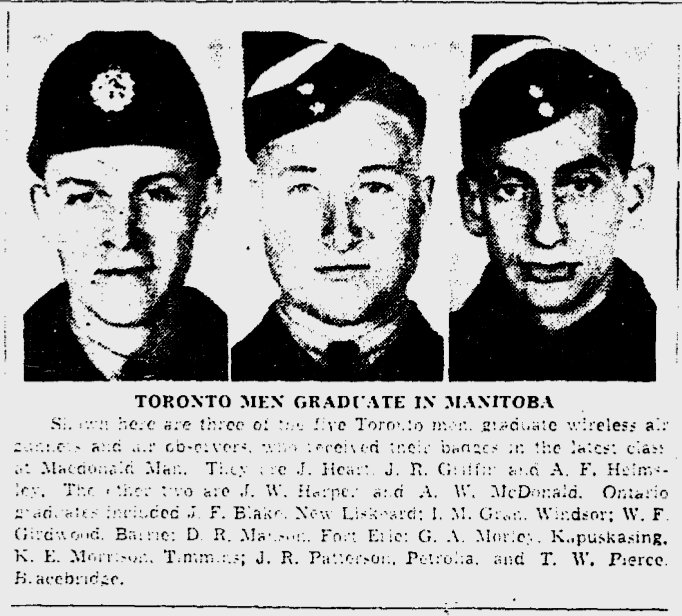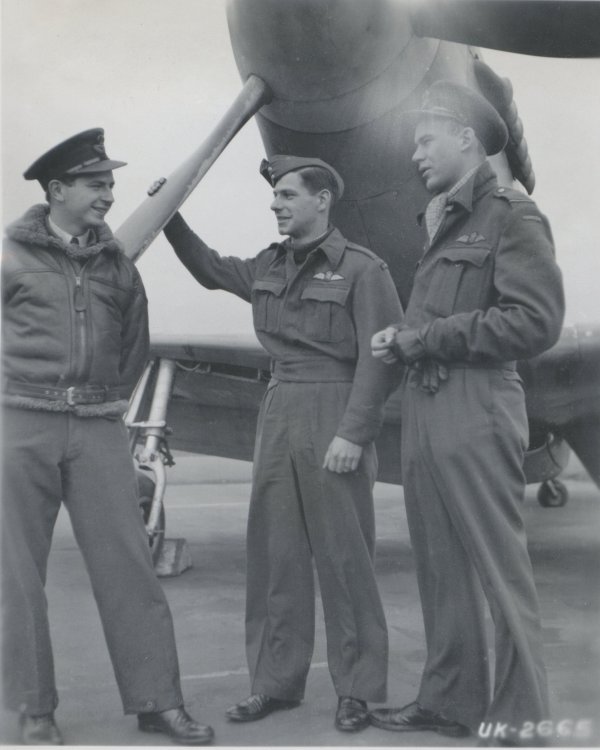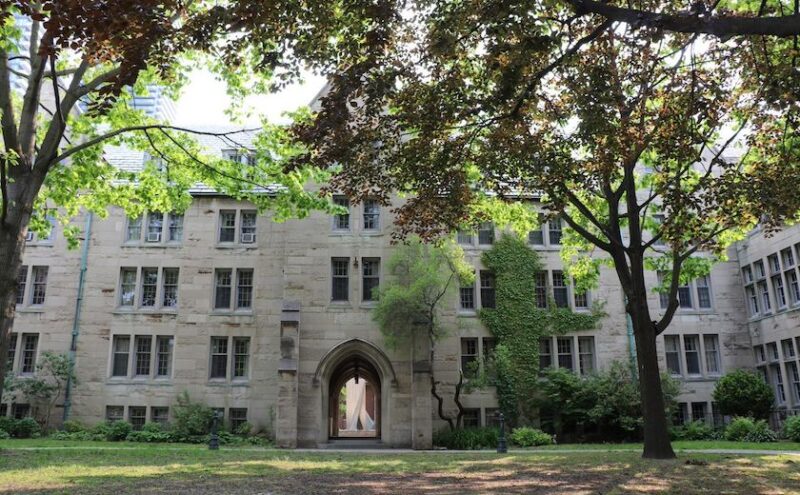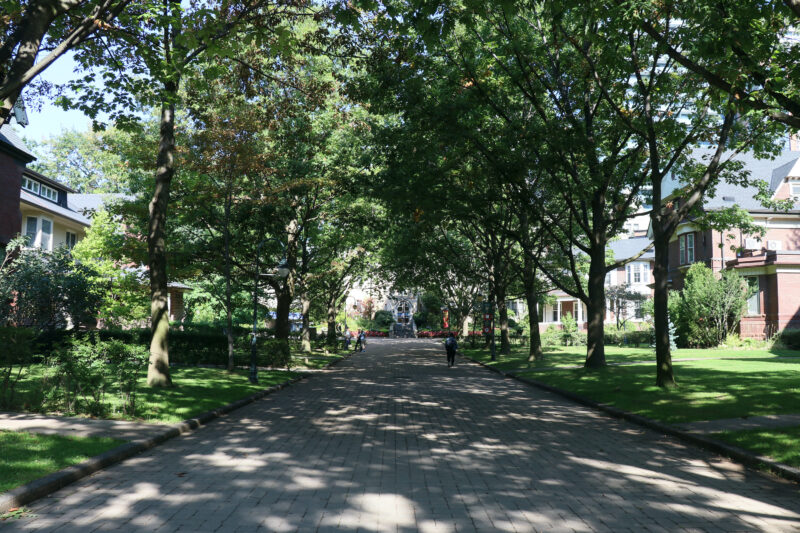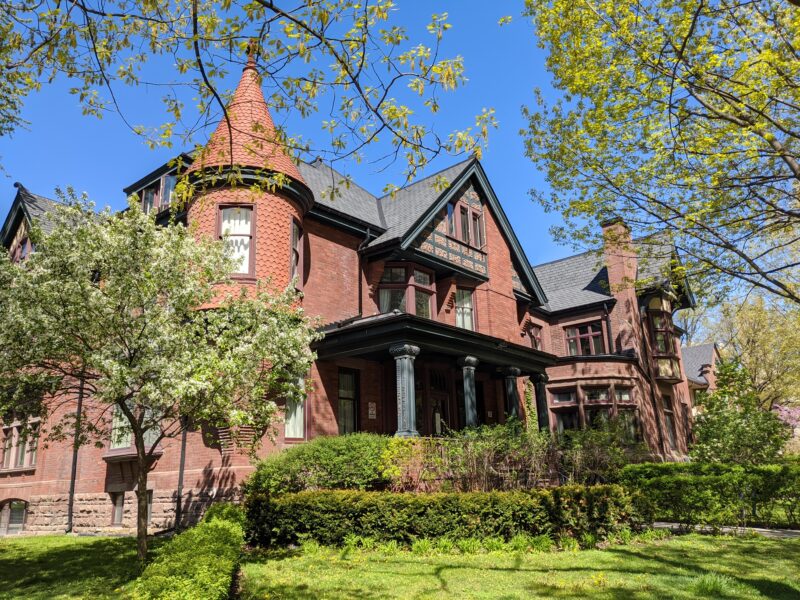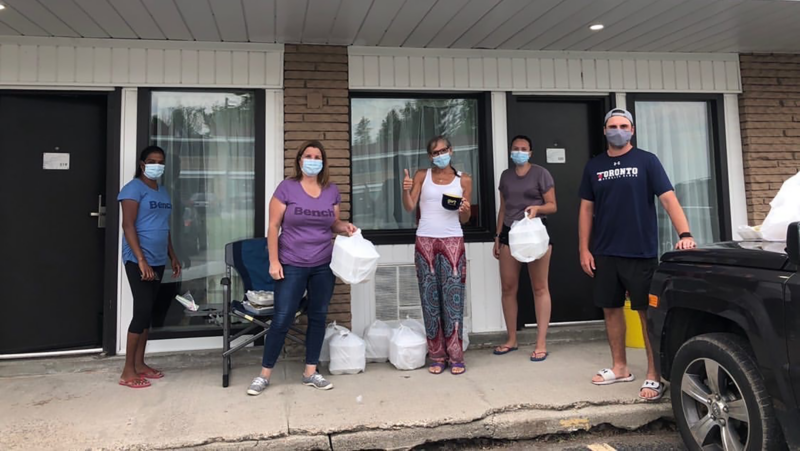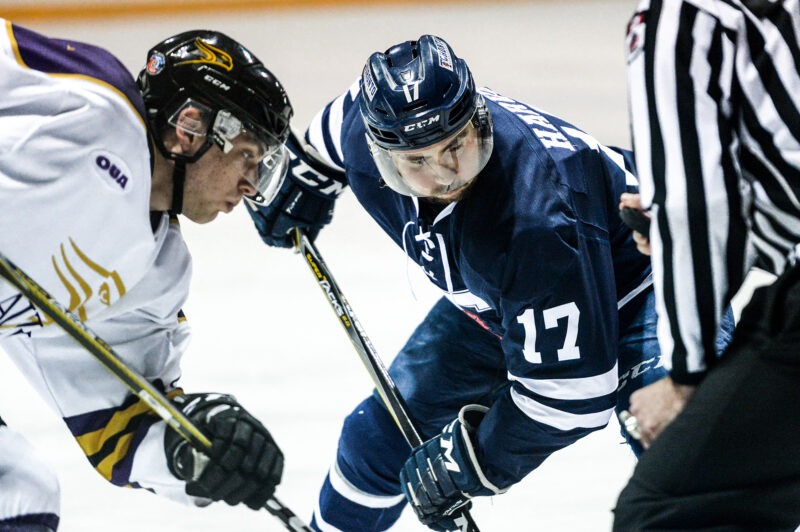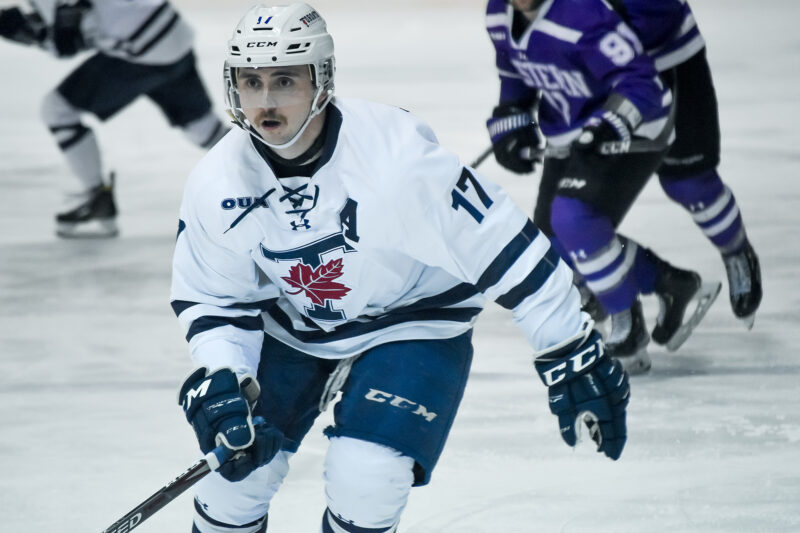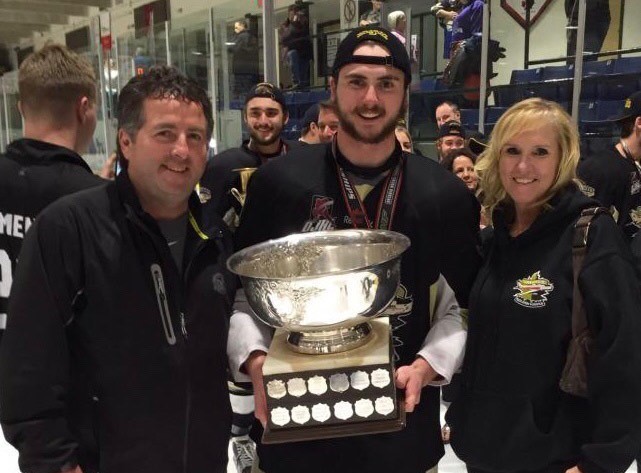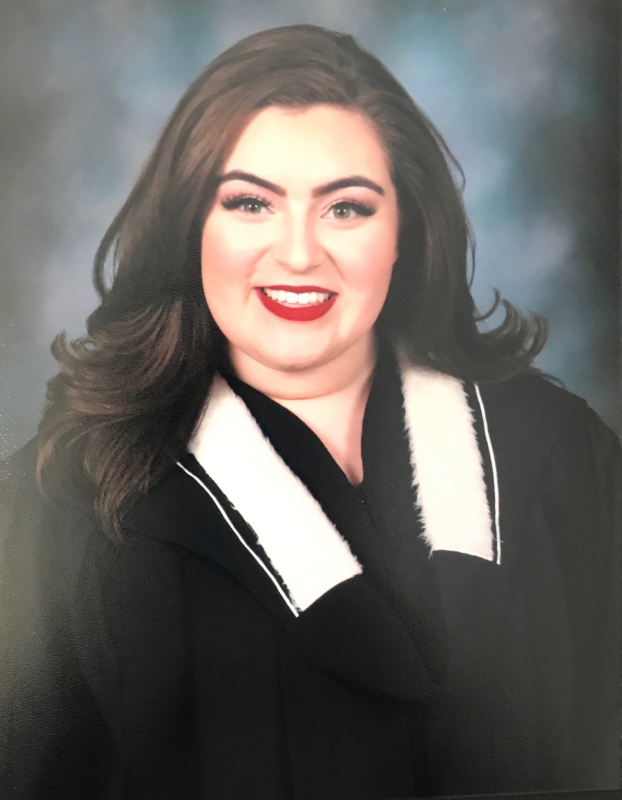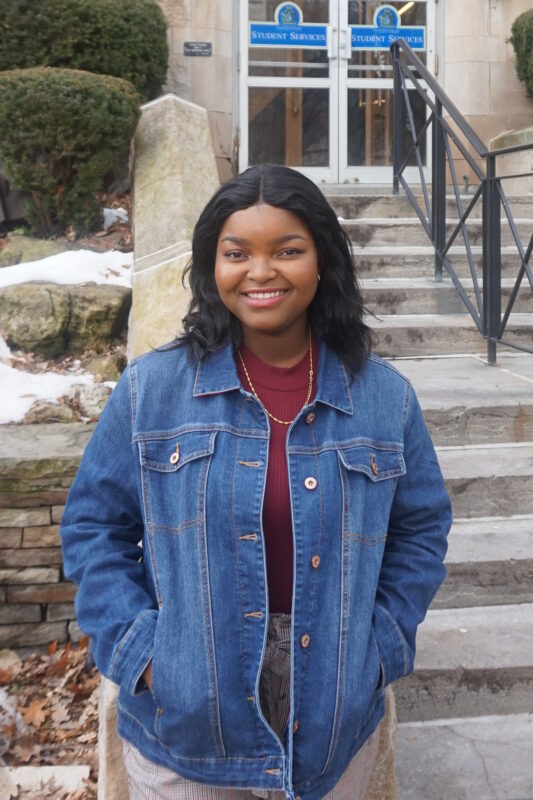Congratulations to graduating St. Michael’s student Kinsale Philip on being named a McCall MacBain Scholars Regional Award recipient. This award recognizes not only his stellar academic and athletic records, but also his perseverance and ability to overcome obstacles, as well as his volunteer and advocacy work.
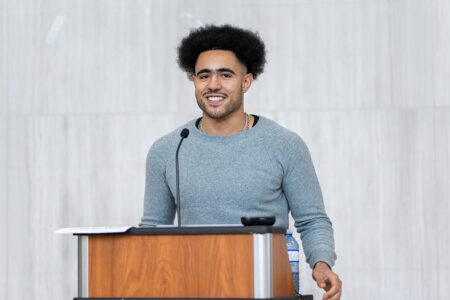
“Applying to the McCall MacBain Scholarship moved me. The experience was monumental, and I grew from it. I am so proud of everyone who applied, because doing so was vulnerable, and it took a lot of courage. Thank you to my references and to everyone who advised and supported me along the way,” says Kinsale.
Kinsale will be graduating from the University of Toronto this June with an Honours Bachelor of Arts degree, with a specialist in philosophy and minor in political science. As the first person in his family to go to university, he relied on multiple St. Michael’s scholarships for financial aid including the Richard Yee Memorial Bursary, the St. Michael’s College Grant, and the Lex Byrd Award.
Knowing he was interested in pursuing graduate studies, a friend suggested he apply for the McCall to MacBain Scholarship, which Kinsale describes as a Canadian version of Rhodes Scholarship. It is the largest leadership-based scholarships for master’s and professional studies in Canada; top recipients join a cohort at McGill University. The regional award will support Kinsale’s studies next year at the Peter A. Allard School of Law at the University of British Columbia.
“I knew my application was really competitive because I have worked so hard,” says Kinsale.

In the summer of 2023, he completed a placement at Dipchand LLP through the Avenue, an internship program offered by the Ontario Bar Association to help Black and/or Indigenous undergraduate students in Canada gain real-world experience in the legal industry. He boosted his legal experience by writing a post for the firm’s blog, an honour usually reserved for lawyers or articling students.
He balanced studies and work experience with playing for the Varsity Blues football team. He started playing quarterback and, when faced with a setback, successfully transitioned to defensive back, a feat rarely accomplished at the varsity level.
His application also cited his advocacy work, which stemmed from organizing a student petition in high school and led to canvassing and even mediating a youth panel for the BC Green Party, contributing a young person’s perspective to local politics.
He drew on his varied experiences throughout his application that included an intensive interview process. As part of the interview day, Kinsale spoke in front of industry leaders and had the opportunity to network with other award candidates and seek guidance from current McCall MacBain Scholars.
“It was important to make an impression, but all the interactions were very genuine. Being able to talk with the McCall McBain Scholars, who volunteered their time to come from Montreal to meet with us, was very valuable. I enjoyed chatting with them as they are some of the most exceptional people I’ve met. I was also able to ask their advice on how to approach the interview and they would tell us to be honest and relaxed,” said Kinsale.
Now on the west coast, Kinsale shows no signs of slowing down. As a law student at the University of British Columbia, he will dedicate his final year of U SPORTS eligibility playing for the Thunderbirds, the university’s football team.
As we head into the second day of the SMC Undergraduate Research Colloquium, here’s a look at Day One, which saw the first round of presentations challenging attendees to examine the world from new perspectives and open their eyes to new fields of study.
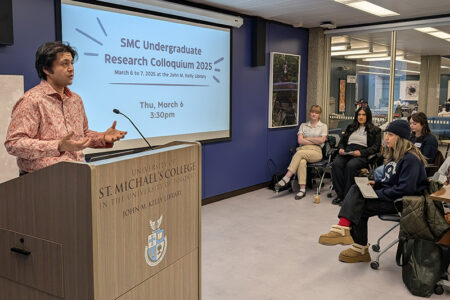
“We have a medley of research to see here today,” said Francesco Morriello, Assistant Professor of Book and Media Studies, in his introduction.
With this year’s large number of applicants, the Colloquium grew to a two-day event with multiple delivery formats including presentations, lightning talks, and poster presentations.
“We had applicants from all years of study representing all St. Michael’s programs and programs across the larger U of T community, which makes sense given St. Michael’s students are taking courses everywhere. I was particularly pleased to see students from all years of study apply. For younger students this is about joining an academic community and meeting people and for upper-year students, it’s a chance to show off their work and hone their skills,” said Chief Librarian of the John M. Kelly Library, James Roussain.
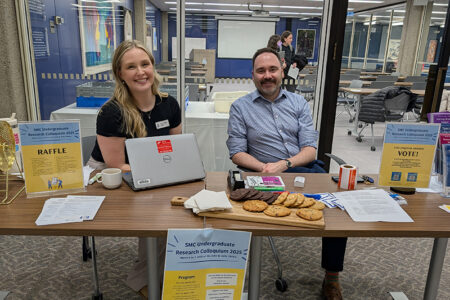
“Ultimately students are in it for all sorts of reasons, and I’m excited by that,” he said.
The colloquium began with two rounds of presentations by students from a range of disciplines including human biology, book and media studies, and economics.
“I’ve always been drawn to media studies and I’m in my third year of economics. I was looking for something that could like bridge the two,” says Taarini Saharan, who presented on ‘Understanding the Biz of Showbiz’, which argued that art has been diminished for economic gain. By examining her family members’ Netflix suggestions for what to watch next, she determined that greater market segmentation could be used to create better content while generating profits.
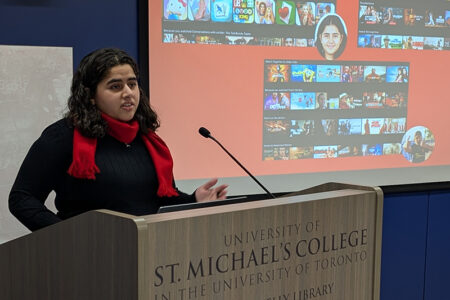
“Participating today was a little bit beyond my comfort zone, as I needed to face my fear of public speaking. Also, I’ve never independently conducted a research process. I’ve always done it with a group or under the supervision of a professor. I did it for the first time and accomplished a goal of mine,” she said.
Emma Ward’s presentation, ‘Etched in Time: The Lasting Impacts of the Phonograph in Irish-American Immigrant Communities’ examined how the record player has influenced today’s perceptions of Irish culture.
Afterwards, some participants exhibited their research through posters and spoke directly with attendees.
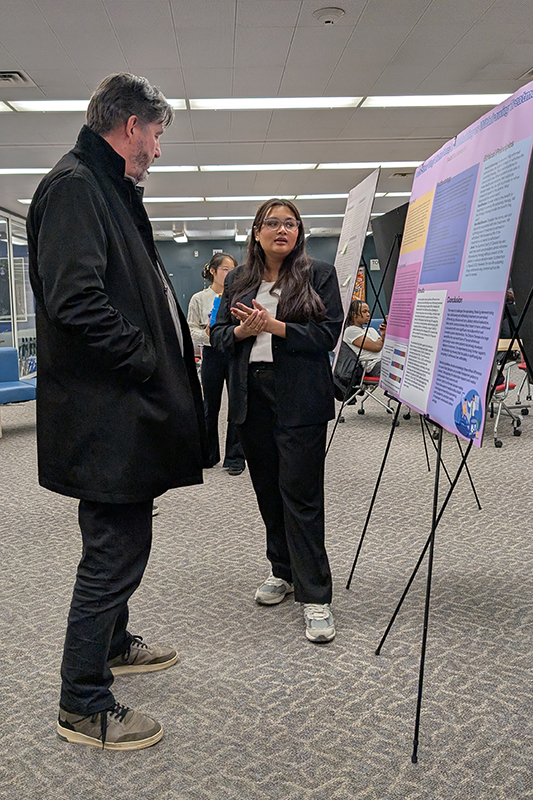
“My topic is bioethics-based and asks the question between withdrawing and withholding life-sustaining treatment from patients. The reason I was drawn to present on this was because I’m trying to speak out more about this issue,” says Farifta Rahman on her presentation titled ‘Death Either Way?- Withdrawal vs Withholding Treatment’.

All attendees are invited to vote in the “People’s Choice Award.” The winning presentation or poster will receive a $150 gift card to the campus bookstore.
The colloquium, taking place on the main floor of the Kelly Library, wraps up today, with event scheduled between 1:10 p.m. and 5:45 p.m.
Running club founder, podcaster and don are some of the outlets Elijah Gardner accesses to advocate for physical and mental well-being on campus. His own experiences at St. Mike’s have laid a solid foundation for him to draw upon when offering support.
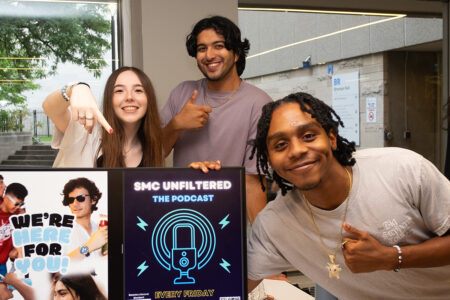
“I think my interests seem very random, but they all stem from my passion to advocate for mental health,” he says.
Elijah is in his third year of kinesiology and physical education at the University of Toronto. He joined the St. Michael’s community in the second semester of a challenging first year. In between adjusting to university life, balancing his coursework and part-time job with a long commute from Stouffville, his dad was diagnosed with cancer.
When a spot became available in Elmsley Hall in the winter term, Elijah moved in. In addition to cutting down on the time he spent commuting, he found a supportive community and a space where he could flourish. On campus, he sought out and found the supports and resources to help him adjust, including just down the hall. “My don was there for me during my first year for my wins and my losses,” he says.
His grades started to improve and when he took a class with Dr. Linda Trinh, whose area of research includes exercise oncology, he asked questions about her work. Using what he learned, he created a training regimen for his dad, who was undergoing cancer treatment. “Watching him get better through exercise alongside his treatment was really cool and it was possible in part due to me being at U of T and St. Mike’s,” he said.
“Academia can feel very cold and clinical. For me, it’s been important to find the reason I’m doing all these things. Being a part of a community like St. Mike’s has helped me to do better because I feel so connected to everyone,” he says.
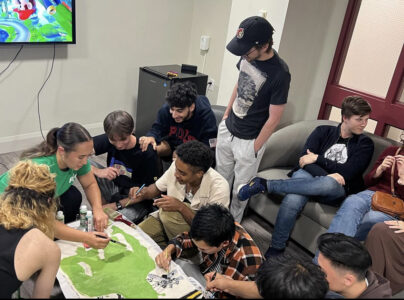
In his second year he was elected President of the Residence Council, where he fostered open communication among his fellow residence council members Jessica Chung, Madelaine Kukovica, Aishwarya Nandakumar, Isabella Renaud and Jennifer Zucchetti; advocated for student interests; acted as a liaison between the council and resident dons; and grew as a leader.
He gained a deeper appreciation for the college community through part-time work at St. Mike’s and the University of Toronto’s Faculty of Kinesiology and Physical Education. Over the summer he worked as a Front Desk Receptionist at St. Mike’s, Assistant Instructor for the dance and movement camps at Camp U of T, Equity Programming and Workshops Assistant at the University of Toronto’s Faculty of Kinesiology and Physical Education and a summer researcher under the supervision of Dr. Danielle Dobney.
In September, he became a Don at Sorbara Hall. “All these experiences have prepared me for the privilege of serving my residents. I hope to make their first-year experiences as transformative as mine was—through floor events, great conversation and plenty of laughter,” he says. “I like just being there for my residents and hearing about their day. Any little problem that comes up, they know they can just knock on my door.”
His open-door policy extends to the airwaves as the newest host of SMC Unfiltered, a podcast about life at St. Mike’s. Elijah, along with his co-hosts Arib Hassam and Stephanie Pagano, openly share their experiences with common student concerns, including burnout, mental health and the importance of social support. Elijah is also able to provide insights from his training and work experience as a Don and his role in the Director of Equity and Inclusivity Programming’s Office this year.
This year, he and his friends Giuseppe Carito, Sariha Dewan, Alina Janayeva and Jacob Godfrey Paraiso co-founded SMC Run Club. As a form of exercise with a low barrier to participate, almost anyone can join, and a special community has formed around the sport. Once again, Elijah shared knowledge he gained through his physical health courses by creating a workout program for members to do in between runs. He’s received feedback that his fellow runners continued doing the workout plan throughout exam season and that it helped with their studies by reducing brain fog.
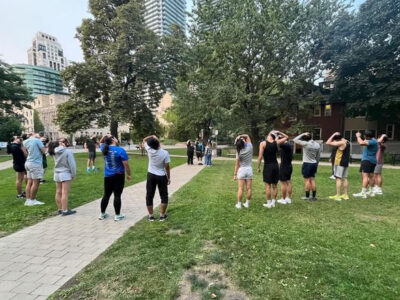
Through the Run Club, he’s also found a way to express his creativity. Using his graphic design, photography and video editing talents, he promotes the club on Instagram and its mission of fostering connection and wellness through the slogan “bringing SMC together, one step at a time”.
“I have been able to challenge and grow so many different aspects of myself. St. Mike’s has shown me that if you have an idea, St. Mike’s is the place to share it,” he says.
As the recipient of the St. Michael’s Faculty of Theology’s Governor General’s Gold Medal, Father Richard René attributes his strong academic standing to a profound passion for theology and its relevance for contemporary life.
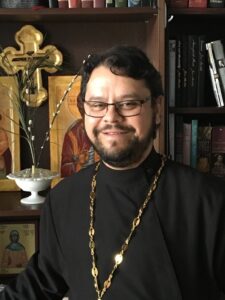
Father René holds a Bachelor of Arts and a Bachelor of Education from the University of British Columbia, as well as a Master of Divinity from St. Vladimir’s Orthodox Theological Seminary. While these degrees supported his vocation as a priest in the Archdiocese of Canada of the Orthodox Church in America, his decision to pursue a doctorate was, above all, a pursuit of personal passion.
By completing his Doctor of Philosophy in Theological Studies, Father René has surmounted his personal “Mount Everest.” His convocation represents his moment on the summit, along with his beloved wife, Jaime, daughter Lily, and granddaughter Hazel, who will be joining him to celebrate this achievement.
His thesis was inspired by his work in a prison setting. In 2014, he became a federal correctional chaplain for Correctional Service Canada (CSC) at Kent Maximum Security Institution in British Columbia. He describes his experiences at Kent as “traumatizing, transformative, and sometimes both at once. Even as I witnessed violence and bloodshed—in the sacred space of the chapel itself—I also encountered moments of profound wisdom, beauty, and dignity in the words and actions of the offenders I served.”
As a result of his work, Father René sought to explore the question, “How do changes for the good as well as for the bad take place within the human person?” His dissertation presents a constructive Orthodox theology that engages with the recent philosophical reappraisal of vulnerability’s role in human flourishing. This work offers a theoretical framework rooted in his Eastern Orthodox faith and pastoral experiences.
Father René was drawn to St. Michael’s because of the Metropolitan Andrey Sheptytsky Institute of Eastern Christian Studies (MASI), where he found what he calls “a community within a community.” He benefited from an environment where scholars from his tradition could engage in fruitful and respectful ecumenical dialogue with those from Western traditions. He expresses deep gratitude for the guidance of his supervisors, Fr. Peter Galadza, retired director of MASI, who encourage him in his first year, as well as Prof. Jaroslav Skira, who guided him through the proposal, research, writing, and oral defense stages of the program.
Going forward, Father René will continue his work with CSC as Regional Chaplain overseeing chaplaincy services in British Columbia. He will also continue his work as director of St. Silas Orthodox Prison Ministry, which was established in 2016 to connect Orthodox Christian inmates across Canada with local Orthodox communities. This ministry began when an inmate wrote to Father René, requesting baptism into the Orthodox Church, which led to the first Orthodox baptism in a Canadian federal prison, with many more following. The ministry continues to provide inmates with Bibles, books, icons, and prayer ropes and offers liturgical services and sacraments, including baptism, unction, and confession.
Father René will also continue his academic pursuits as an independent scholar. He currently has two scholarly articles in development, and his thesis has been accepted for publication by Fordham University Press in the next two years.
As an Orientation Leader, Rahul Gopeesingh was eager to lead the next class of St. Michael’s students in the Hoikety Choik. But his enthusiasm for his college runs deeper than its legendary cheer. He hoped to instill in first-year students a sense of St. Michael’s community, which he gained for himself through his involvement in intramural sports.
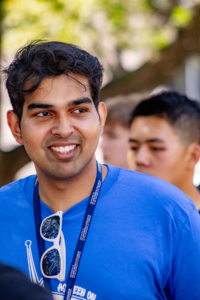
Now in his final year, majoring in mathematical applications in economics and finance, Rahul decided to kick off his final year by serving as an Orientation Leader to make up for missing his own. He came to U of T in 2021 when there were still COVID lockdowns and assumed orientation would be offered exclusively online. Later he learned that he missed out on an “epic” week.
Rahul is an international student from Trinidad and Tobago and was unable to visit the different college campus before deciding which one he would like to attend. Instead, he researched the different colleges online and chose St. Michael’s based on a Reddit post that described St. Mike’s as very accepting.
“Coming to university can make you feel so alone and it’s a problem that many people have where academically they’re doing fine, but mentally they’re out of it because they underestimated how much as humans we need to be connected,” he says.
Looking to meet people and pursue his interests, he joined St. Mike’s intramural soccer team. He brought his laid-back nature to the sport where he appreciated the similar non-competitive spirt of his teammates.
He remembers one year when he was playing the final game of the season and St. Mike’s team was getting pummeled. “The other team didn’t have enough players, and they were still beating us!” he remembers. “They were beating us so badly that they passed the ball to me, basically letting me score, only the goalkeeper stood in my way, and I still missed”. He was delighted to turn around and find that rather than being disappointed, his teammates were cheering and laughing.
“Even when we were losing, everyone was in it together. It was a fun atmosphere,” he says.
“I always thought St. Mike’s was similar to U of T where you’re like a drop in the ocean and you can walk by a thousand people in a day and not know any of them. It can make you feel small. Once I became involved a bit I could walk into the COOP and see someone I know, have some fun and share a laugh. St. Mike’s provided a community that I feel connected to, and I don’t want to take it for granted,” he says.
Having learned the importance of having a community, he wanted to introduce first-year students to the warm and welcoming St. Michael’s community as an Orientation Leader.
He remembers how the orientees were really shy at first and he felt it was his role to break the ice. Understanding that they may be feeling out of place, he would check in with those he thought needed it. By the end of the week, he knew his job was done when his orientation group was making jokes and hanging out on their own. “They didn’t even want me there anymore as I was like their leader or boss. It was heartwarming to see their progress,” he says.
As he embarks on his final year, he’s trying to find a balance between his career ambitions for after graduation and staying connected to the amazing people he’s met. For now, he’s looking forward to another season of intramural soccer.
Pursue romance and live in an interesting city were some of the factors St. Mike’s professors suggested students thinking about grad school should consider when deciding what to do after graduation.
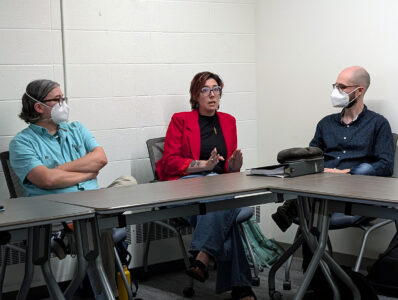
“After graduating from U of T, you can go on to do anything,” career educator Jon Bray told St. Michael’s students as part of a workshop he led on ‘Navigating Decisions About Grad School’ on October 1 in Brennan Hall. “When there are so many options available to you, choosing just one option can be hard,” he continued.
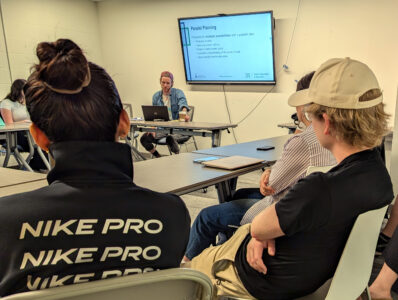
The workshop was a part of Grad Week hosted by the Office of the Dean of Students and the Registrar’s Office. It is designed to support students in their decisions to pursue further education.
In this workshop, Bray acknowledged that as students approach graduation, they may be apprehensive about what comes next, whether it’s a job search, career exploration or grad school.
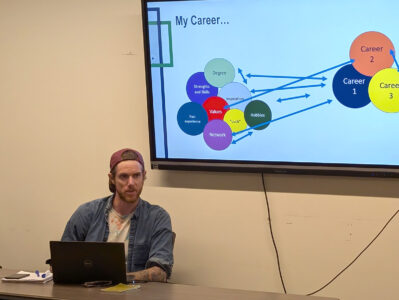
Throughout his presentation he stressed that there are no right or wrong decisions and rarely one path. Students can expect to change careers and that there will be factors outside of their control that will impact their lives. Instead, he suggested students plan for “planned happenstance”, which is to treat unexpected situations as an opportunity for growth and self exploration.
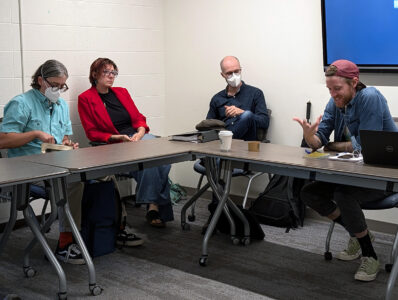
His presentation was followed by a panel discussion where St. Mike’s Professors Iris J. Gildea, Felan Parker and Jean-Olivier Richard talked candidly about their own experiences following graduation.
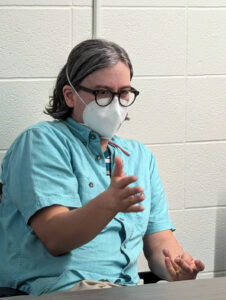
Prof. Parker shared how he turned down an opportunity to go to Cambridge University in favour of pursuing a Master’s degree at Carleton University for a multitude of reasons, one of which was that he had just started dating the woman who would become his wife.
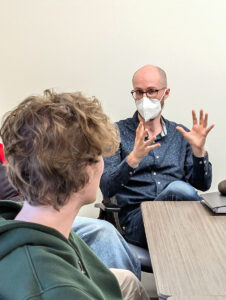
The panel discussion contained practical advice when it came to applying to grad school, such as how to ask for letters of reference, what to include in a personal statement and where to look for funding.
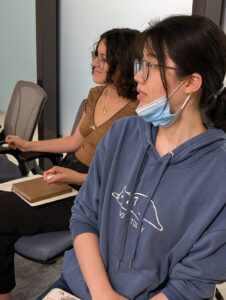
Overall, the professors encouraged students to be their authentic selves, follow their passions, be open to new experiences and not to be afraid to change your mind.
“Ultimately, school is school, and a job is a job; it doesn’t define you,” said Prof. Parker.
Bray concluded the panel by asking each of the professors what made them confident in their decisions.
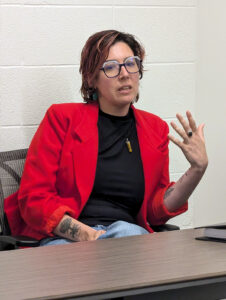
“Follow your intuition and follow what you’re called to do but allow yourself some self-doubt and know that it means you’re growing,” said Prof. Gildea.
When applying to the University of Toronto, Dacian Dawes was unfamiliar with U of T’s college system. She started by researching her options and was initially drawn to St. Michael’s for its Catholic values. Having grown up in a religious family, she thought St. Mike’s would provide a similar structure to her post-secondary education.
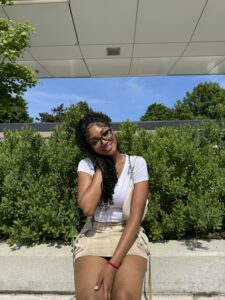
She also talked to people she knew who had attended St. Mike’s and their reviews were all similar. She repeatedly heard that at St. Mike’s, you’re more than just a number. They also mentioned that it’s known for being accepting of everyone and valuing diversity. The more she learned about her college, the surer she felt in her decision. Her arrival on campus reaffirmed that.
In her first year, courses were a hybrid of online and in person due to the pandemic. During the few times she came to campus she took the time to explore her college and find where she felt comfortable.
“I loved coming downtown and finding new spots,” she says. Among her favourite spots on campus are the Kelly Library, Mike’s Cafe in Brennan Hall, and the COOP.
Religious belonging and diversity played a role in the extra-curriculars she’s joined as well. She’s found her place in two student organizations: U of T’s Black Student’s Association and Power to Change (P2C), a Christian student ministry. As P2C’s prayer coordinator, she helps organize prayer events in the city, and many of the attendees are international students.
“I really like talking with international students and hearing about their journeys to understand their insights and perspectives,” she says.
Remembering the joy of discovering her new favourite places, she tries to bring this experience to the events she organizes. “I create events at different places in Toronto so newcomers can get used to exploring the city,” she says.
As she enters her fourth year, she’s on track to graduate with a Bachelor of Arts degree with a double major in political science and critical equity and solidary and a minor in African studies. With the help of St. Michael’s registrar’s office, she’s solidified her plans. “They sat down with me and broke down what was needed for my degree to make sure I’m on the right path to graduate. They really went above and beyond,” she says.
In advance of graduate school applications this year, she secured a co-op placement over the summer at the Ministry of Transportation, where she works in the policies department reviewing documents to see which policies need to be revised.
As she prepares for life after graduation, she wants to mirror the values she’s witnessed at St. Mike’s in her life.
“Being open-minded and welcoming to everyone have become a part of my character and I want to keep these qualities with me,” she says.
More Convocation 2024:
Grad Para Babuharan on Finding His Community
Grad Vanessa Choi on Paying it Forward
Grad Patrick Elo on Crossing the Finish Line
Grad Patrick Policicchio on Research, Connection and Belonging
Grad Anita Rajkumar on Giving Back to her Community
A day of service brought 90 high school students to St. Mike’s campus to gain an understanding of what it truly means to serve. Grade 11 and 12 students from nine high schools in the Toronto Catholic District School Board answered the call to be a part of the ‘A Catholic Call to Service’. The day, led by the St. Michael’s Campus Ministry team, was designed to show high school students how small acts of service can make a big difference.
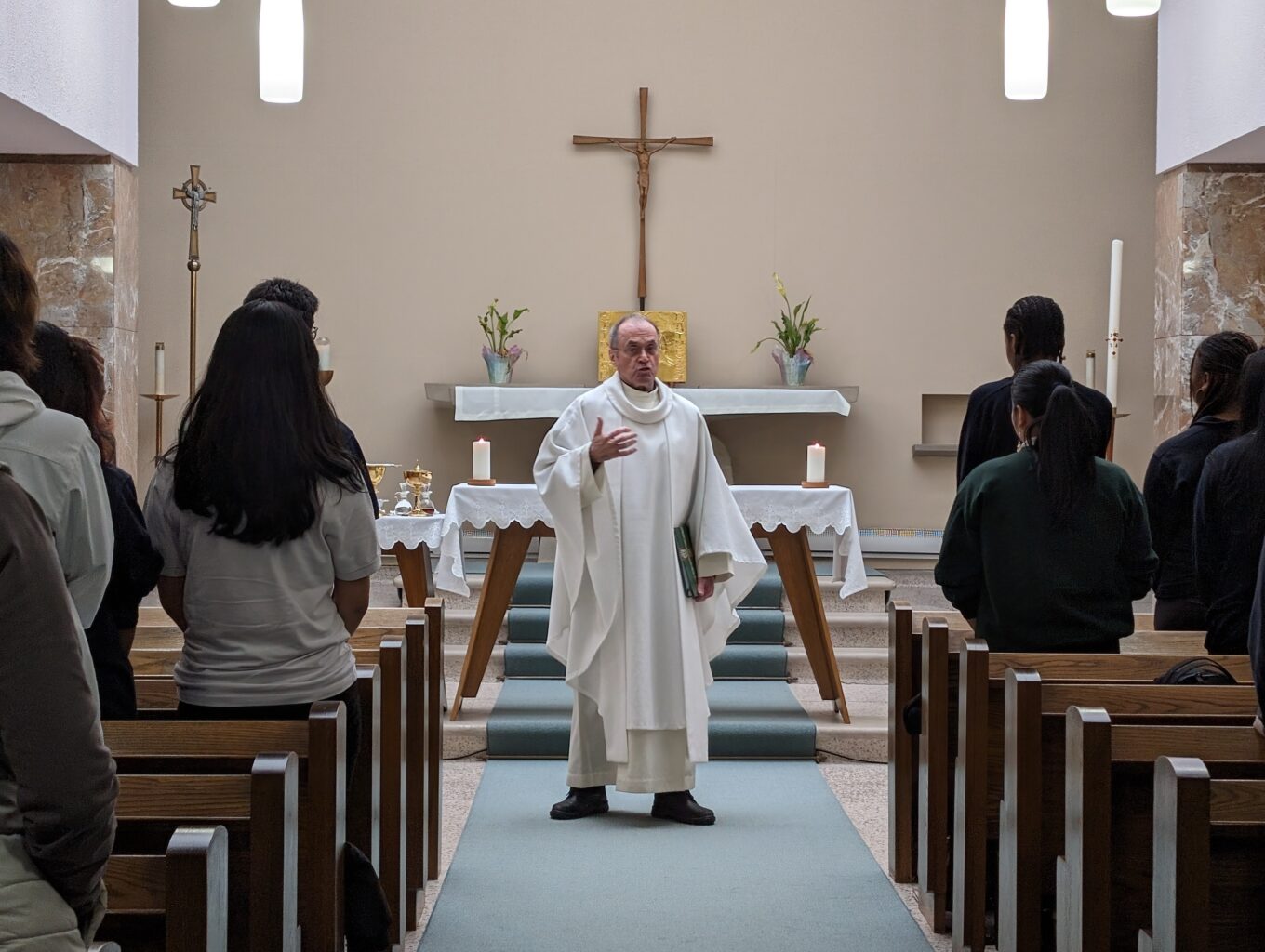
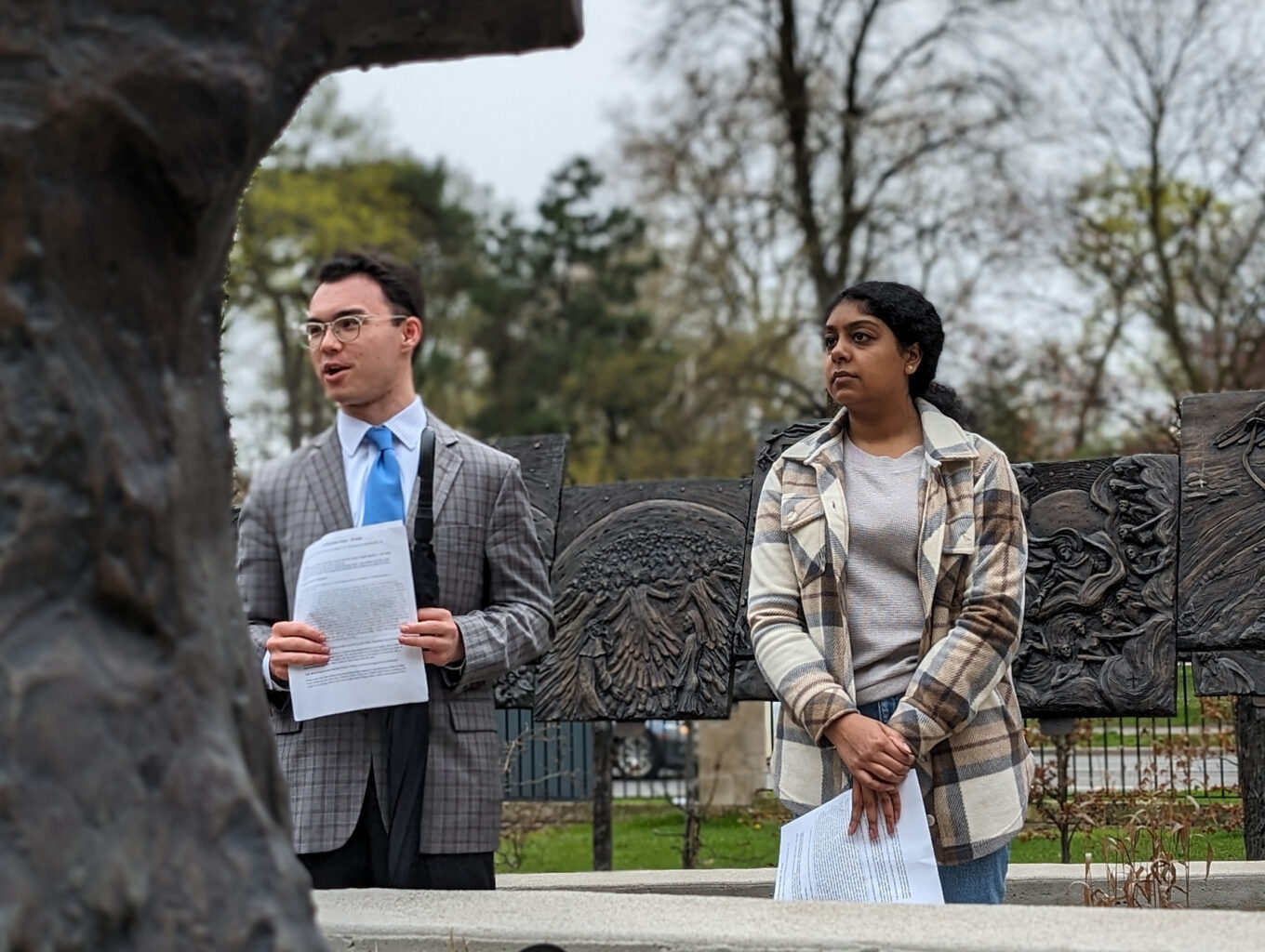
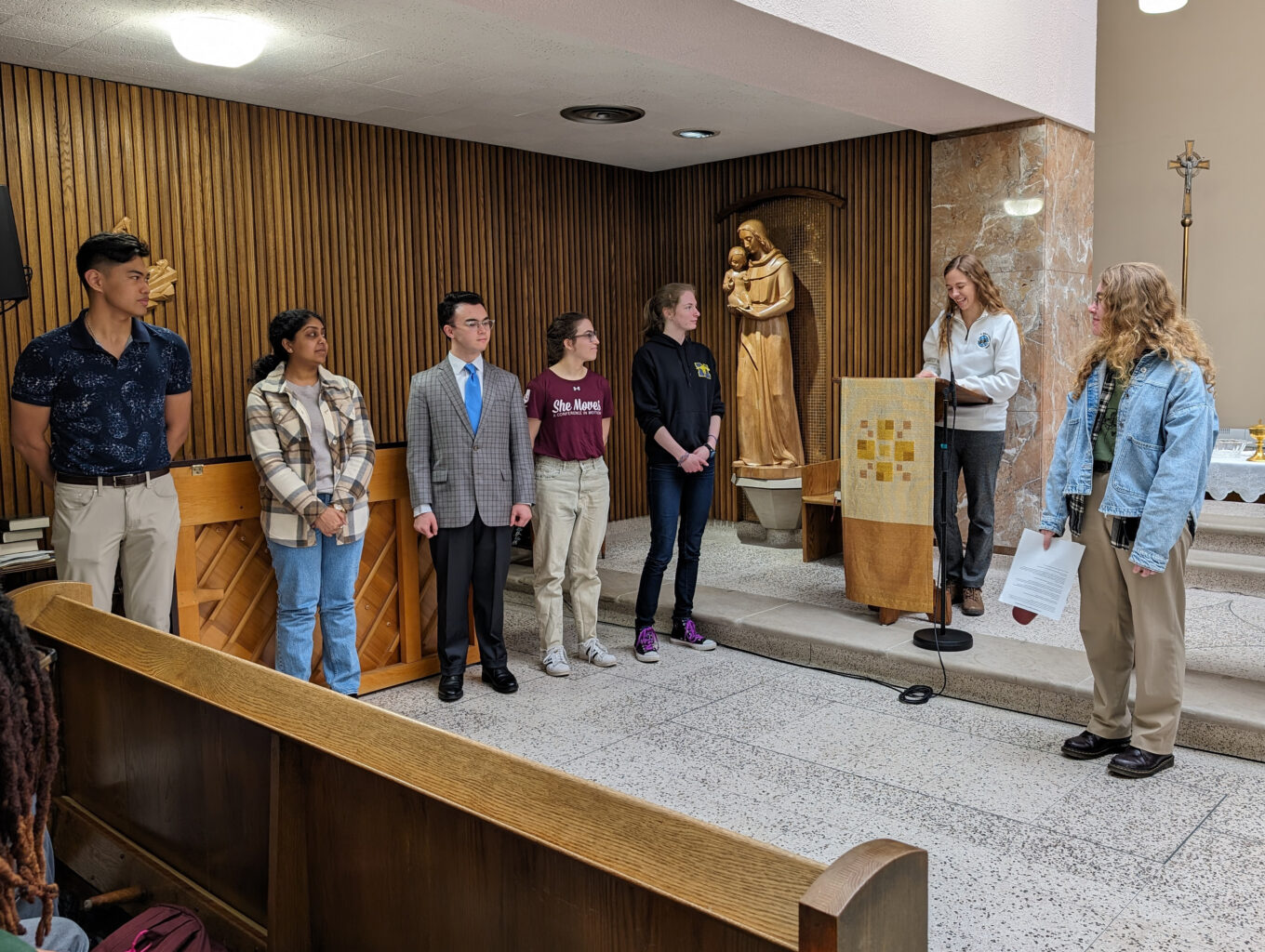
“The stops at the Timothy Schultz pieces provided a nice opportunity to reflect on what we’re doing here today,” said Lisa Malcolm, who organized the day through her work at the Catholic Teachers’ Centre at the school board’s Nurturing Our Catholic Communities.
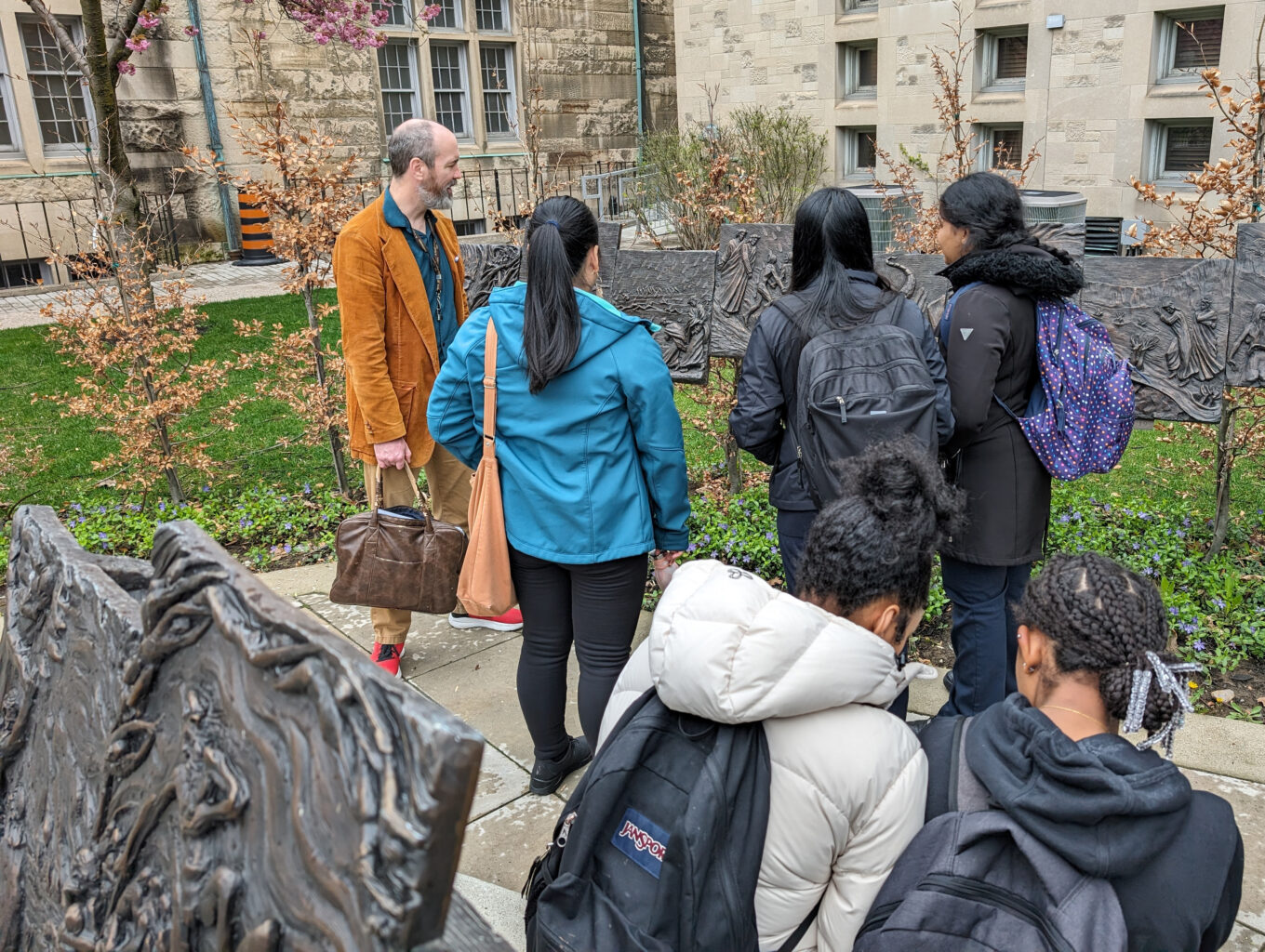
“We had a good response to Let the Oppressed Go Free because there are lot of details that the students were pulling out like a child bride or a child holding a gun. At one point we asked the group, ‘Where are they pointing to?’ And one of the teachers said, ‘Well the government buildings are right there. They are kind of reaching to the government buildings.’ That was interesting for me as it’s like the work is asking ‘What can the government do about these issues?'” said Lydia Dillenbeck, a campus ministry volunteer who is going into her third year with a double major in music and sociology.
The high school students also assembled sandwiches that were packed into paper bags to be distributed to those in need.
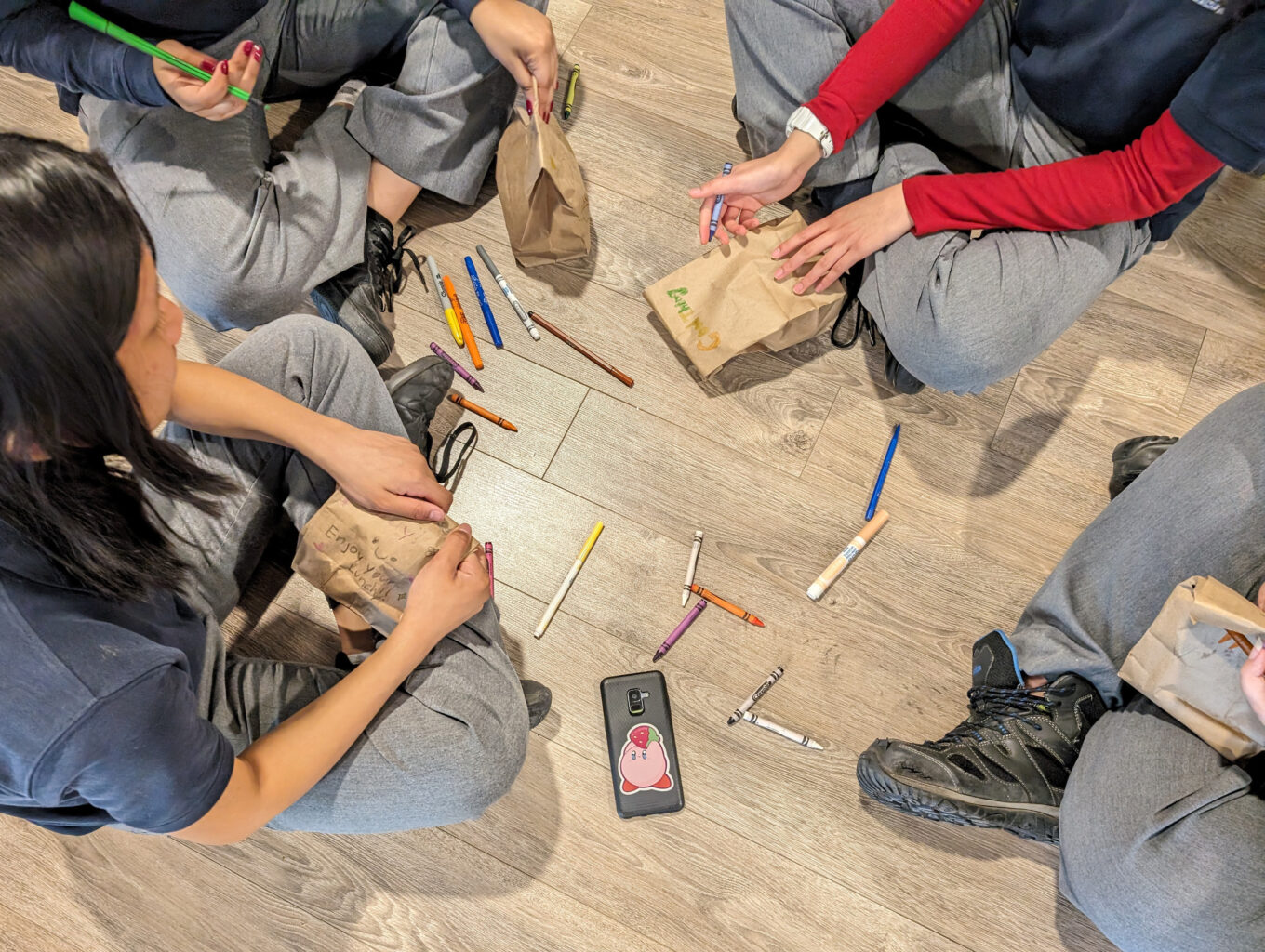
“Something I was reflecting on today as I saw teenagers volunteer to come out today was that this wasn’t something I did in high school. Now being in university and being more involved, I’m seeing the value in it. It’s inspiring that these students see the value so early,” said Bridget Bowles, who will be entering her third year and majoring in English with minors in Christianity & Culture and Mediaeval Studies
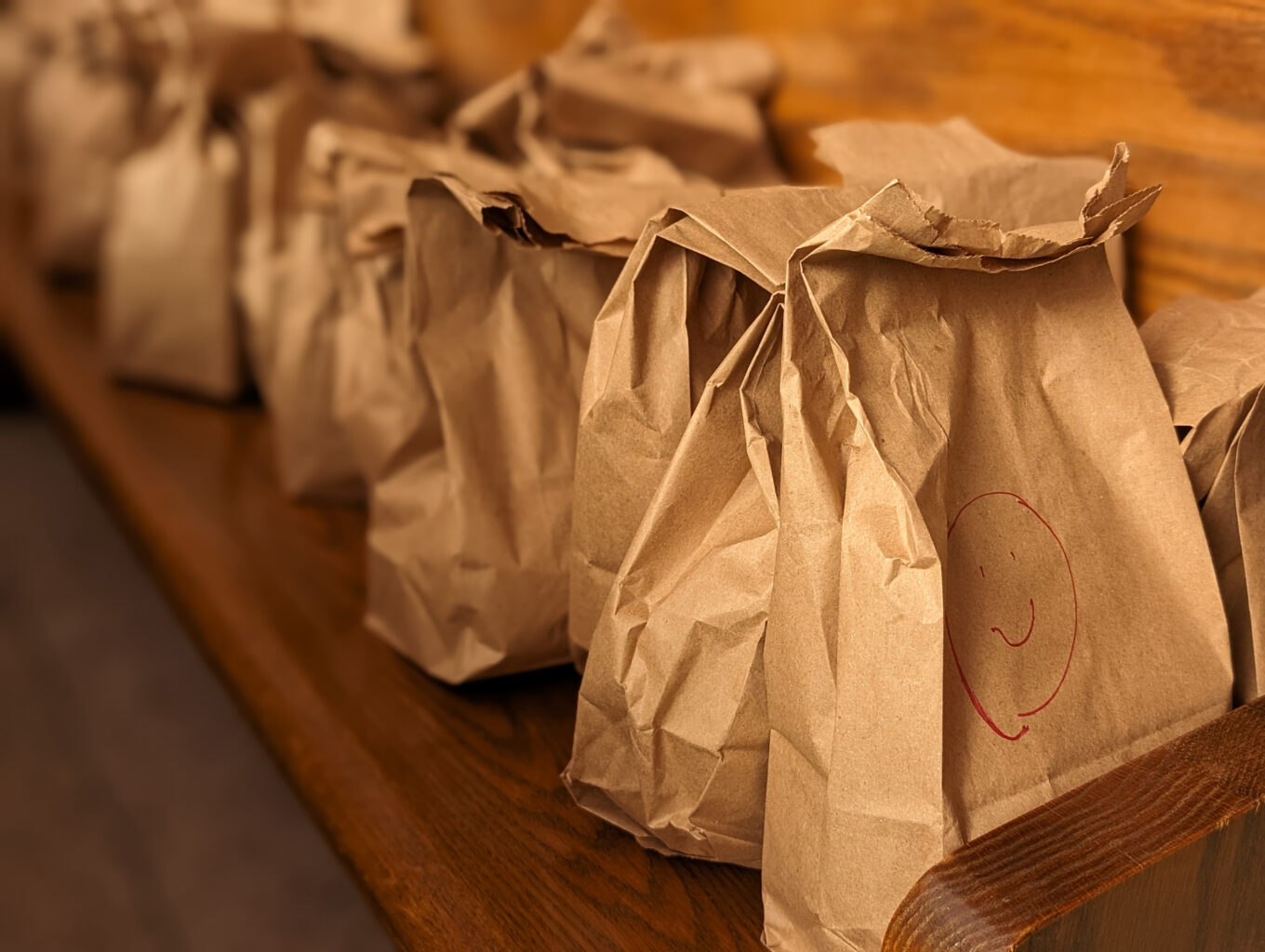
For two religious sisters, discovering how to link their concern for the environment with their religious calling meant returning to the classroom. Inspired by Laudato Si’, the encyclical on the care for the environment promulgated by Pope Francis in 2015, Sister MaryAnne Francalanza, FCJ and Sister Benedicta Lim, OSB arrived in Toronto from England and Korea respectively in September 2023 as eco-missionaries for their religious communities. Studying at the Regis St. Michael’s Faculty of Theology, (RSM) and particularly within its Elliott Allen Institute for Theology and Ecology (EAITE), has given them a community, hope, and the tools to champion change that they will take back home.
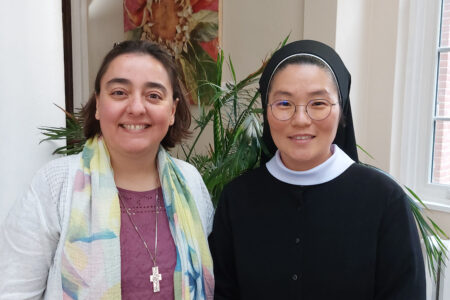
“Science gives us the facts and can help with finding technological solutions, but what needs to be done in order to live in harmony with the Earth and all God’s creatures is change hearts, and that’s in the realm of faith,” says Sister MaryAnne, who had spent 17 years teaching math at a secondary school in Liverpool, England.
She is here for one-year post graduate diploma at the EAITE. As a Faithful Companion of Jesus, she left her teaching position in 2022 to complete her tertianship, a year away from active ministry to deepen her understanding of the FCJ life and charism. In addition to her teaching, Sister MaryAnne describes herself as an “eco-warrior” in her school. She was known to take simple actions like encouraging the students not to waste resources; working with a team of senior students to campaign for meat-free Mondays in the school canteen; and including care for the Earth in prayers and the liturgy. During her year of reflection, she realized she was being called to pursue this passion more purposefully.
The release of Pope Francis’ Laudato Si’ in 2015 compelled the Congregation to make care for our planet one of its priorities at its 2019 General Chapter. This year of study supports that priority.
She has enjoyed being able to take courses at RSM, as well as at Trinity College and Emmanuel College, which are also members of the Toronto School of Theology, a consortium of seven theological schools, affiliated with the University of Toronto.
“There’s a cross pollination with people of other denominations, and even of other faiths. In these classes, whenever ecology, climate change or creation is brought up, students want to talk about it and they all bring different lenses to the material,” she says.
When Sister MaryAnne returns to England in the fall, she will be taking back knowledge, ideas, and experiences that she hopes to share in parishes and schools. “I want to build on the good work that other people have already done,” she says.
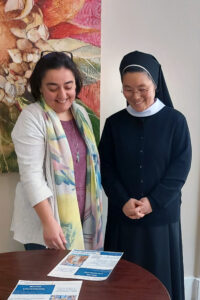
Sister Benedicta is a member of the Olivetan Benedictine Sisters of Busan in South Korea. Her Congregation joined the Laudato Si’ seven-year action plan and that was the occasion for the Council to send someone to study eco-theology. Sister Benedicta’s Mother Superior requested that she study eco-theology specifically at RSM because the program is internationally recognized and known to the community, as two priests they know had returned after earning their doctorate degrees from RSM.
The Olivetan Benedictine Sisters of Busan are called to do whatever work is needed by the Church and this charism includes working directly with the Earth, so some of their ministries involve farming. Through her studies, Sister Benedicta has come to realize that her community demonstrates concern for the environment through all its ministries, and especially its work with the marginalized. As she gains an eco-theological perspective, she realizes how eco-issues disproportionately affect the poor and disadvantaged.
“Pope Francis sees the poor usually as having the cry of nature. When nature is harmed, people, usually the marginalized, are also being hurt and that’s what eco-theology uncovers. I hope to have their voices be heard,” says Sister Benedicta.
Prior to coming to Toronto, Sister Benedicta had been involved in her community’s parish ministry. She is now in her first year of a Master of Theological Studies degree at RSM, while also earning a certificate in theology and ecology from the EAITE.
While it may have been her community that sent her to study, she wants to apply what she is learning to her life of service. “Ecological theology is not something to study and be done with. It’s something that I must carry until the end in my life,” she says. She thinks her education will give her the confidence to speak up more about environmental issues and have a bigger impact on decision making.
“It has absolutely been wonderful to have Sr. Benedicta and Sr. MaryAnne as part of our community. They have brought their unique interest in eco-spirituality and have enriched our conversations on eco-theology with their passion for and commitment to eco-justice,” says EAITE director Prof. Hilda Koster.
The EAITE oversees a certificate and diploma in ecological theology at RSM. Founded in 1991, it is one of the oldest institutes to offer ecological theology programs, and the only Catholic institute in North America to do so.
Recently, St. Mike’s student Camila Justino heard a lecturer advise students not to “leave part of yourself at the door,” urging them to engage in as many opportunities and experiences as possible. As a mother and a mature student balancing family life and school with forging a new life in Canada, the message resonated with her.
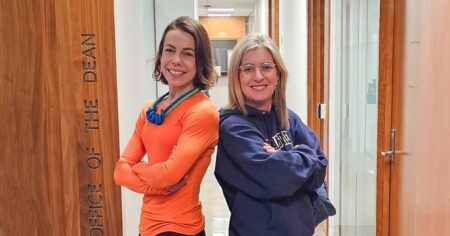
When Justino saw an ad for the Dean for a Day just days later, she sat down and wrote an application essay, outlining some of the issues she would tackle if she were Dean. Her words were convincing, as she won the opportunity to trade places for a day with Prof. Melanie Woodin, Dean of the Faculty of Arts & Science, and get an inside look at the world of administration at the University of Toronto.
“I think one of the things that set apart my 500-word essay for the contest is my constant curiosity and questions about the ways we live,” Justino explains. “The main suggestion I had also came from a place of anguish in an expensive city, with increasing rates of homelessness and unemployment. It can be difficult to transition from being an undergraduate to becoming a professional able to pay all the basic expenses. My essay questioned the pressure we students might face and asked U of T to have a career centre that considers the unique circumstances of underrepresented groups of students.”
The Dean for a Day experience began at Woodin’s office in Sidney Smith Hall on St. George St., where Justino also met some of the Dean’s staff who briefed her on her agenda. Then she was whisked off to the Experiential Learning Commons (ELC), a place she deemed “fascinating” for its work on everything from hosting career workshops on topics such as interviewing through to connecting students with potential employers.
From there it was over to Simcoe Hall to meet with Prof. Sandy Welsh, Vice-Provost, Students, and then a short walk to meet with Hart House Warden David Kim.
Finally, it was back to Sid Smith for some office time, followed by a meeting with the Arts & Science Student Union (ASSU) executive in the Dean’s conference room.
When asked to describe a high point of the day, Justino laughed and said, “All of it!” She followed up, though, but stressing how meaningful it was for her to encounter women in senior administration.
However, the most inspiring part of the day, she says, was participating in the final meeting with the ASSU, which organized the contest with the Dean’s office to raise funds for food banks on campus.
“Watching the union of students ask to lower the fees of deferred exams and their willingness to defend rights for students and make important changes definitely made me proud of being a student,” Justino says.
Camila, a Book & Media Studies major with minors in Celtic Studies and Mediaeval Studies, is poised to graduate this spring. As she ponders whether to move on to graduate school or seek a career based on her gift for writing (she earned an earlier degree in literature before emigrating from her native Brazil) she says it was “inspiring to see women taking the lead.” She was particularly impressed, she notes, by Woodin’s status as a scientist.
As Justino familiarized herself with the western side of the U of T campus, Dean Woodin’s time at St. Mike’s included a visit to the Pontifical Institute for Medieval Studies, the John M. Kelly Library, and a brief stop in Odette Hall to say hello to St. Mike’s Principal, Irene Morra.
“The Dean for a Day fundraiser has become one of the highlights of my year,” says Woodin. “I really enjoyed switching places with Camila and connecting with the students, faculty, and staff of St. Michael’s College, while she filled in for me and provided our team with invaluable insights and perspectives about the student experience. This day truly brought back fond memories of my time as an undergraduate student at U of T.”
As the academic year draws to a close, Justino is looking forward to her next moves while expressing her affection for her soon-to-be alma mater.
“University opened the door for me (in Canada), including helping me to learn English,” she says. “I got great support from the Kelly Library and have special affection for Kelly. St. Mike’s is my home.”
From using a sack of potatoes as a visual aid to making cultural references to works as disparate as Plato’s Republic and television’s Desperate Housewives, the recent St. Michael’s College Research Colloquium was as entertaining as it was informative.
The annual event, held this year on March 23, showcases the research and presentation skills of students studying at St. Michael’s. The event mirrors the experience of an academic conference, where students write and submit an abstract as part of the application process and then present their research to an audience, field questions from attendees, and receive feedback from faculty respondents.
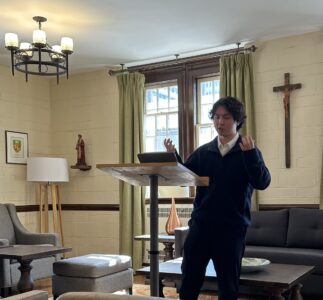
“The purpose of the event is to encourage fruitful collaboration between the student population and St. Mike’s faculty and fellows,” says Dr. Bernadette Guthrie, Interim Director of the Junior Fellows Program and organizer of the day.
“The Colloquium affords undergraduate students the opportunity to present their work publicly to members of the larger academic community. This experience also offers an invaluable experience for those students planning to pursue graduate studies.”
The day-long colloquium, which saw participation from five faculty members, featured two student panels that addressed the theme of “Labour, Leisure, and the Good Life”. In the morning panel on “GenderLeisure/Gendered Labour,” Elinor Egan (a double major in Christianity & Culture and Slavic Languages and Culture), presented on “‘Women’s Work’ through the Lens of the Christian Imagination”, while Cinema Studies major Brian Tin shared his paper, “Let’s Talk Cooking: Gendered Marketing for the Nintendo DS and User-fying Women Gamers.”
The afternoon session saw three papers presented on the theme of “The Work of Art, the Work of God, and the Work of Contemplation.” English Literature major Bridget Bowles spoke on “Withstanding the Loss of Beauty and Dignity: Bede, Caedmon, and the Labour of Poetry in Early Modern England; Mediaeval Studies major Para Babuharan offered a paper titled “Opus Dei: Worship and Work in the Rule of St. Benedict”; and Hoda Sadek, currently studying Political Science, Philosophy and History, delivered a paper titled “Enlightenment: The Importance of Outward Contemplation for a Good Life.”
St. Michael’s Junior Fellows also played a role in the day, developing this year’s theme and helping draft the language of the Call for Papers. They adjudicated the submissions, grouped the papers into panels, and helped locate respondents. Two junior fellows, Dang Pham and Joseph Dattilo, served as moderators for the student panels.
For Tin, whose research focussed on gendered video game marketing, “the colloquium could not have been timelier.” He had learned about the event from his independent project supervisor, Prof. Felan Parker. Noting that his goal had always been to publish or present his work somewhere, he took the 40-page independent study project and focused on two sections, creating a new, shorter paper for the event.
“The version I presented at the colloquium was a mixture of two parts (out of the total seven) of the original paper. …Writing a version for the colloquium did make me think about and articulate my arguments more carefully.”
The day began with a keynote address – “Irish Lumpers: Appetite and Political Economy Before the Great Famine”—delivered by Prof. Padraic Scanlon, an associate professor in the University of Toronto’s Centre for Industrial Relations and Human Resources and the Centre for Diaspora & Transnational Studies. Scanlon, who is a Senior Fellow at St. Michael’s, gave a lively talk in which he used a sack of potatoes to challenge figures and stereotypes about the pre-famine Irish.
The day concluded with a faculty roundtable on Labour and Leisure in the Intellectual Life.
“I hope students come away from the event with a sense of confidence in their own role as budding scholars and in their ability to develop and refine their ideas through the process of conversation and critique,” says Guthrie. “I also hope that the Colloquium served as a site of intellectual friendship, one that afforded students the opportunity to forge connections with faculty and fellows beyond the classroom.”
Recently, the Campus Ministry team got together to reflect on Holy Week. We are grateful for their input. Thanks, too, to Campus Ministry Coordinator Nicole Ferrante for bringing those thoughts together.
Holy Week is one of the most important periods in the Christian calendar, concluding the forty-day season of Lent, and preparing Christians for the approaching celebration of Easter. At our March 18th meeting, the St. Mike’s Campus Ministry team sat down together and had an open conversation about Holy Week, with the hopes of gathering some thoughts to share with the St. Mike’s community.
Students were asked several questions to get the ideas flowing. Hopefully there will be something in their answers to inspire you as we enter into this important time.
Why is Holy Week important? What makes it special?
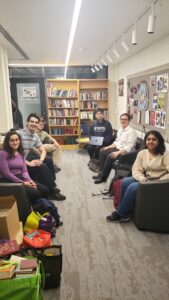
“I love Holy Week. I think Holy Week is awesome. I think it’s nicer than Christmas because there is much less capitalist gift buying and stuff.“-Marc-André Veselovsky SJ (Retreats and Faith Formation).
During Holy Week we remember the passion, death, and resurrection of our Lord. To re-“member” does not only mean to recall in our mind. It means to relive, to recreate. To place ourselves back into the story, and to live those final days alongside Jesus. We experience the self-giving love of Holy Thursday, the grief of Good Friday, and the emptiness of Holy Saturday, only to be filled with the fullness of joy and life as we enter the resurrection of Easter Sunday.
“I think it is [also] to remind us that in our daily life we carry our own crosses, and to remind us that there is resurrection after death, so whatever suffering we are going through, there is resurrection.” – Semira Abdella (Interfaith and Social Outreach Coordinator).
Placing ourselves in the Easter story also means coming with our reality, with the burdens we carry, with what we are doing, seeing, and experiencing, and letting the life of Christ speak hope and comfort into those places.
Is there a particular part of Holy week that you find most meaningful, or that you are most looking forward to?
“The mass I look forward to in Holy week is Good Friday. For Ethiopian Catholics [like myself] it’s not like a typical mass… it’s a 12-hour service starting from 6 am to 6pm, so it’s very interesting. People fast the whole day.” – Semira.
Holy week is an important time for all Catholics, as well as many other Christian denominations. The way in which it is observed, however, can differ depending on the church or cultural community that one is part of. Glimpses into the Holy Week celebrations that happen worldwide are a beautiful example of the unity and diversity that the Church is fortunate to foster.
“I’m going to see my friend get baptized at the Easter Vigil. So that’s very exciting… I don’t think I’ve ever had someone I know be baptized as an adult” – Justus Croskery (Catholic Faith Formation Coordinator).
Something that not everyone realizes about Lent and Holy Week is that it is an incredibly important time of preparation for those desiring to enter the Catholic Church. The Easter Vigil Mass on Holy Saturday is the time when all adults seeking the sacraments of Baptism, First Communion, and Confirmation are welcomed fully into the Catholic community, after having journeyed through many months of spiritual formation.
“The liturgies are the best liturgies of the year.” – Marc-André.
Holy Week liturgies are rich with meaning and emotion. They are extremely embodied, incorporating rituals such as the waving of palms, the washing of the feet, and the veneration of the Cross. The Easter Vigil makes use of powerful symbols like fire and water and plays to the senses of sight and sound as we journey from a somber darkness into a joyous light.
“I think my favourite part would be the Easter Vigil mass. Lent is a good time to recall that we weren’t made for this world, and to see our own brokenness especially. And then with the Easter Vigil comes a really full joy – a joy because Christ satisfies the hunger that we have that none of the things that we are giving up can touch.” – Noah Stong (Catholic Faith Formation Coordinator).
The joy of the Easter Vigil Mass is palpable. As the Mass ends, we as a Church move from a season of fasting and penitence, to a season of joy and celebration.
Are there any encouragements, challenges, or words of inspiration that you would like to offer your St. Mike’s community this Holy Week?
“I guess just that we all have our own sufferings to bear, especially during the close of the semester. And I think it’s the perfect opportunity to take them and to just offer them up to Jesus and see him suffering on the cross especially prominently during Good Friday. I think it’s a good time to take a bigger-picture look at things and be like “yeah I have my own crosses… and Jesus did so much more for me.” I’m just so grateful. He’s going to give me strength.” – Justus.
“I hope that students can try to connect more with their faith by attending the different masses that occur. Just kind of step out of their academics for that one week to reflect upon the sufferings that Jesus went through for us.”. – Anita Rajkumar (Interfaith and Social Outreach Coordinator).
For those interested in participating in Holy Week liturgies here on campus, consider attending some of the following services, all taking place at St. Basil’s:
Saturday March 23rd, 6:30pm – St. Mike’s Campus Ministry Palm Sunday Mass
Wednesday March 27th, 7:00 pm – Tenebrae Service
Thursday March 28th, 7:00pm – Holy Thursday Mass
*Consider registering for our Holy Thursday Travelling Adoration event, from 5pm-Midnight, beginning with dinner and mass, and ending with a pilgrimage to seven churches around the city. Click here to register.
Friday March 29th, 3:00pm – Good Friday Service
Saturday March 30th, 8:00pm – Easter Vigil Mass
Sunday March 31st, 9:00am, 10:30am, and 12:00pm – Easter Sunday Mass
The St. Mike’s Campus Ministry team wishes a blessed and fruitful Holy Week to all!
Read other InsightOut posts.
In 2022, Dorothy Lee travelled abroad from South Korea to Canada to study at the University of Toronto. As a second-year student, she is pursuing criminology and computer science majors. This year, I have been a part of the University of Toronto Korean Association (UTKSA) and the SMC Campus Ministry Snack Outreach Program. Throughout the semesters, she has planned academic and leisure events for Korean students and prepared snacks for the elderly and homeless people.
My passion for volunteering is rooted in my parents’ upbringings and a Christian environment. Growing up, I witnessed my parents’ dedication to helping those in need, such as participating in charity walks and delivering Christmas presents to orphans. Their efforts advised me to have love and compassion for the needy. The Christian schools and churches I attended preached and demonstrated the love of Christ by arranging numerous fundraisers and volunteer activities. I was privileged to learn from the doers of the Word. As a result, I transformed into someone who had a heart for anyone in need, empowered by the certainty to follow through on the caring intentions.

I started my journey of independent volunteering with a fundamental question about my own worth. As a high school student, I found myself grappling with the search for my strengths, those distinctive qualities that set me apart. It was through this introspection that I uncovered what truly made me unique: an unwavering passion to enact positive change in the world around me. While some of my peers tended to “go with the flow” or were passive to avoid potential conflicts, I felt driven to be proactive in making a difference. Reflecting on questions of personal value and purpose, I came to realize the inherent power I held to instigate positive change within my community, whether it be through initiatives at my school or involvement at the local youth centre. Since then, I have devised and engaged in various service projects from cleaning gyms to fundraising.
Diverse community service experience aided me in setting a principle to continually assess my capabilities before signing up to participate. Understanding the extent of what I can do assists in avoiding danger and refractory things as well as providing assistance effectively. This mindset has enabled me to approach volunteering with a sense of responsibility for others and self-care.
The preceding principle has also helped me navigate through the volunteer opportunities at U of T. Transitioning to university, academic pressures such as obtaining required grades for programs limited my time for volunteering. I had less time to devote to the community because I had to pick myself up and keep going. Therefore, I opted for activities with less time commitment, such as SMC Alumni’s Santa’s Helper and Campus Cleanup.
At the beginning of my second year, I applied to join St. Michael’s Campus Ministry snack outreach team. Initially, I felt nervous because it was my first time assisting adults who had more life experience than me. My previous works focused on youths and students, so serving the elderly was new to me. The possibility of interacting with homeless individuals also concerned me as I witnessed some unexpected situations involving them on the streets. However, as I began attending the sessions, my fears gradually dissipated, replaced by a sense of joy and calmness.
Attendance wasn’t mandatory, but I found myself drawn to join every week. Under the guidance of Hilda, our beloved cook and organizer, along with Anita and Semira, the SMC campus ministry leaders, volunteers like me were warmly welcomed and supported. There were no set milestones we needed to reach, so we could solely focus on helping people who visit to enjoy their snack/meal time as comfortably as they could. Talking and cooperating with fellow volunteers was fun and intriguing as we shared our distinct life stories. This activity became not only a commitment but also a refuge—a friendly space where all that was required was a loving heart and the willingness to serve.
Participating in serving came with another benefit. The program pushed me beyond my comfort zone, facilitating interactions with individuals from diverse backgrounds. It broadened my horizons of community service, fostered a greater sense of acceptance, and forged meaningful connections with others. It also expanded my awareness of the challenges faced by marginalized individuals and the importance of accessibility in meeting their needs.
Volunteering has been a spiritually growing and mentally fulfilling experience for me. Based on my journey, I encourage everyone to take a step over the sidelines and walk into engaging in acts of care and compassion. It will make a difference, no matter how small, in yourself and in the world.
Read other InsightOut posts.
Students entrepreneurs and siblings Sydnie and Malik Pottinger, each with St. Mike’s roots, are about to make history at the University of Toronto by becoming the first students to partner with the University of Toronto’s Trademark Licensing program to create a capsule collection with their clothing brand MOTUS. Sydnie, a third-year St. Mike’s student, and Malik, a fifth-year kinesiology student, will see their MOTUS line of fashion wear, complete with the university U of T and Leaf logos, go on sale at The Bookstore’s St. George location in March. Items for sale will include a varsity jacket, sweatsuits, beanies, soccer jerseys and t-shirts.

Bringing this dream to fruition has really been a family affair, with encouragement from their parents, and input and assistance from their younger sister, Calille, who, together with her siblings, is also a partner in MOTUS.
The siblings, whose university years have included a stint with Malik playing basketball and Sydnie, volleyball, began to put their heads together during the pandemic to consider creating a line of comfortable fashion pieces with lots of style. They launched MOTUS in January 2023, taking on everything from designing various pieces of clothing through to arranging manufacturing and shipping items themselves. The three even created their own logo.
“MOTUS is Latin for motion and it fits us as we always have one foot ahead, and it signifies always progressing and elevating,” explains Malik, who spent his first year at U of T in residence at St. Mike’s, which he says offered him a sense of home on a big downtown campus.
After their launch, business soon began to boom for the e-commerce-based brand, and Malik and Sydnie began making regular trips from their small warehouse to the post office to mail out orders.
Soon, notes Sydnie, they met their first benchmark of success: seeing someone on the street wearing their clothes.
“Success is your brand being recognized,” she says.
With that in mind, they began to think of how to create a bricks-and-mortar presence and pondered whether they could reach an arrangement to sell their items in the U of T Bookstore, a logical spot for two U of T students.
“We brought up the idea to our parents. They encouraged us and said, ‘The worst that can happen is that the bookstore says no,” Sydnie recalls.

Soon, they were in contact with the University’s Trademark Licensing office, where they were introduced to the manager of the program, Ivan Canete. Prior to Trademark and Licensing, Canete had worked with the Varsity Blues Intercollegiate Athletics department in marketing and commerce, where he managed the Under Armour portfolio for the Sport & Rec programs. Together, they discussed how U of T branding and logos could be integrated into a collaborative MOTUS x UofT collection, with the Bookstore not only stocking their items but investing in initial inventory and connecting with resources such as the Black Entrepreneurs Network.
“We haven’t done a lot of this before,” Canete says of the collaboration, noting that only recently have other big brands begun to create collaborative clothing collections with U of T.
Describing the arrangement as part of the Bookstore’s “evolution”, Canete says that since Bookstore royalties are poured back into student experience, partnering with students is “such a great answer.”
“U of T is pioneering this kind of thinking and is developing a model for other schools to follow,” he says.
“It’s a great feeling to know that something that my sisters and I created in our parents’ living room is going to help other people,” says Malik, who is set to graduate from the Faculty of Kinesiology and Physical Education this year.
“We are the first students to collaborate with the University’s Trademark Licensing Program and it’s really nice to see (our products) among big names likes Roots (and OVO and Peace Collective).”
He plans to spend at least his first year post-graduation focussed on building the business. Sydnie, who still has two years of school and a busy sideline coaching volleyball, will continue as well to make a full-time commitment.
One of the next goals for MOTUS is to produce leather goods, says Malik, who has been doing research into suppliers in Portugal.
“We are already developing an assortment of items of this category for our brand. We’d like to go nation-wide. We are so grateful for U of T’s backing,” he says.
His words of advice for student coming up behind him is to not let their studies box them into one thing.
“Just take everything you learned from U of T and apply it in whatever direction you want to take in your life,” says Malik. “My first two years at KPE provided me with a great foundation and perspective to figure out what I like. That structure, combined with playing on the Varsity basketball team in the first two years of my studies, provided me with discipline and routine that comes in handy today.”
Catherine Mulroney is a double alumna of the University of St. Michael’s College and now serves as the
university’s Editorial Manager. She is almost ready to begin describing herself as a lifetime learner.
I’ve said it before and now I’m saying it again: I’m heading back to school.
Come the fall I’ll be working part-time on a Master of Theology (ThM) degree at the Regis St. Michael’s Faculty of Theology and I couldn’t be more delighted.
The first time I returned to school was 2004. I had four children at home, a busy freelance career, a full volunteer calendar, and a husband often described as a happy workaholic. Adding school into the mix was perhaps the most counter-intuitive thing I’d ever done.
My mother had died the year before and her death had given rise in me to many deep questions about life, as well as some surprising insights into my own beliefs. This was all so out of character that I felt called to do something about it. I decided I needed to study, without a clue as to what to expect. I assumed I’d get some questions answered, put in my time to earn another degree, and then return to my regularly scheduled life. My experience, however, was anything but.
Accepted into the Master of Theological Studies (MTS) program at St. Michael’s Faculty of Theology, I registered for two courses in the fall semester. Just weeks after my return, though, the occasional indicators of dementia my father had been manifesting turned into a full-blown crisis. Suddenly, school was not just something I did but a place where, for four hours a week, I could escape some inescapable pressures and responsibility, pouring myself into courses that at once allowed me to disconnect while also offering insights into how to handle my father’s illness. Weekly liturgies in the gorgeous Basilian Centre chapel offered respite and a way to shore up my emotions in a turbulent family time. I carved out reading time late in the evening. My studies became at once a safe space and an instruction manual into how to cope with life’s big issues.
As my father’s illness progressed, I yet again opted to swim upstream, switching my program from a 20-credit Master of Theological Studies degree to a 30-credit Master of Divinity (MDiv) degree. Every time I looked at the course catalogue there were more offerings than I could fit into my original plans, and I realized that the MDiv, with its pastoral focus, was really the degree I’d been looking for.
I could easily imagine myself back in the classroom and the Kelly Library, but I hadn’t anticipated all the value-addeds my time studying theology held out. I began to conquer a fear of public speaking that had arisen, unexpected, as an undergrad. The field placement requirement of the MDiv introduced me to my parish RCIA program. I agreed to run the program, thinking it would be a year-long commitment. Instead, I fell in love with the experience and continued running the program for another 10 years. And when it came time to return to the workforce full-time, I could place myself in one of the country’s smallest professional niches – a journalist with theological training.
It wasn’t always easy being in school at this point in my life. It took me six years to complete my degree, but I assure you – every second was worth it.
Thinking back on my MDiv experience, perhaps the most surprising thing about being back in school was the community I found myself in. I had been worried that I would be the oldest person in my classes but I was met by an impressive range of ages and experiences and soon found my own way to fit in because by its very nature – and its purpose – theology is a place where everyone fits in.
When it came time to place my father in long-term care, I was able to consult a professor of Catholic ethics on how to fill out the obligatory medical intervention form so that it would best reflect Dad’s wishes.
There was the invitation to a classmate’s ordination, an experience that left me unexpectedly teary-eyed when I watched his own ailing dad, very close to death, help his son don his vestments.
And when my husband died after a brief illness, several years after I graduated, I was beyond touched to look out at his memorial service and see not only former classmates but also Faculty staff and professors who had taught me. This community was still with me, and I was still a part of it.
Now here I am, 20 years after my first return to school, glancing through the course catalogue once again. Much has changed in the interim. Widowed, with just one adult child still at home, my time is freer. St. Michael’s Faculty of Theology is now the Regis St. Michael’s Faculty of Theology and the one online course I took, then deemed an experiment, has given way to a great deal of online learning, post-pandemic. Some of the professors with whom I studied have retired, while there are some new faces to get to know. And this time, I have a clear objective: to write a thesis on the negative impact social media can have on Catholic discourse.
Some things, though, will remain the same. Undoubtedly, rather than offering pat responses, my courses will open new avenues of thought and will leave me with even more questions than when I started. I can assure you that, when I graduate, the Trinity will still be a mystery. And that’s all okay, because now I know that the study of theology is open-ended, a lifetime occupation.
This time, I am heading back to school with my eyes wide open. My heart, meanwhile, is prepared for surprises.
Read other InsightOut posts.
Visit the Regis St. Michael’s Faculty of Theology website.
For alumna Sabrina Hyde, serving as a mentor through St. Michael’s new AMPlify program is a great way to give back and reconnect with her alma mater. “I decided to become a mentor because I felt disconnected,” Hyde said while attending the AMPlify launch party in early October. “I know I would have appreciated something like this when I was a student. It would have been nice to have someone to talk to about work-related concerns.”
Hyde graduated with a BSc (Hons) in immunology and cell and molecular biology in 2017, then completed an MSc in molec-ular genetics and, finally, earned a master’s degree in public policy from the Munk School of Global Affairs & Public Policy at the University of Toronto.

Today, she works as a policy officer for the Canadian Nuclear Safety Commission. Her path took her in a different direction than she had imagined in first year, a reality that she thinks would be useful for students and recent graduates to hear. She also imagines a place for herself in advising women working in male-dominated fields.
One of the students Hyde chatted with at the launch party was Rayan Awad Alim, a 3rd-year computer science student who came to the launch because she’s considering her options post-graduation and is thinking about doing consulting work.
I’m here to see what the program is like and what it has to offer,” she said. “It seems like a really useful idea.”
The response from curious students and mentors “exceeded our expectations,” says Karina
Stellato, who is Campus Life Coordinator and a member of the team who is behind the project’s launch. Since October, there have been 142 mentee registrations, with 61 recent grads, as the program is open to graduates as far back as 2020 and 81 students.
The initial AMPlify meet-and-greet was abuzz with student participants and many of the 56 alumni members who signed up to serve as mentors. Attendees wore colour-coded name tags to make it easier to find others from the same field and interests, allowing students to put faces to interests and taking a bit of the awkwardness out of the initial introduction. An appealing spread of snacks and beverages also helped create a relaxed mood.
What mentors and their pupils are entering into is not the standard experience, says Stellato.
Students have secure access to a protected directory of mentors where they can see career details and watch brief introductory videos. Mentors and students are not matched up in advance but students are encouraged to connect via email or LinkedIn to any number of people on the roster, Stellato says. This broadens students’ choice and allows them to reach out for a variety of reasons.
While some will want to speak with someone directly employed in the student’s chosen field, mentees may also want to connect with a mentor who built a career far from home, or even to someone who graduated without knowing exactly what their career path would be.
Mentors, who have between five and 15 years’ experience, work in a broad variety of fields, including those that fall under STEM education (Science, Technology, Engineering and Math education), teaching, law, consulting and various roles in the civil service.
From the mentor perspective, meetings are intended to be casual — a quick coffee, perhaps, or an exchange over LinkedIn — rather than a formal schedule of meetings, and email advice is happily welcomed. Should mentors find themselves receiving more requests than their schedule allows, they have the option of having their names hidden on the secure list, being added back as time allows.
There are plans to expand the program as it settles into place, Stellato says, and there will be other social events planned throughout the year to allow students and mentors to get together as a group.
St. Michael’s Magazine plans to check in with participants throughout the year to offer a sense of this exciting new program and how it is panning out. Should you wish to become involved, please check stmikes.utoronto.ca in June, when we’ll be accepting a new cohort of volunteers.
This article was originally published in the 2023 Fall/Winter issue of St. Michael’s Alumni magazine.
Interested in the ongoing work of Truth and Reconciliation in Canada? Wondering about the role and responses of Christian Churches in relation to settler colonialism and the Indian Residential School System? First year, and now upper-year students are invited to explore the complex relations of Christianity and Indigenous peoples of Turtle Island in the Fall 2023 seminar, “Christianity, Truth and Reconciliation”– SMC185 for first-year students, CHC300 for upper-year students. The course incorporates small seminar-style discussions, personal reflection and an experiential learning opportunity at the Shingwauk Residential Schools Centre in Sault Ste Marie during the fall reading week.
For more information, please see the article, “A Rare and Deeply Impactful Experience” or watch this video on the course.
First-year students can enroll in SMC185H1F and upper-year students can enroll in CHC300H1F. The courses will occur simultaneously on Wednesday 11:00am – 1:00pm. Students who are interested or have any questions can reach out to smc.programs@utoronto.ca
We’re heading into July still smiling following all the amazing events that took place at St. Mike’s in May and June. From celebrating our new grads, our valued alumni, and a new Chancellor through to enjoying the return of the flowers on campus, May and June offered lots of reminders of how great life at St. Mike’s is, year-round.
Among the moments we celebrated in May and June:
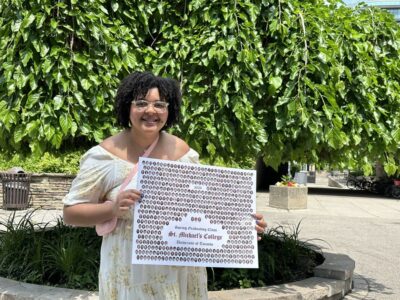
Congratulations, Grads! — Congratulations to the Class of 2023 and welcome to the St. Mike’s alumni family! We were excited to welcome so many grads, along with family and friends to the BBQ hosted by St. Mike’s Advancement on June 13. The night before convocation, 450 people attended our annual awards ceremony and reception for graduands.
New Chancellor Installed at St. Mike’s — Toronto Archbishop Francis Leo was installed as the sixth chancellor of the University of St. Michael’s College. The installation ceremony took place prior to the Baccalaureate Mass, on the afternoon of June 12. Welcome, Archbishop Leo!
St. Mike’s Commits to Divest from Fossil Fuel Investments — At its June meeting, the Collegium of the University of St. Michael’s College committed to fully divest the University’s investments from fossil fuels by the year 2030, or sooner if possible. The University has held no direct investments in fossil fuel companies since 2013, and the Collegium’s decision will complete the process of removing fossil fuel companies from its indirect investments. Complete divestment from fossil fuels builds on St. Mike’s established initiative of investing according to its institutional values.
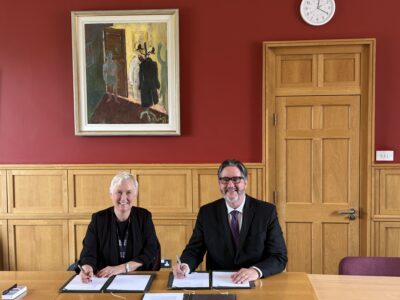
St. Mike’s strengthens ties to Maynooth University — The ties between the University of St. Michael’s College and Ireland’s Maynooth University are now even stronger thanks to an enhanced memorandum of understanding signed between the two universities. The agreement will further open doors for students and professors at both institutions, including new opportunities for students in the College’s undergraduate Mediaeval and Celtic Studies programs, and the Regis St. Michael’s Faculty of Theology. The MoU was signed in May when President Sylvester travelled to Maynooth, a trip that coincided with the annual excursion to the Irish university by students from St. Michael’s Boyle Seminar in Scripts and Stories, one of the many experiential learning experiences available to both undergraduate and graduate students at St. Michael’s.
Having a Blast at Alumni Reunion — From parties and pub nights to lectures and an awards brunch, over the course of five busy days filled with fun and fellowship we welcomed nearly 700 alumni back to campus as part of Alumni Reunion, which ran from May 31 to June 4. It was a pleasure to reconnect with alumni here at our “Oasis in the City” and celebrate the people who make the St. Mike’s community so special.
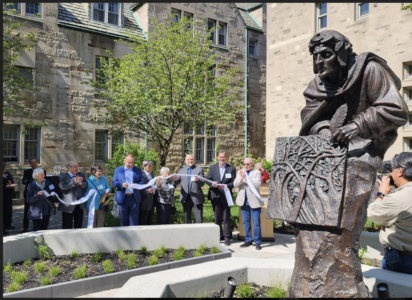
Dante Garden Unveiled — May saw the unveiling of an exciting new landmark at St. Michael’s, The Dante Garden. Patrons, donors, and friends gathered in the beautiful new garden, located at the corner of St. Joseph Street and Queen’s Park, which features sculptures of the cantos of the Divine Comedy, and Dante himself, by artist Timothy Schmalz. Brought to life by patrons Maurizio Bevilacqua and family, and Tony and Lina Gagliano and family, along with generous donors, this new landmark is a stunning addition to our campus, offering a new way to engage with the genius of the Divine Comedy.
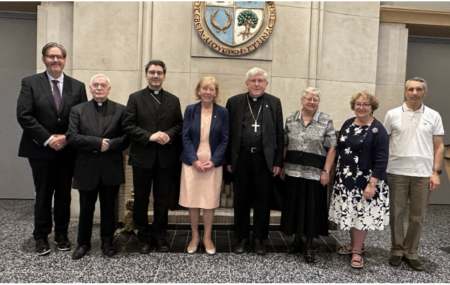
St. Mike’s Hosts CCBI Book Launch — The University of St. Michael’s College was delighted to host the launch of Catholic Bioethics: A Twenty-year Perspective. We were particularly pleased to welcome Archbishop Francis Leo, Cardinal Thomas Collins, and many of the book’s contributors to the afternoon event.
MPP Visits Founders House — Rosedale MPP Jessica Bell met with St. Mike’s President David Sylvester at Founders House to discuss ways to work together to support the needs of the community.
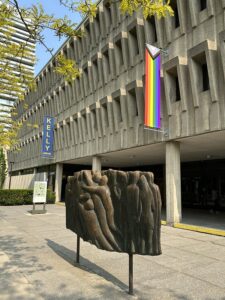
Pride Progress Banner Raised — The University of St. Michael’s College respects diversity in all its forms and is committed to developing inclusivity an inclusive, welcoming community. Late in May, we raised a Pride Progress banner on the John M. Kelly Library, a sign of our commitment to that pledge.
Something’s Cooking… June 1st marked the arrival of Dana Hospitality to campus. Dana will now be handling food operations at USMC and Loretto sites.
What a Great Team! — Faculty and staff gathered in Charbonnel Lounge in June over a great array of desserts to celebrate those people marking significant work anniversaries. An especially warm welcome was offered to Jean Talman, who retired from the Principal’s Office after serving the community for 35 years, creating a strong link between the College and the greater Irish community in Toronto. Sláinte mhaith!
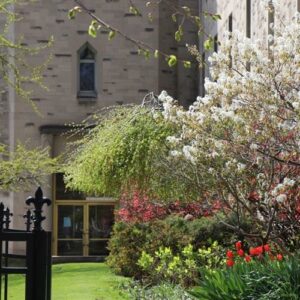
A Standing Invitation — It’s no secret that our Oasis in the City is beautiful year-round, but right now the campus is awash with colour. If you’re in the neighbourhood, please drop by to take in the sights. You’re always welcome!
March and April saw good news for St. Mike’s on multiple fronts. Here are just a few of the things we’ve been celebrating on campus in recent weeks:
President Sylvester Re-appointed–We are delighted with the news that Dr. David Sylvester has accepted a second term as President of the University of St. Michael’s College. Dr. Sylvester has made great strides at St. Mike’s and we look forward to another successful term.
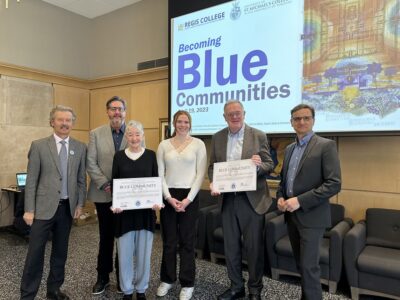
Making Waves as a Blue Community–St. Michael’s and Regis College are now Blue Communities. We signed on as members in mid-April, formally recognizing that St. Mike’s is committed to protecting the world’s water supply and ensuring all people have access to water as a human right.
St. Mike’s, Loretto Sign Residence Agreement–In a significant development designed to protect and carry forward the impact of the Loretto Sisters on our campus, St. Michael’s announced it would be assuming the operation and management of Loretto College as of May 1, 2023.
ACCUC Meets on Campus–St. Mikes played host to presidents from the Association of Catholic Colleges and Universities for their most recent semi-annual meeting.
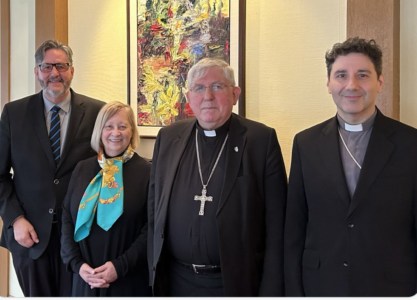
Archbishop Leo Visits Founders House–Archbishop Francis Leo stopped by Founders House shortly before his installation in March. He arrived with Cardinal Thomas Collins to meet with Collegium Chair Rosanne Rocchi and President Sylvester.
Exciting Staffing News from Campus Ministry–The Campus Ministry team is expanding! Campus Ministry Coordinator Nicole Ferrante is now full-time, having successfully completed the comprehensive exams for her Master of Divinity degree at Regis College. As well, Christina Labriola has joined the team as the Director of Music. She will remain Artistic Director of USMC’s Schola Cantorum as well as creating a student choir you’ll hear on Saturday evenings at the Campus Ministry Mass during the academic year. She’ll also offer music workshops as a means of professional development and networking for liturgical musicians in Toronto. You’ll see her Christina in action at the Baccalaureate Mass on Monday June 12.
Jesuits Shine Light on Work of Sonal Castelino and Fr. Rixon–Sonal Castelino, xmcj, and Regis Fr. Gordon Rixon, SJ, were featured in a recent edition of the Jesuit publication Hemispheres for their work presenting the Homeless Jesus statue at Regis College to visiting high school students.
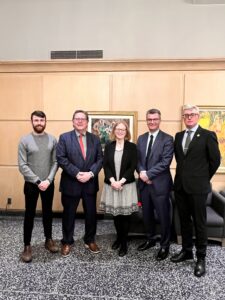
Panel Marks Good Friday Accord–St. Mike’s marked the 25th anniversary of the Good Friday Accord, a critical step in the move to peace in Northern Ireland, with an impressive panel discussion featuring Janice McGinn, Ireland’s Consul General in Toronto, MP James Maloney, Greg Quinn, the Acting British Consul General in Toronto, Ciaran Quinn, Sian Fein’s representative in North America, and Robert Kearns, Chair and Founder, Canada Ireland Foundation.
The Return of the “Christianity and the Arts” Lecture–University of Westminster professor John Wyver gave a presentation about his BBC television documentary Coventry Cathedral: Building for a New Britain, telling the story of the building of the new Coventry Cathedral in 1962 after the destruction of the medieval building in WWII.
Innovative AI Class Announced–How’s this for exciting programming? We learned that Fall 2023 will see a new class at St. Mike’s that will be taught almost entirely with artificial intelligence tools. “AI as a Classroom” is an advanced fourth-year seminar that will be offered as part of the Book and Media Studies Program (BMS) at St. Michael’s College, in the University of Toronto.
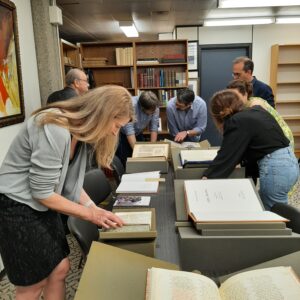
Kelly Library Dante Collection–“They entered the Kelly Library with hope and abandoned none of it,” Kelly staffers report. Dante enthusiasts including Heather Webb, keynote speaker at the “Emotions and Communities in Dante” conference, immersed themselves in the Library’s Dante Collection in advance of her closing address at the “Emotions and Communities in Dante” conference, held at St. Mike’s from April 12-13. Webb, from the University of Cambridge, was joined in the library’s Special Collections Reading Room by other Dante scholar, including Elisa Brilli from the U of T Centre for Medieval Studies.
2022-23 St. Mike’s Yearbook Released–The Mike Publications produced the 2022-2023 St. Mike’s Yearbook, created by a dedicated team of student leaders. It features events and programs from various student initiatives and activities throughout this academic year. To purchase a yearbook, visit https://form.jotform.com/231033563911044. To view our incredible archive of SMC yearbooks check out https://archive.org/details/usmcyearbooks.
SMC Troubadours Present Angels in America–The SMC Troubadours presented a staged reading of Angels in America, Millennium Approaches, to a sold-out crowd in our beautiful Father Madden Hall. This epic story involved incredibly creative staging and interactive story-telling that left a huge impact on those who attended.
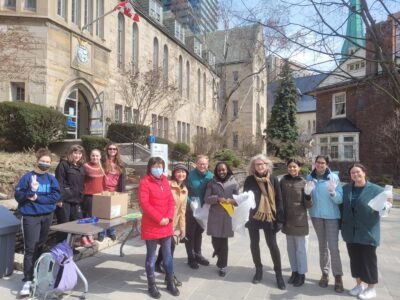
SMC Campus Clean Up–Clean SMC, St. Mike’s student-led initiative focused on sustainability and creating a culture that cares for our common home, organized a campus-wide clean up with support from the President and Bursar’s offices! The clean-up had more than 30 attendees and showcased the efforts of our collective community in preparing for a beautiful spring season.
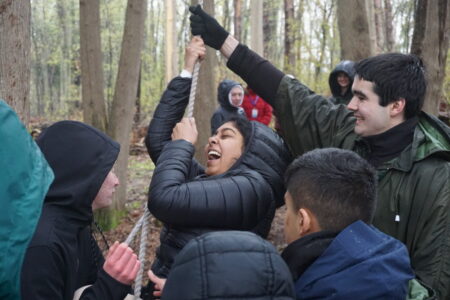
A Fruitful Retreat for All–The last weekend in April saw Sonal Castelino, xmcj, and Emma Oliver, Assistant Dean of Campus Life, take 28 students in senior leadership on a retreat at Lake St. George Field Centre. Retreatants included orientation coordinators, members of the residence council, student campus ministers, SMCSU members, mentorship coordinators and commuter coordinators.
(Originally published in St. Michael’s Fall 2022 Alumni magazine)
St. Mike’s has always placed concern for students’ physical, emotional, and spiritual wellbeing at the heart of each and every decision. But the months and years of COVID have presented our students with unprecedented challenges as they have coped with the upheaval, uncertainty, and isolation caused by the pandemic, a sudden reality that has only added to the stress many students feel today.
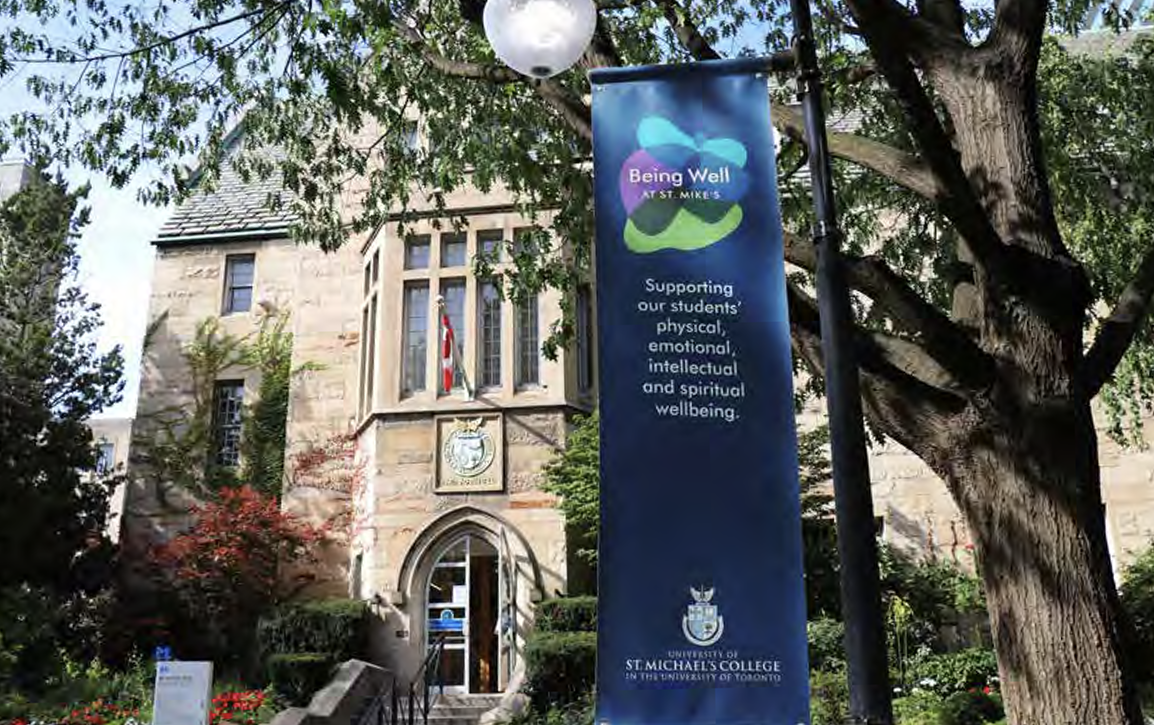
Over the past several years, the number of university and college students in Canada with identified mental health issues has more than doubled. The number of students reporting anxiety, depression and suicide attempts have risen dramatically. A focus on the health and wellbeing of young people is central to realizing their potential. That’s why St. Mike’s views student wellbeing through a broad lens. Students at St. Mike’s have access to the full mental health supports at the University of Toronto, which includes U of T’s commitment to same-day counselling services supports students’ acute needs during crisis and is delivered virtually—the location of these supports has become irrelevant.
St. Mike’s recognizes the tremendous value of the crisis support provided by U of T, and we also remain committed to continuing our approach of providing person-alized support and a robust suite of activities that support students through critical moments while developing coping skills that will last a lifetime. Among our supports we offer:
A Wellness Counsellor provides clinical support and/or counselling services to students who are experiencing personal, social and/or educational distress;
The First-Year Check-in Program pairs incoming students with a professor to demystify the relationship and enhance connections within the St. Mike’s community;
The St. Mike’s Mentorship Program pairs trained, upper-year students who model positive qualities with first-year students to foster personalized relationships;
Commuter Dons and Residence Dons connect students to the larger St. Mike’s community;
Safetalk training is provided to all student leaders and Dons, and on request to other members of the St. Mike’s community, to empower everyone to play a role in suicide prevention by recognizing the signs that someone is in distress;
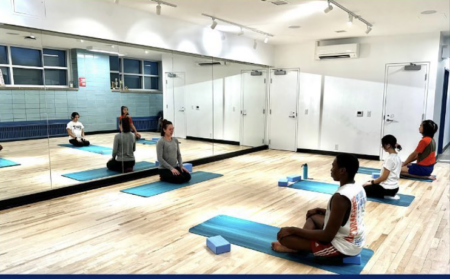
St. Mike’s Wellness Council, a student initiative, is dedicated to providing students access to wellness-based events;
The Student Wellness Studio supports wellness programming such as mindfulness, yoga, and physical activities;
Spiritual support is delivered through St. Mike’s Campus Ministry, St. Basil’s, and connections to multi-faith and Indigenous groups at U of T Academic Support and Advising comes via relation-ships built with professors, mentors and peers, as well as a range of services such as the Writing Centre; and Emergency bursaries offer financial support.
Being Well at St. Mike’s: Should you wish to learn more about how you can help, please contact the Advancement Team at 416-926-1300, email smc.annualfund@utoronto.ca or visit the U of T Giving Day page.
The University of Toronto Student Leadership Awards (UTSLA) recognize students in their final year who have at least one year of significant volunteer leadership and high-impact service.
St. Michael’s is pleased to announce the 2023 award winners and to congratulate students who have shown their leadership and volunteerism and made a positive impact on and beyond campus:
Evangeline Cowie
Shameel Rajnath Mohammed
Sophia Anna Poulimenakos
Andrew Roberts
Ella Tetrault
Awarded for the first time in 2020, the UTSLA awards continue U of T’s long-standing tradition of recognizing outstanding student leadership, volunteer service, and commitment to the university. Recipients of the UTSLA join the distinguished community of past Cressy Award recipients.
Congratulations to the 2023 recipients!
On February 1, Prof. Pa Sheehan and students in his “Introduction to the Irish Language” class made St. Brigid’s Day crosses, to mark the feast day of Ireland’s patroness saint and the traditional Gaelic festival celebrating the beginning of Spring.
Devotees see Brigid, and the ancient Irish goddess whose name and attributes she shares, as emblematic of feminine spirituality and empowerment. Brigid’s Day is particularly significant this year since it is the first national holiday in Ireland to honour a woman.
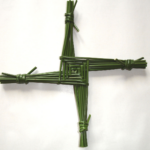
A Brigid’s cross usually consists of rushes woven into a four-armed equilateral cross, but Sheehan’s students made crosses out of paper material as it is difficult to come across rushes at this time of year in Toronto!
The crosses are traditionally hung over doors, windows, and stables to welcome Brigid and for protection against fire, lightning, illness, and evil spirits and are generally left until St Brigid’s Day the following year.
The first day of February also celebrates the traditional Gaelic festival of Imbolc. This festival celebrates the end of winter and the beginning of spring. Consequently, it seems that St. Brigid’s Day has replaced Imbolc and is associated with new beginnings.
As the great Irish proverb says: An té nach gcuireann san earrach, ní bhainfidh san fhómhar. (The person who doesn’t sow in spring won’t reap in autumn.)
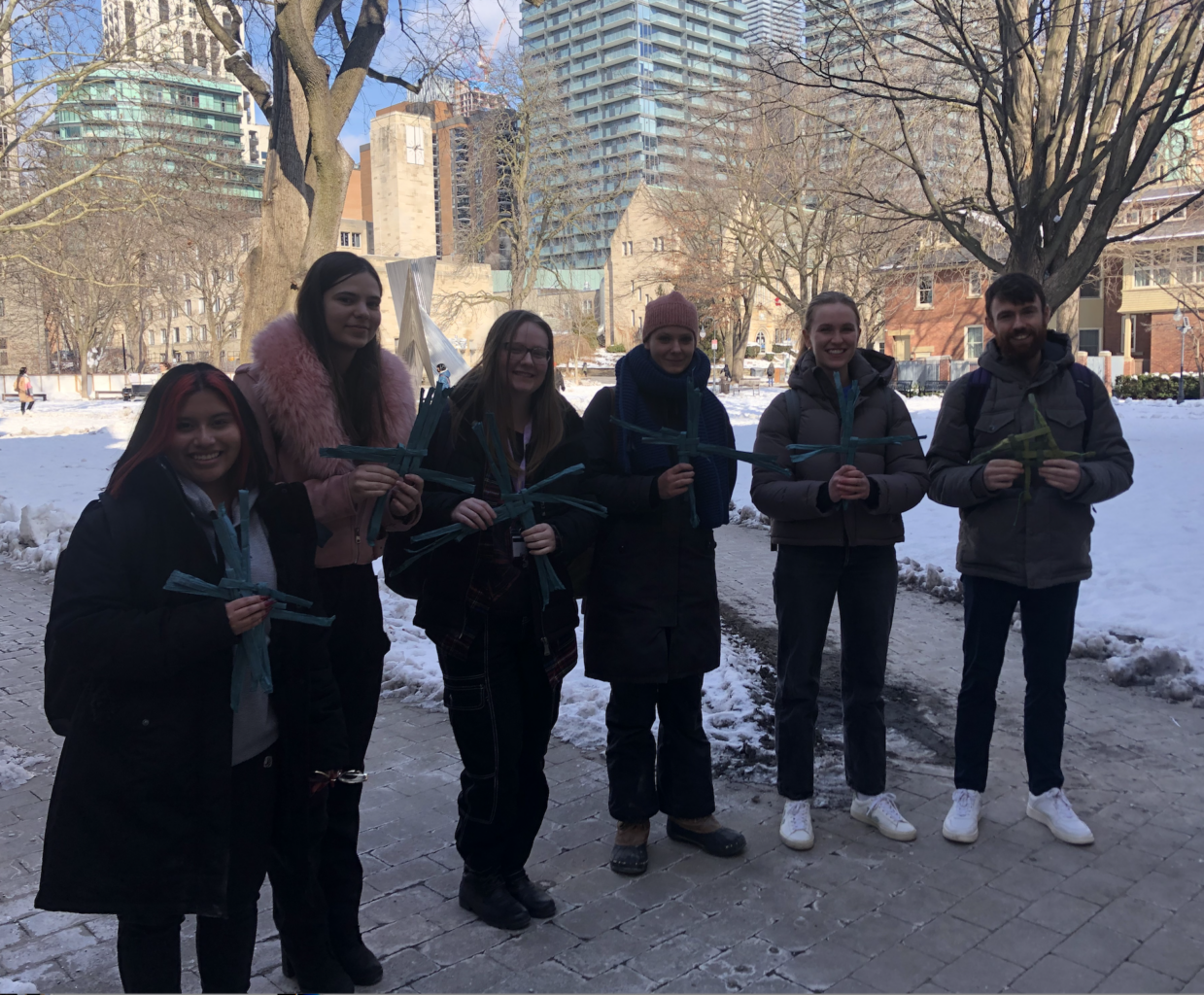
The trees are trimmed, the lights are lit, and St. Mike’s is preparing for the most festive season of the year.
Classic traditions are merging with a significant new event this year as we ready for the holiday season with the introduction of St. Mike’s own Christmas Market to our Advent and Christmas activities and events. The market, to be held on Thursday, Dec. 8 from 3-7 pm on Elmsley Lane, will feature both student and alumni vendors selling everything from jewelry to baked goods and crafts. Partial proceeds from the event will be donated to Romero House, a Toronto community of transitional housing and immigration and settlement support for newly arrived refugee claimants.
The market is open to all and will be a nice stopping-off spot for attendees at a seasonal classic beloved by alumni, our annual Christmas tea. The tea is also being held on December 8, from 1:30-3 pm in Fr. Madden Hall, on the ground floor of Carr Hall. Guests will be treated to high tea snacks and carols—and an open invitation to visit the market tables for a little festive window shopping.
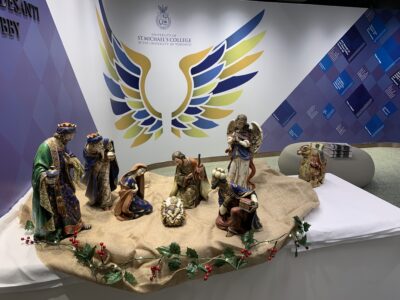
The day, which marks the Feast of the Immaculate Conception, begins with Mass in St. Basil’s, with music by St. Basil’s Schola, at 12:10 pm in St. Basil’s Church.
Students have a host of social and spiritual offerings through the season, including a dinner hosted by the Commuter Dons and Campus Ministry for undergraduates on Dec. 1 and two dinners for students in residence, hosted by the Residence Council and Residence Life, on December 6 and 8.
The Student Life Committee in the Faculty of Theology will be offering an Advent Taizé prayer service in the Flahiff Centre chapel at 1:30 pm on Wednesday, November 30. All are welcome. The committee will hold its annual Advent retreat for theology students the following Friday, December 2. Campus Ministry is working with the Mary Ward Centre to host a four-week Advent “retreat in daily life,” with Scripture, prayer, and conversation. The sessions run Mondays, 7-8:30 p.m., from November 28 through to December 19.
Another highlight eagerly awaited is the annual luncheon for staff and faculty, hosted by President David Sylvester, a chance for all of us to come together as a community and enjoy each other’s company—in person!
Even if you can’t make our Christmas Market, there is an open invitation to come to campus and see our beautiful decorations, including a swath of lights—heavy on the blue, of course! – that light our way in these days when the sun sets so early. There’s a reason we are a four-season Oasis in the City, so stop by soon as the lights come down in January.

The University of St. Michael’s College will host a key event in Pope Francis’s Synod on Synodality process with the findings from a North American report commissioned by the Vatican as part of the Doing Theology from the Existential Peripheries project to be presented during a panel discussion on campus.
The panel, moderated by Dr. Mark McGowan, will take place Thursday, November 10 from 7-9 p.m. and will also be made available online.
Dr. Darren Dias, OP, an Associate Professor in St. Michael’s Faculty of Theology who also serves as Executive Director of the Toronto School of Theology, was appointed last December by Rome’s Dicastery on Human Integral Development to join the project’s North American working group, with similar exercises conducted around the world. The eight theologians conducting the research listening to the concerns of those on the margins were led by Stan Chu Ilo, a St. Michael’s alumnus who is a professor of World Christianity, Ecclesiology, and African Studies at Chicago’s De Paul University.
“We have presented our findings in the context of a conversation,” says Dias, who explains that there is an ongoing commitment on the part of the working group–and Pope Francis–to listen to the experience of people, and especially to those who often find themselves without a voice. Each of the six working groups around the world is invited to hold some sort of event to share their initial findings as part of an ongoing conversation/listening process to ensure that the findings are known to the general public.
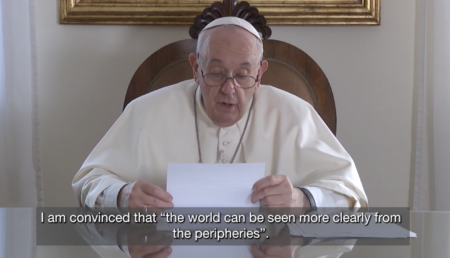
The groups were assigned themes from Pope Francis’s teachings such as migration, ecology, and vulnerability. As the North American report explains, “we take readers into the world of so many people whose voices are not often heard in our churches and society,” with members of the working group visiting prisons, refugee and immigration centres, national borders, convents, holding centres, seniors’ residence, rehabilitation centres, churches and social and pastoral centres, to name a few.
“We are committed to bolstering ways in which theology can support engaging the peripheries,” Dias says. “This is a research project, an academic exercise, and we will report our findings to the bishops, theologians, pastoral workers, and the faithful in service to the Church. This is the business of a Catholic university, to be at the margins. We are committed to bolstering a theology that supports the theological renewal proposed by Pope Francis.”
Pope Francis launched the synodal process in 2021 to help the Church to listen to its constituents and learn from them. The pope has since extended the window during which the synodal process takes place until 2024.
Earlier this year the University of St. Michael’s College Synodal Working Group held seven listening circles for students, staff, and faculty, and conducted 25 one-one-one interviews before submitting a report to Rome on the findings. University President David Sylvester presented a brief summary on the methods used at St. Michael’s to Nathalie Becquart, XMCJ, undersecretary and consultor to the Synod at meetings in Rome in June.
Final reports from the peripheries project are available online: https://migrants-refugees.va/resource-center/publications.
Watch the video for additional context: Wisdom from the Margins
RSVP to attend in person: https://bit.ly/3CIOLEt
RSVP to participate online: https://bit.ly/3yUKKvw
A community Mass on Saturday evenings, a variety of multi-faith celebrations, and working with the marginalized people of Toronto are some of the many ways a revitalized campus ministry will be offering diverse programming and activities for the St. Michael’s community this academic year.

“There are three areas of growth for us,” explains Campus Ministry Director Sonal Castelino, xmcj. “We want to give students who are curious about the Catholic faith, or who want to deepen their spiritual life, opportunities such as a Scripture discussion group, regular prayer gatherings, or the chance to help with the music ministry at the Saturday Masses. We also want to offer inter-religious and inter-cultural events, providing the chance for engagement and celebration with the broader community, and we want to engage in a variety of social justice initiatives.”
And, Castelino emphasizes, as she now has a team of a team of eight student leaders in place, these activities will offer students an opportunity to work with other students, empowering them and helping them find and develop their own voices. The team includes two members dedicated to interfaith activities, two members focussed on social and community outreach, two to retreats and faith formation and two expressly dedicated to Catholic faith formation.
“There is a calling for campus ministry to offer a niche in the very busy lives of students. We want to make a connection between the campus and the city, whether with the vulnerable or with a variety of faith and cultural traditions,” she explains. “We want Campus Ministry to become a space where all will feel welcome and that they know they belong. There is a very real comfort level in our college about being open to exploring spirituality and faith. Caring for the whole student means accounting for this dimension of their campus experience as well.”
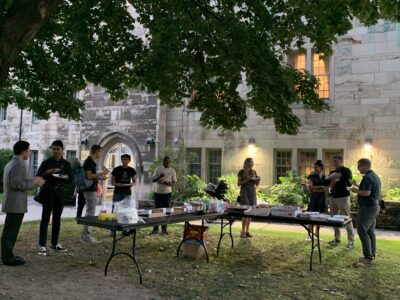
A core aspect of Campus Ministry’s offerings with be newly scheduled Student Mass, to be held Saturday evenings during the academic year at 6:30 in St. Basil’s Church. Students will have the opportunity to sign up to serve as lectors or for the music ministry, and to join in a meal with other community following Mass. Celebrants will include various priests from the University community.
For more social connections, Campus Ministry also has a new drop-in lounge, located in Brennan 101, a quiet place for connection, as well as for team members to do their work.
Campus Ministry will also offer a range of social justice initiatives, with opportunities such as visiting long-term care facilities and homeless shelters designed to offer hands-on help while also gaining an education in systemic challenges in society.
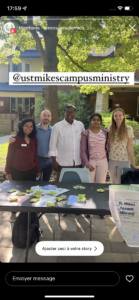
As well, the team will be involved in offering support to a range of faith traditions seeking to mark important dates in their calendars, while also hosting cultural events for special moments throughout the year such as the Hindu festival of Holi and Chinese New Year.
Finally, another development this year is off-campus retreats. Since the community spent a lot of time indoors and isolated during the pandemic, Campus Ministry will offer two opportunities for students to head off campus for a weekend, taking the time to pray, reflect, and build friendships.
“Campus Ministry should be a place that allows us to hold a mirror to ourselves showing the depth and diversity that is our college campus. We invite people into a deeper relationship with themselves, each other and God, creating space to explore different ways of being, which helps to build community, and lends support as we gain the courage to ask questions,” Castelino observes.
Campus Ministry events can be found on its Instagram account – @ustmikescampusministry – with a web page to follow.
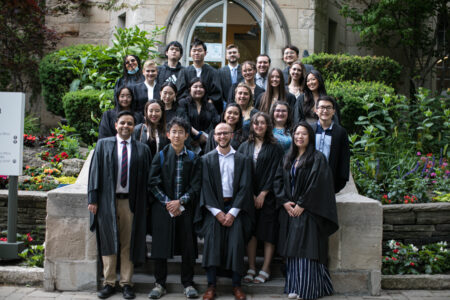
Summer has brought welcome changes to the University of St. Michael’s College campus. As the flowers bloom, and we prepare for the school year, we are taking time to look back on June and July, and share some of our wins, successes and achievements of the season.
Convocation — We celebrated the Class of 2022 and welcomed this year’s graduates into the St. Mike’s alumni community at our Graduate & Family BBQ hosted by St. Mike’s Alumni Affairs. Elmsley Place provided a beautiful setting to celebrate graduates’ achievements, open Convocation gifts, and enjoy a delicious lunch.
Mentorship program — We are proud to announce that the mentorship program has more than 135 first-year mentees matched with upper-year mentors, with more students signing up daily!
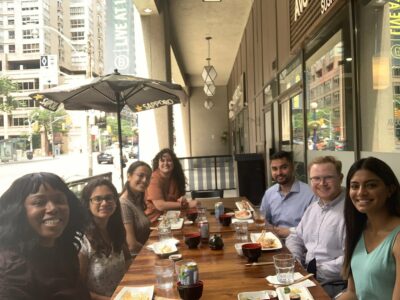
New Hires — We welcomed a number of new hires, who continue to serve and help enrich our students, faculty, and community. Some new hires gathered on July 22 to connect with each other and build new relationships. From left to right: Tamarah Bryan, Erica Figueiredo, Sumeeta Farrukh, Karina Stellato, Nabil Arif, Kevin O’Rourke McColl, Jashan Khokhar.
Dr. Nicholas Terpstra took up the position of St. Michael’s Interim Principal on July 1. Terpstra, whose research examines the intersection of politics, religion, gender, and charity in Renaissance Italy, has taught at the University of Toronto since 1998. His current research is focused on two main areas: a digital mapping project based around Renaissance Florence, and a study of of how different social, cultural, and religious groups used spatial and sensory boundaries to navigate their relations with each other in 16th-century Tuscany.
Regis-St. Michael’s Faculty of Theology welcomed its new Dean: Dr. Jaroslav Skira, who hosted an open house gathering at Regis on July 13 which was well attended.
Regis College also welcomed its new President, Gordon Rixon, SJ.
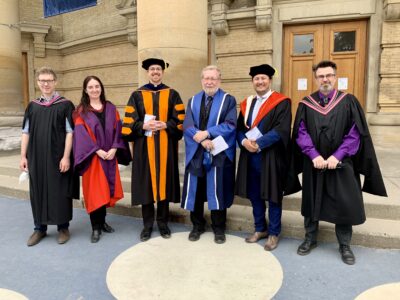
New Journeys — We bid Dr. John McLaughlin goodbye as former Dean of the Faculty of Theology. He will continue to serve as a Professor of Old Testament /Hebrew Bible at the Faculty of Theology. We are also celebrating the goodbye (for now) of Mark McGowan, the former Interim Principal at the University of St. Michael’s College from 2020-2022. He is going on sabbatical for research in Ireland. After that, he will continue to serve as Senior Advisor to the President, on Catholic Education, and will return to Celtic Studies and the History Department following his leave.
Renovations — We had some window cleaning at Founders House, which allows our staff to continue to see our Oasis in the City all around us. The Wellness Centre renovation in Elmsley Hall is moving wonderfully and is scheduled to be completed before Labour Day weekend.
Retirement — We celebrated the retirement of Jean Talman, Program Assistant for the Celtic Studies program, with 32 years of service at the University. Sláinte!
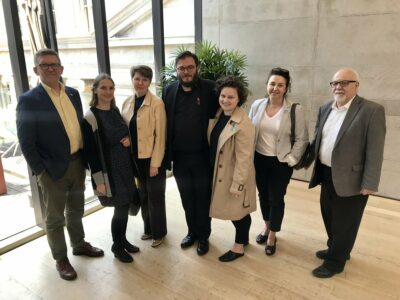
Ukrainian Visitors — MASI is proud to #standwithukraine. On June 29, the Metropolitan Andrey Sheptytsky Institute of Eastern Christian Studies (MASI) had a planning session to prepare for the hundreds of Ukrainian students expected to arrive from Ukraine at the University of Toronto this fall, thinking about how we can support them at the University of St. Michael’s College.

Welcome Day — On June 11, St. Mike’s opened its doors for an in person for Welcome Day, an opportunity for incoming students and their parents to learn about the university experience and critical first steps as they begin their university journey. Hybrid academic info sessions hosted by the Registrar and Student Services staff, campus tours, booths for student resources at St. Mike’s, and lunch in the Canada Room were some of the activities available to our newest students.
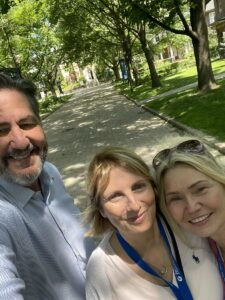
Summer has brought us beautiful weather and gorgeous flowers and trees — and Summer Camp. We currently have educators and students from Rome–seen here with President Sylvester are Alina Axinte and Celestine Cavalcante from The Parioli English School– on campus this summer for the Sol language Camp.
We hope that each of you can visit to see our campus in person, which gets more beautiful every year. There’s a reason St. Mike’s is known as the #Oasisinthecity!
“The most important part of SMC Orientation is showing students that they belong here.”
-Alessia Baptista and Sophia Poulimenakos, Orientation Coordinators 2022
Alessia Baptista and Sophia Poulimenakos are this year’s Orientation Coordinators. Alessia is a fourth-year student studying English with minors in French and Anthropology, while Sophia is a fifth year studying Political Science with minors in Sociology and Music History. Orientation holds a special place in their hearts as they both have been a part of orientation since their first day at SMC.
When we were told we’d been given the green light to have a fully in-person Orientation this year you could not contain our excitement. Both of us were orientees in the pre-pandemic Orientations (in 2018 for Sophia and 2019 for Alessia) but neither of us knew that this amazing event that changed our lives would be held in an entirely different way when we chose to get involved. When we signed up as leaders in 2020, the world turned upside down, and the need to find community became even greater. Orientation is special: we would argue it’s the most special and important event any university has to offer. It presents an opportunity like no other to show our new students that SMC is their corner of the campus: a corner that belongs to them and will always be there for them. In times like these, when community building is more valuable than ever, we did not take the responsibility of planning the first in-person Orientation in two years lightly.
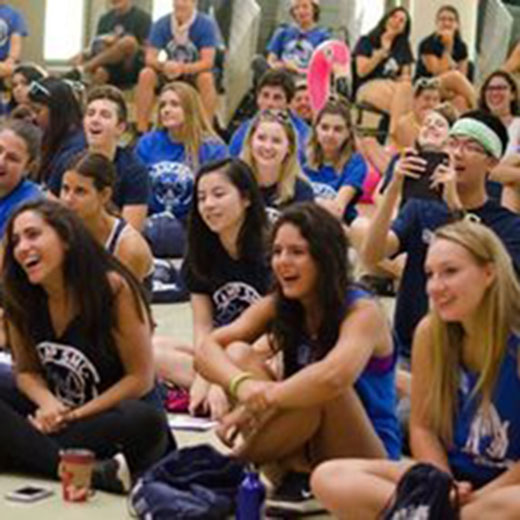
If you asked each of us what the most important part of Orientation is, we wouldn’t say the countless nights planning our events schedule, calling numerous vendors, or even the days we spend contemplating the smallest things (we’re overthinkers; what can we say?). The most important part of Orientation is ensuring each student knows that they belong here. No matter where they come from or who they are, SMC has a place for them.
But it’s only so much to make such a bold statement; we had already found our places within this community, so this year we made it a top priority to implement everything we could to ensure everyone can see themselves reflected in this community.
We started small, right down to our team. Our main concern became who would be the first people welcoming our students to SMC, and we wanted everyone to see themselves reflected in student leadership. We took a lot into consideration, from our younger staff taking on larger roles to ensuring not only those willing to scream at the top of their lungs in front of a crowd would apply for roles, and even encouraging first-time student leaders into our team. Our first step in creating a community where students feel they belong is representing them at the onset. When a team looks and acts like the people they are leading, others feel like leadership not only welcomes them, but needs them to function to their fullest capacity.
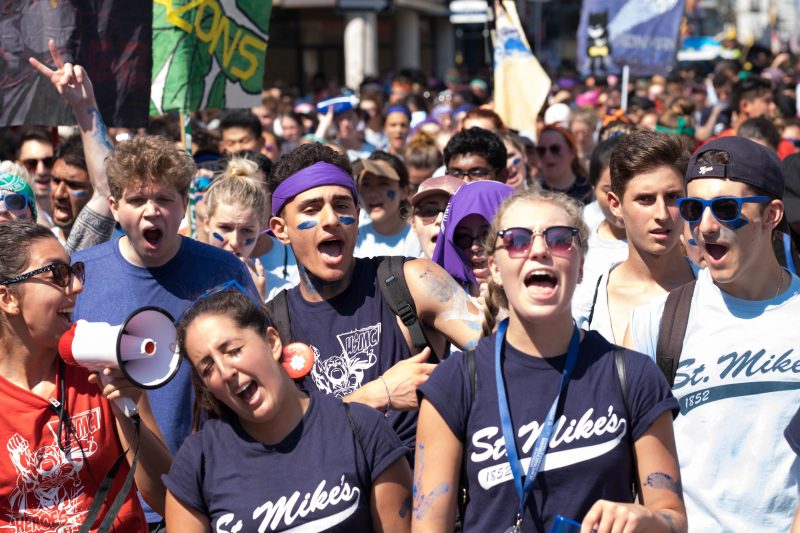
Our next step became looking wider than our own community, even wider than our own country. With both of us being domestic and commuter students, Toronto life came more naturally to us, but that wasn’t the case for many of our international friends. We started holding debriefing sessions with our staff, mainly targeting our international staff members, asking them what we could do better and, honestly, what we weren’t considering, having always lived in Ontario. Resources were huge, from small things such as where to buy groceries or “what even is Presto card?” to much larger things like buying an apartment in the city, applying for a SIN number, or finding mental health and community resources in the city when students felt alone.
We came to the collective conclusion that SMC Orientation was not doing enough to highlight how hard it is to move your whole life to a new country many incoming students had never seen before. The solution was to implement tours of Toronto, international student workshops built right into our Orientation programming, and a Cultural Club Showcase exceeding what SMC can provide. Designed by international students for international students, we granted our team the ability to take the lead on creating the programming they knew would have helped them. With this, our hope was that it would give our international population the chance to even have just a little more ease in their transition.
Of course, Orientation is not without tradition, and the green light to have everything in person meant we got to bring not only new ideas to the forefront but also old ones that our older staff had come to miss. With our theme this year being SMC: Treasure Island, the opportunity to bring back events became even easier. With campus tours disguised as campus-wide scavenger hunts, Zumba parties in the Quad encouraging exercise for their treasure hunt adventure ahead of them, and a Formal at the Hockey Hall of Fame showcasing operation “find the crowned gem” – in this case finding the Stanley Cup and taking a picture with it. All this work to find the most important treasure of them all – friendship! Okay, not just friendship, but the chance to be crowned the winner of the O-Cup and have their team’s name immortalized at SMC forever. This year’s theme is reflective of the very thing we wanted to portray for this year’s Orientation, on a treasure hunt you may feel like you’re on your own towards the goal of finding “treasure” – but what you find along the way is people who want to help you and support you and your goals.
SMC Orientation has always been about team building and finding community, but this year we wanted to make sure that we understand that a community is only as strong as each individual within it. The art of planning the first fully in-person Orientation in two years comes down to combining the new with the old–much like our staff and students–and it becomes our job to ensure everyone finds their place within the place where we found ours.
Read other InsightOut posts.
David Rubenstein graduated with an Honours Bachelor of Science with High Distinction in Biochemistry and Physiology. With aspirations to join the medical vocation, he has been accepted into the LMP MSc program for 2022.
“SMC is home” is a phrase that is often heard being used by visitors to the grounds of SMC/halls of Brennan, for those fortunate nesters who have lived in residence, and those flocks of commuters that travel long and far just to hang out in the COOP.
For me, “SMC is Home” holds meaning because this has been an important place that has aided my growth into the person that I am today. It has been my stepping stone in my academic career, It has been my nest, the place where I have met many friends, faced challenges, and accomplished many feats.
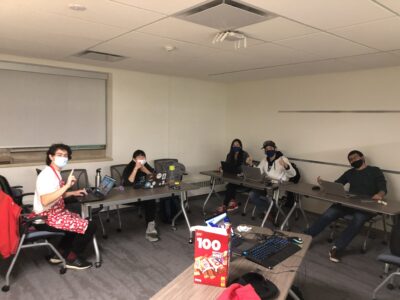
One of the achievements I am most proud of is the creation of a Minecraft club during the beginning of the pandemic that worked towards fostering community through a collaborative project of recreating a virtual 1-to-1 scale of our St. Mike’s Campus on our public server.
To give a little background about how this all came about: it all started when I lived in the residence buildings during my first two years of undergrad, between 2018 to 2020 — the pandemic year.
During my first year, I was a proud and engaging member of Mallon House located on Elmsley Second. The Mallon boys had a strong community thanks to our valiant leader and Don Big Mike. But as second year came around, community was a little bit harder to come by for me.
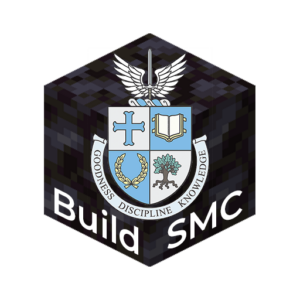
My dorm room during second year was located in the north wing of Sorbara First, which was uniquely designed to have a walkway in between the north and south wings such that they were not physically connected. This most definitely made connecting with my brothers in the south more difficult, but it also turned our wing into a nice secluded little patch of paradise with very little foot traffic. A perfect location to ride out the self-isolation during the Covid-19 pandemic in March 2020. But even before this, it would also get a bit lonely sometimes to be so close yet so far away from the rest of the floor.
In September 2019, I was elected president of the Sorbara First House Council, and for one of my first initiatives, I helped to establish and promote multiplayer video and board game nights as an attempt to strengthen the community within our floor and with our sister floor (Sorbara Fourth, Wall House? – I forgot the house name sorry). We played games like Scribblio, Codenames, AmongUs, and my personal favorite: Minecraft.
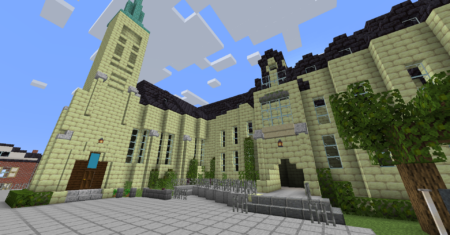
For those who are unfamiliar, Minecraft is a video game where players can make or break apart various kinds of blocks in a three-dimensional world. With a distinctly simple yet chunky aesthetic, this game offers two game modes: Survival- where players collect food and resources to explore and survive the world and its many dangers. And Creative- a sandbox mode where players are given all resources and are free to create anything they want to.
Minecraft also offers multiplayer access, so players can interact on the same world or server and complete tasks together. This was a perfect platform for us because a good chunk of my generation had grown up playing Minecraft, you could hop on any time and just have fun.
With my friend Jake Lunn’s help, we created the Sorbara First server and invited everyone to play on. Throughout the school year, we would all sit around in the common room or in someone’s dorm room and build our dream houses, go on epic quests, do harmless pranks on each other and just have fun. (shout out to the madlads: Borair, Sam, Kamil, Cedric, Vansh, and Jake). But then as March of 2020 came creeping in, so did the self-isolation protocols. While our in-person gathering came to a halt, we continued to use the digital worlds of video games like Minecraft to socialize and play together.
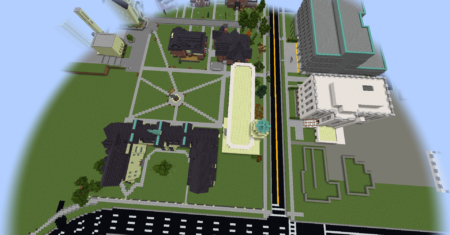
One night, as I sat staring boredly at the walls of my 11’ x 14’ room (yes, I had reached a point of boredom where I decided to measure the dimensions of my dorm using just a pencil and a 12’ ruler) I decided that it would be fun to recreate my dorm room in our minecraft server as a way to remember where I spent self-isolation during these difficult times. My fellow Sorbara minecrafters loved the idea! And joined me on this personal project and built their rooms as well as it was a fun and unique activity.
We let our creativity soar high and wide, and what started out from just building rooms, extended to building our entire floor, and eventually to the entirety of Sorbara Hall. It was at this moment that I proposed an idea. What if we built our entire UofT campus?
Of course I was being extremely ambitious, but this question led me and a small group of friends (Keanu, Gordon, Matthew, and Mateo) to create a new SMC club in the summer of 2020 called: BuildSMC. Our goal was simple: to foster community and work on this project of building our St. Mike’s campus in Minecraft.
We created a club Minecraft server free to join for any SMC or UofT student and worked on this project all summer. By September 2020, we had already built all of Sorbara Hall, every historic house on Elmsley way, and had laid down the foundations for Brennan Hall, Elmsley Hall, the Queens park buildings, and Kelly Library.
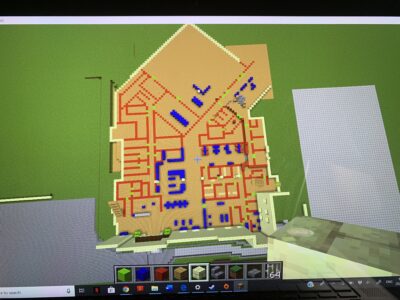
Because Minecraft blocks use the metric system and have been designed to be one cubic meter, we decided to create as accurate a model of our campus as possible. For measurements, we used various online tools to aid our build. Such as using Google Maps features like Measure Distance to determine the dimensions of buildings, locations, parks, and the Google Streetview feature to look at building exterior designs. For building interiors, we used apps like FindMyClassroom, old SMC floor plans that were accessible from the library, and the emergency exit displays that can be found in almost every building. Naturally, we also took creative liberties with spaces that we could not see using any of these methods.
For the actual building process, every block that is on the server has been placed either manually, or generated en masse using commands and game mods like worldedit. We had dedicated building times at least once a week where we would hop on a call on Discord and work on the build project together.
Looking back, it has been well over two years since the initiation of the project and the establishment of the club. I am proud to say that since the start of 2022, we have now built (almost) every SMC road and structure, and have started working on phase II of our project: building all of UofT. We have already laid down the entire roadway network of the St. George campus — every major car road between Bloor, College, Bay and Spadina. (You can literally walk on our campus recreation through the virtual world!) But aside from these accomplishments, I am most proud of the little community that has been created simply through the mutual love, curiosity and creativity that we all share for Minecraft.
At this time, most of us who were involved have now moved on to different things, especially as we graduate. The project is currently waiting on our server for the next generation to pick it up and continue it to the next stages of its development. So please! If you are interested feel free to reach out to me!
But I must say, as I had returned to St. Mike’s with my family by my side on convocation day – to walk across that podium with the degree that I worked so hard over the last four years to earn and accept the recognition that I have been given. I can truly say, SMC is – and always will be – Home.
It is thanks to St. Michael’s Annual Fund and Leadership donors that our students can work on student driven projects like Project Build SMC. The Annual Fund supports the maintenance of student spaces, library and computer network resources and other student services to enhance life on campus.
Read other InsightOut posts.
Maria Ivaniv is a doctoral student at the University of St. Michael’s College’s Faculty of Theology, with a particular interest in the Metropolitan Sheptytsky Institute of Eastern Christian Studies. Her research focuses on the participation of the Ukrainian Greco-Catholic Church at Vatican II and its reception of the council in North America. She holds ReMA, MA, and STL degrees in theology and religious studies from the Catholic University of Leuven, Belgium, and MA and STB degrees in theology from the Ukrainian Catholic University. Maria was a lecturer at Three Holy Hierarchs Kyiv Theological Seminary (Kyiv, Ukraine), a teaching assistant in the Theology Department at the Ukrainian Catholic University (Lviv, Ukraine), and served as Secretary of the Patriarchal Commission for the Laity of the Ukrainian Greco-Catholic Church (Lviv, Ukraine).
God is With My People
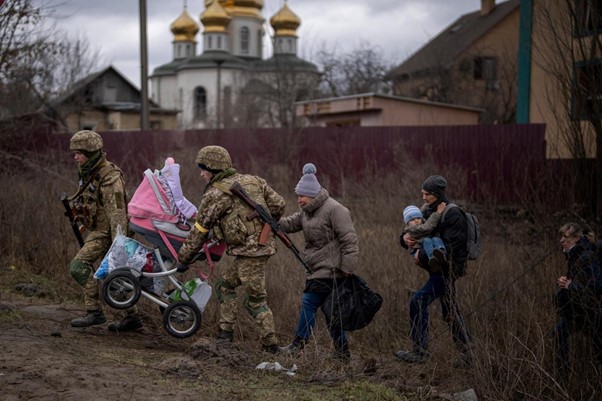
No one has greater love than this, to lay down one’s life for one’s friends. (John 15:13)
It is very difficult—even painful—for me to write these lines. It took me almost three weeks to put on paper thoughts that were on my heart during this time. Therefore, this text is rather a self-reassurance that God is with my people in this horrible time of war.
As I write, the third week of the war in Ukraine is coming to an end. During these days, I constantly follow the news, cry, and pray for my family, friends, and all the Ukrainians trying to survive the bombing and shelling of peaceful cities. As of today, thousands of civilians have been killed, including more than 90 children, and more than two million refugees (mostly women, children, and elderly people) have had to leave their homes/country to save their lives. Hundreds of schools, hospitals, private and historical buildings, and a dozen churches have been destroyed. This is a catastrophe, both humanitarian and of values.
War is a very difficult time. We see a lot of evil, anger, lies, and destruction—and it is so easy to be consumed by all that is going on and forget that God can transfigure these events into something good. We can be active participants in that. During these three weeks, I have been thinking and praying about these things, and I distinguished three moments that are vividly visible now.
Truth. When evil shows its face so brazenly, we can clearly see where the truth is and where there are lies. The Russian government and aggressors use lies everywhere: news, social media, official speeches, church preaching. They call war a “special operation,” invasion and shelling “support and protection” of Russian-speaking Ukrainians, and killing of innocent civilians humanitarian help. We have a popular saying in Ukraine, which derives from John 8:44, and that is that the devil is the father of lies. I agree with this because I am convinced that this war also has a spiritual character. Ukrainians clearly see that they are standing on the side of the Truth. They know they are protecting their homeland, their families, and all that is so dear to their hearts, and that this is the right and truthful thing to do. I am sure that this standing in Truth will help us to win this war.
Unity. Since the first days of the war and the Russian invasion, I have been able to see clearly how united Ukrainians are. This unity is present on many levels. During these days, volunteers in Ukraine and around the globe are organizing humanitarian aid, financial support, psychological help, and many other things. People are united in defending their homeland, in receiving those who left their homes to save their children’s lives, in prayers for peace and victory of the Truth. This unity is not only about Ukrainians—people from different countries around the world are gathering food, clothing, medical supplies, and hosting Ukrainian refugees. This global human unity reminds me of the unity of God in the Holy Trinity.
Love. “No one has greater love than this, to lay down one’s life for one’s friends.” (John 15:13) This verse is the best way to describe the service and dedication of Ukrainian soldiers, volunteers, and all the people who are protecting their homeland. In the first days of the war, a young soldier died in the act of blowing up a bridge to stop the Russian army. A few Ukrainian pilots took enemy fire on themselves to save other pilots. Under the shelling of Russian occupants, volunteers are evacuating civilians and bringing food and water. Love and not anger is the force which is behind all these actions. I cannot deny that there is anger too, but it is rather a reaction to all the atrocities and destruction. Love opens borders and doors for the Ukrainian refugees, saves the lives of POWs, and helps in multiple ways. Love also manifests itself in prayers for those who blindly or consciously came to kill Ukrainians, so that their hearts and eyes would open and that they realize that they are doing terrible things, and return safely home to their families.
Truth, unity, and love are direct signs of God’s presence and are part of his revelation among his people. When I see their presence amid all the suffering, pain, and destruction, I see God’s presence within his people. I do not know how long this war will go on, but I am sure that evil will not prevail because God “is a shield for all who take refuge in him.” (Ps. 18:30)
The University of St. Michael’s College invites members of our community to support one of the many charitable aid agencies engaged in assisting refugees and victims of the conflict, including the Red Cross and Development and Peace/Caritas International.
Read other InsightOut posts.
Angelika Garvey is a fourth-year student at the University of St. Michael’s College double majoring in Book and Media Studies and Sociology. She is currently working as a social media marketing manager and event coordinator. An active volunteer, she helps in non-profit charity organizations, teen camps, and takes part in missionary and humanitarian type aid trips. She is flying to Poland today to help with refugee work at the border.
Victory Through Love
When thinking about my upcoming humanitarian trip to assist Ukrainian refugees at the Polish border, the thought of my loved ones who are standing for peace in Ukraine against Russian military aggression encourages me to help strangers escaping for a chance to live.
Born in the city of Odesa, Ukraine, I spent my childhood enjoying the life of a small city and my teen summer years by the beautiful shore of the Black Sea. I was planning to go to Ukraine this month to help at teen camps and local churches, and to visit my family and friends. But on February 24 at around 5 a.m. my plans changed as the Ukrainian community woke up to the unprecedented news of Ukraine being under a state of war. Russian militaries illegally invaded Ukrainian territories—killing innocent citizens and destroying cities, and bombing universities, hospitals, playgrounds, and a Holocaust memorial.
It was around 10 p.m. EST when I received a text from my grandpa in Ukraine that said, “They are bombing our city and there are six missile strikes on our military units so far.” Shocked, scared, lost, and hoping for all of this to be a nightmare, I found at that moment that all I could do was pray for peace. Thankfully, at that time, I was with friends, some of whom are Ukrainian and have families and friends still living in Ukraine. As we said “Amen,” I received a text saying, “It is quiet now,” from my grandpa. At that moment, joy filled the emptiness within and around the room as we all tried to process this horrific event.
The support of community is vital in such awful moments. It is hard to imagine how difficult it is for one to be alone when watching your family, friends, and home country go through a war. To encourage others going through dismal times of distress, Ukrainian students at U of T were kind enough to share their experiences of coping with others.
“The past week has been the darkest time of my life,” shares Alina Orlova, a Ukrainian majoring in Slavic Languages and Literatures. She continues, “My family and friends are under bombardment. Some of them had to flee the country, and I have spent every minute in fear for their life and well-being. At times, I feel helpless and guilty as I am not with them and cannot physically help. All I can do is support our close ones, raise awareness, and collect humanitarian aid.
“In the past week, I prayed more than I had ever had in my life. I stay hopeful—I believe in our army and people, and I cannot wait for this brutal war to be over so thousands of Ukrainian families can be reunited once again.
“During the chaos, as we barely sleep, eat, or do things as we did before, all we really can do is spread truth about the war to as many people as possible and continue to help in ways that we can. I am endlessly grateful to all people who donate and volunteer right now. Even though your fight is not on the frontline, you save thousands of people’s lives with your contribution,” she says.
Alina also says that the university staff and professors from U of T Slavic Studies “were all extremely supportive and understanding.” She believes that the “professors are also touched by this war and are trying to help their students get through these difficult times. I even received an email from Associate Professor Taras Koznarsky informing students about donation possibilities and resources of help, which made realize that I am not alone in this fight.”
Indeed, we can testify that the support of community around the university and St. Mike’s, which condemned “the unprovoked and unsanctioned invasion of Ukraine” and encouraged everyone to stand “alongside with the Ukrainian community to pray and fast for peace,” is extremely vital during such traumatizing events. Knowing you are not alone facing these troubles brings hope and encouragement to continue focusing on making a difference.
Marta Perehinets, who is part of the Ukrainian Students Club, believes in the significance of educating society on the war. She shares that “USC has been working to promote ways in which the student body can help, like by fundraising, and holding rallies on social media. Despite the ongoing pandemic, the USC also organizes conferences with professors to discuss the historical context to enlighten anyone interested in Ukrainian culture and history.”
Although it is incredibly difficult to remain peaceful as we continue our lives here in Canada, it is inspiring to see universities, staff, and students—local as well as abroad—unite together from all over the world in helping the Ukrainian community go through this terrible crisis. As we keep receiving testimonies and miracles from those in Ukraine through people all over the world, we hope for an “end to the war, and the return of peace, security, and democracy” in Ukraine and across nations.
By uniting our strengths and showing love to our neighbours, we can each provide help from wherever we are to those who need it the most right now. And the world needs it more than ever. After all, we are not strangers. We are all one.
The University of St. Michael’s College invites members of our community to support one of the many charitable aid agencies engaged in assisting refugees and victims of the conflict, including the Red Cross and Development and Peace/Caritas International. A service of prayer for Ukraine will be held at St. Basil’s Collegiate Church this Thursday, March 10 at 1:30 p.m.
Read other InsightOut posts.
Abigail Lawson has spent much of her adult life travelling and relocating to different parts of the world. Raising her two young children in the Middle East and working as a photographer, she has travelled from countries such as the United Arab Emirates to Greece and Italy to Croatia, capturing weddings for clients around the globe. Abigail has recently returned to Canada after a 12-year hiatus from her studies. A Mediaeval Studies major, she is presently writing her senior essay on the exploration of practical mediaevalisms and their application in the classroom, examining how they might be presented to a student audience.
Courtly Love and the “Chick Flick”
“Lancelot followed her with his eyes and heart until she reached the door; but she was not long in sight, for the room was close by. His eyes would gladly have followed her, had that been possible; but the heart, which is more lordly and masterful in its strength, went through the door after her, while the eyes remained behind weeping with the body.”
Chrétien de Troyes, Lancelot, The Knight of the Cart
The label “chick flick” has been used to characterize a particular film genre for as long as I can remember. The pithy designation is recognizable and some might perceive it as a tad reductive, but I have to admit I love a good chick flick. The films offer escapism—a departure from societal norms—depicting romance through a utopian and often implausible lens. The premise of one film in the genre is typically a carbon copy of the following: handsome boy meets beautiful girl, boy and girl fall in love, unforeseen obstacle stands in the way of said love, a battle is fought and won, and the couple live happily ever after.
Although the idea of romance has evolved since the Middle Ages, many people genuinely believe that Cupid’s arrow will strike, and fate will bring them to their soulmate. We love dreaming of a fairytale ending. When that initial spark inevitably fizzles, some believe—sadly—that it must be over. Many of us are searching for that glittery romance repeatedly depicted on screen and in books —ignoring the possibility that this may only exist in fiction. Many men struggle with a hero complex and believe that to be respectable and worthy, they must “save” the woman they love—her knight in shining armour. Women today share more equality with their romantic partners, and finding a woman who needs—or better yet—wishes to be saved by a man can present challenges.
When considering medieval romance and its relationship to modern romance, it is evident that the game has changed; however, the feelings associated with love and romance have not. Romance is depicted as attractive, scary, and even magical in the modern world—just like an excellent medieval romance: “Love without fear and trepidation is fire without flame and heat, day without sun, comb without honey, summer without flowers, winter without frost, sky without moon, a book without letters” (Chrétien de Troyes, Cligès).
Romance, interestingly, has not always been a thing. It stemmed from the mediaeval concept of Courtly Love. The romance was a genre of high literary culture which blossomed in the 12th-century courts of the romance super-fan, Queen Eleanor of Aquitaine. Courtly love, or fin’amor, highlighted nobility and chivalry, following a set of codes and behaviour for ladies and their lovers. Today, these notions exist in our minds with lines such as “Chivalry is not dead!” In romance literature, knights performed extravagant bravery and gallantry for idyllic ladies above their station. Within the narrative of mediaeval romance, we see idealized gender roles through stories rife with overt masculinity and impossibly high standards of beauty and innocence. The patterns of masculinity perhaps unlock mysteries of the past while explaining why the courtly tradition of the chivalric hero is not only very much alive but perhaps here to stay.
Courtly love was never fixed but always unpredictable because Cupid, the God of Love, often initiated it and not the lovers themselves. The epic tales were wonderfully cheesy—often heart-wrenching—depicting undying love, magic and romance. Is it possible that courtly love is to blame for our idealized perception of love? Although today we use words such as courtship, chivalry and romance, somewhere over the centuries our wires have been crossed because the mediaeval poets who first wrote tales of love and chivalry would likely find our notions of romance very different. Literary works from authors such as Chretien de Troyes, Marie de France, Geoffrey Chaucer, and Andreas Capellanus present a unique perspective on social dynamics found within Arthurian courts in the Middle Ages.
Did these stories represent escapism? Probably. The medieval world left little space for a true love story; perhaps the nobility’s only connection to romance was through fiction and fantasy, as courtly love was not associated with marriage. The constraints of a loveless marriage, favouring financial practicality over love, were conceivably a preoccupation found within courts. The confines of society dictated whom one married; therefore, the nobility was left to love from afar. As Andreas Cappellanus stated in rule number one of his Rules of Love, “Marriage is no excuse for not loving.”
Today we pursue a relationship to fall in love and share a bond with our romantic partner; in contrast, mediaeval tales of romance rarely expected their true love to reciprocate. We often associate love and romance with flowers, doves, and heart-felt gestures of devotion—or for this medievalist—stories of brave knights such as Lancelot and his catastrophic love affairs with Queen Guinevere. Our distorted associations with romance could be in part thanks to mediaeval courtly lovers and their impossibly romantic prose.
Have these tales tainted how we connect and identify with love and place undue pressure on the idea of finding “the one” and “living happily ever after”? One thing is sure: the romance genre—both mediaeval and modern—reflects our insatiable human desire to connect with the excitement and mysteries of love and passion.
Read other InsightOut posts.
Rohma Khan is a third-year student majoring in Near and Middle Eastern civilizations and double minoring in philosophy and diaspora and transnational studies, with pronouns of she/her/hers. She has been an equity officer for UTMUN and Orientation leader for SMC. She is SVEP- (Sexual Violence Education and Prevention), IAR- (Identify, Assist, and Refer) safeTALK, and LivingWorks-certified. Currently a Don!
Let’s Talk Frankly
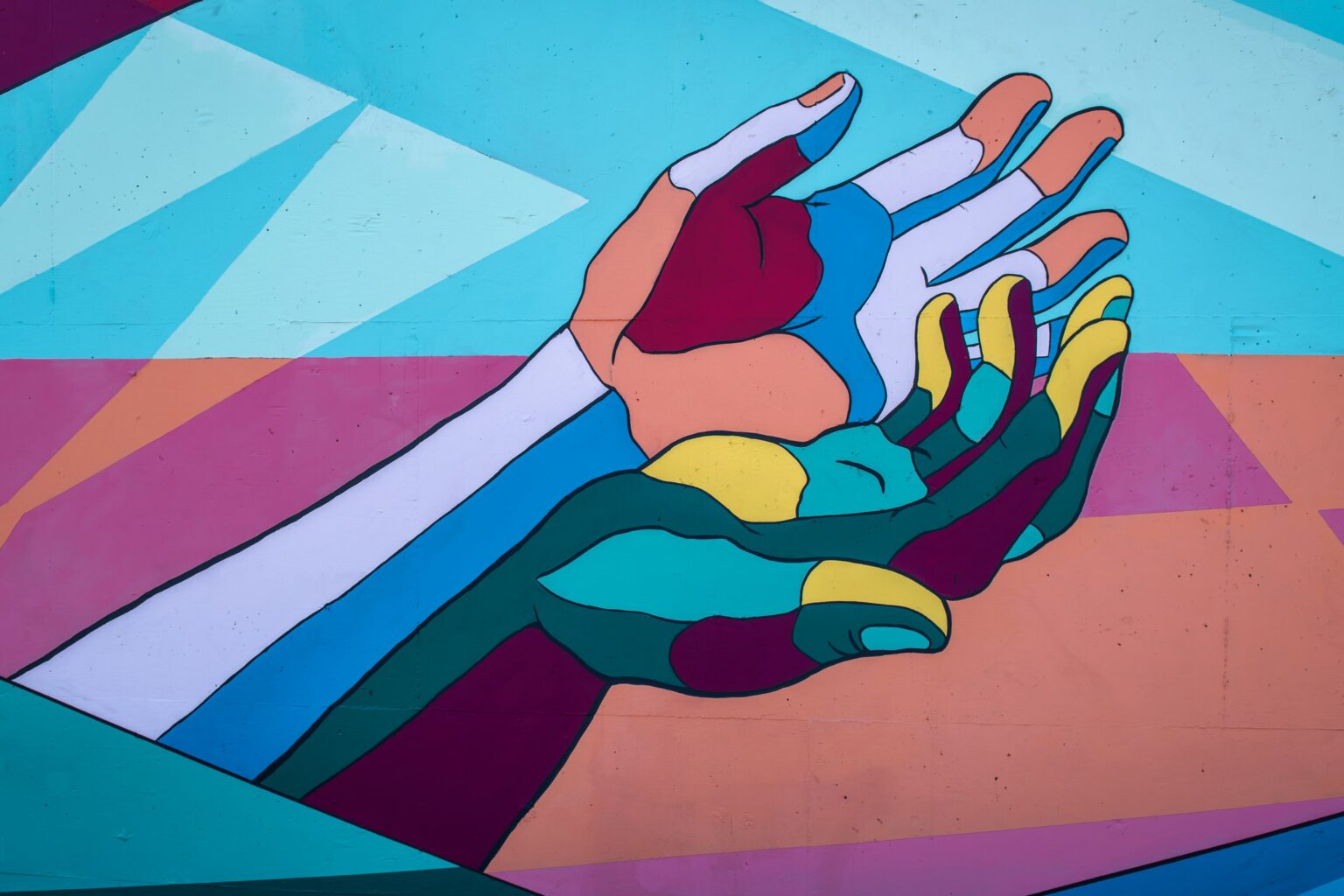
Being a Don is mostly about making sure students feel safe. It’s simple enough in theory; I attended strategizing workshops for programming, promoting inclusive attitudes, and training in suicide-prevention support. This preliminary, foundational understanding I was introduced to alongside other SMC Dons would be key in forming the safe and welcoming environment we envisioned for all SMC students. Learning the concepts and strategies in training compared to applying them in real life turned out to be quite different. I didn’t really know where to begin.
In trying to apply my training, I found myself pulling on my first-year experience to help re-orient my perspective to the potential concerns of my incoming residents. When I came to reminiscing, I realized their experience would be nothing like mine. My first semester was in person, pre-pandemic. I couldn’t relate to the added stress of living through Covid-19 whilst trying to navigate university for the first time. So I pivoted. Instead, I tried to relate to them through the general feelings of anxiety, panic, burnout, stress, and depression, all the things I felt and even continue to feel while being in school as the world confronts Covid-19.
I remember the fall semester of 2020 well: there was no confirmation of vaccine roll-outs, Toronto was going in and out of different levels of lockdowns, the politically charged American climate was starting to manifest in downtown Toronto on the streets in protests, racial and ethnic discrimination was flourishing, as it continues to today, under the umbrella of the virus, and professors re-instated online live, proctored exams, maybe in an effort to return to some state of normalcy after the previous semester ended abruptly in cancelling all exams. I had never had so many panic attacks in four months as I did that semester. Trying to keep my GPA competitive for law school applications in five courses as I worked every weekend at my part-time job while not being able to be with my support systems because of the pandemic was utterly overwhelming. What was worse was that I had internalized my state of chronic pain and thought it normal. I did not want my residents to ever feel like the situation they were in was normal; that the pandemic was normal, that their feelings of burnout and stress were normal. In fact, I want to throw away the word normal. Pain and suffering, sleep deprivation, panic and stress, malnutrition are terms that have all been so normalized in the discourses surrounding university students that the blemishes this pandemic painted on our mental health have been overlooked by both the structures and systems of academia and even ourselves as its participants. It is not enough for the conversation surrounding mental health to be augmented; it must be carefully crafted to the nuances and particularities of a given situation. It must be recognizable and relatable. It took me some time, but I did realize that feeling so horrible all the time is not right, it is not the way to live my life, it is not the way to experience meaningful education, and it is completely unfair to me.
What implementing this realization looked like for me was to have more patience with myself. Procrastination and the looming stress of deadlines for work that always seemed unfruitful would lead to last-minute stress-induced essays that would not attain the marks I expected of myself. It was a cycle. So, I began to incorporate productive procrastination in which I would allow myself to only procrastinate so long as I was doing something that truly made me happy; this looked like making a lot of chai over the semester in my room and watching a lot of Friends episodes, going for walks on campus, cleaning routinely and deeply, working out, or even dancing in my room. Suddenly, I wanted to get my work done faster because I wanted to feel free of responsibility when doing the things I enjoyed.
Another strategy that may work for some is to be kind to yourself. It is a simple idea that means more than some can stomach. For students who are trying to do four to six courses a semester and are unable to sustain their mental well-being in doing so, try re-evaluating your priorities. Is it imperative you take four courses? Does it have to be in this department that you don’t really enjoy? Does it have to be now when you are not at your best? Does it have to be here? Stress can serve as a motivator, but if you find it getting in the way of your work rather than helping it get done, there is an issue. Ultimately, this may look like lightening your workload. There is not much wiggle room here. You may need your transcript to look a certain way, and I completely sympathize with that, but you must ask yourself: at what cost? You come first. Your mental health comes first. There is no normal path to graduation or to a job. Normal does not exist because everything is susceptible to change, every obstacle you face is malleable. Plans can be re-made, can be achieved later, somewhere else, with someone else, every problem can be combatted with new strategies. There were so many opportunities for growth and experience that I couldn’t even comprehend because my mental state was forcing me to live in a rigid structure where I relived pain; my existence was stagnated. Every day I didn’t take care of myself was another day I was stuck in the cycle of harm. I wasn’t being kind to myself, expecting me to get as much done post-pandemic as I did before. Treating myself as a priority realigned my problems in a way that seemed manageable.
The greatest thing I learned in this time, which I continue to incorporate in my support to SMC students, is that community is everything. What remained steadfast for me this year was the support of the Don team. As a new Don, trying to be the kind of person I needed at my lowest for my residents seemed daunting. However, the Don team was exemplary in the care and encouragement they offered me and the students they supported. I learnt how to implement my training alongside my team as they shared with me the similar concerns they had for the community. Knowing that I was not alone in my troubles was half the battle. Checking in on one another, offering each other advice, solace, and comfort helped ease everyone’s minds in these uncertain times.
It was this key insight that made sense of all my training: I am not a trained psychologist, nor am I trained in counselling; I have no experience in being a certified mental health support of any kind, and yet it doesn’t matter. What I am is support. Just like I needed the support of my team to orient me, another may need support to guide them through their concerns. Referring students to the correct people, whether it is on-campus to the U of T wellness centre, U of T accessibility services, our SMC wellness website, the Registrar, the Assistant Dean’s office, or off-campus resources for immediate support like Good2Talk, is not necessarily always about providing an answer, it is about making sure they know they aren’t alone looking for one.
Read other InsightOut posts.
Hedieh Hashemi is a second-year undergraduate student studying Molecular Genetics and Microbiology. Hedieh was one of the orientation marshals in this past year’s orientation, and she currently serves as the St. Michael’s College Student Union (SMCSU)’s Vice President.
Applications are being accepted for the position of Orientation Coordinator until January 23.
The Summer I Found My Home Away from Home
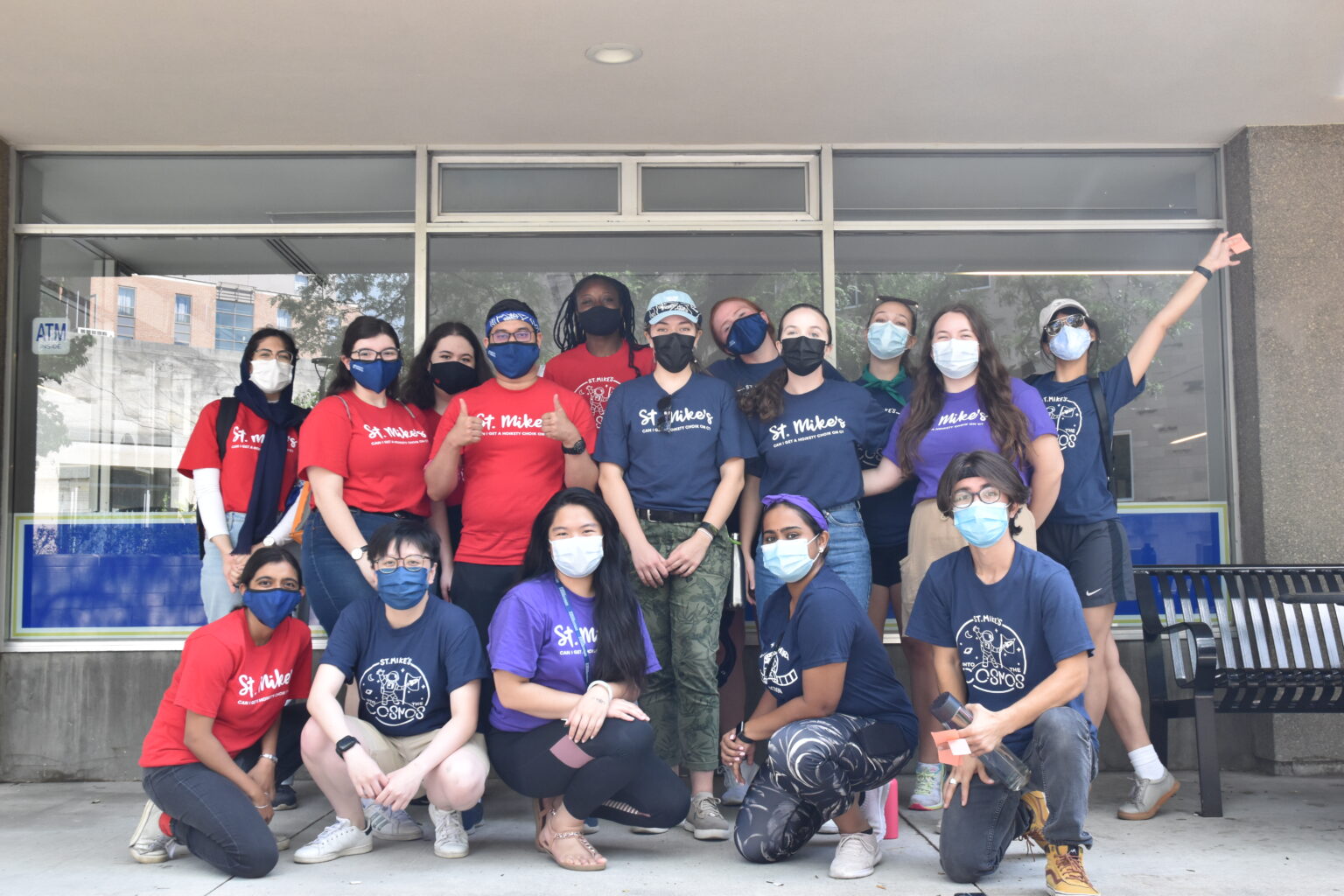
I was the most excited when I got my offer to be a marshal for Orientation 2021. Going through orientation again, this time as staff—how could it get any better? Things were exciting on paper, but as the first meeting came around, I felt nervous. Not knowing anyone on the team—and my not-too-good skills in making friends—added to the online format of everything, all making me doubt if I belonged there. It was hard to believe in myself and trust that I was making contributions to the team.
My overthinker brain, however, wasn’t able to stop me. The good vibes in the meetings, and the excitement that came with every task related to orientation, kept me going. Patience and time cure a lot of things and they surely did work in my case. With every meeting, I got to know my teammates better, I learned that my efforts are appreciated, and the team was so supportive that soon enough I too started to feel confident.
Things got much more exciting as we got closer to Orientation Week—and the best news? We were going to have in-person events too!! Having missed an in-person orientation as a first year, I was so happy to have the opportunity to experience it. Spoiler alert: the in-person experience exceeded my expectations.
I’m not sure if it was because of everything being online for too long and me forgetting what things were like in real life but the environment around SMC was so nice! Every time a familiar face was passing by, there was a wave and a smiley face (technically smiley eyes—masks, you know?). People were so approachable, whether they were orientation staff, orientees, college staff, or the dons. Just a little “Hi!” could be a conversation starter—although I have to give some credit to my red marshal t-shirt too, which made me extra-brave to walk up to someone I’d never met before and start a conversation.
The week was full of fun events, but naturally at some points, things got rough, and there were nights when I got home tired and drained, thinking “I’m done”. And nope, I wasn’t. The next morning, at our daily 8:30 am meeting, seeing the faces of my teammates all full of enthusiasm, hearing affirmations from the Orientation Coordinators (OCs) first thing in the morning, and the team cheering each other on, all made me feel like I could keep doing this forever!
Throughout the day, there were so many small scoops of care here and there: the OCs checking in any time they were passing by, Emma (our Assistant Dean of Campus Life) always making sure the food suited everyone’s dietary restrictions and that no one was excluded, us being asked to put in the group chat and let others know that we’d got home safely whenever we were leaving late at night.… How could I not appreciate my time spent at orientation?
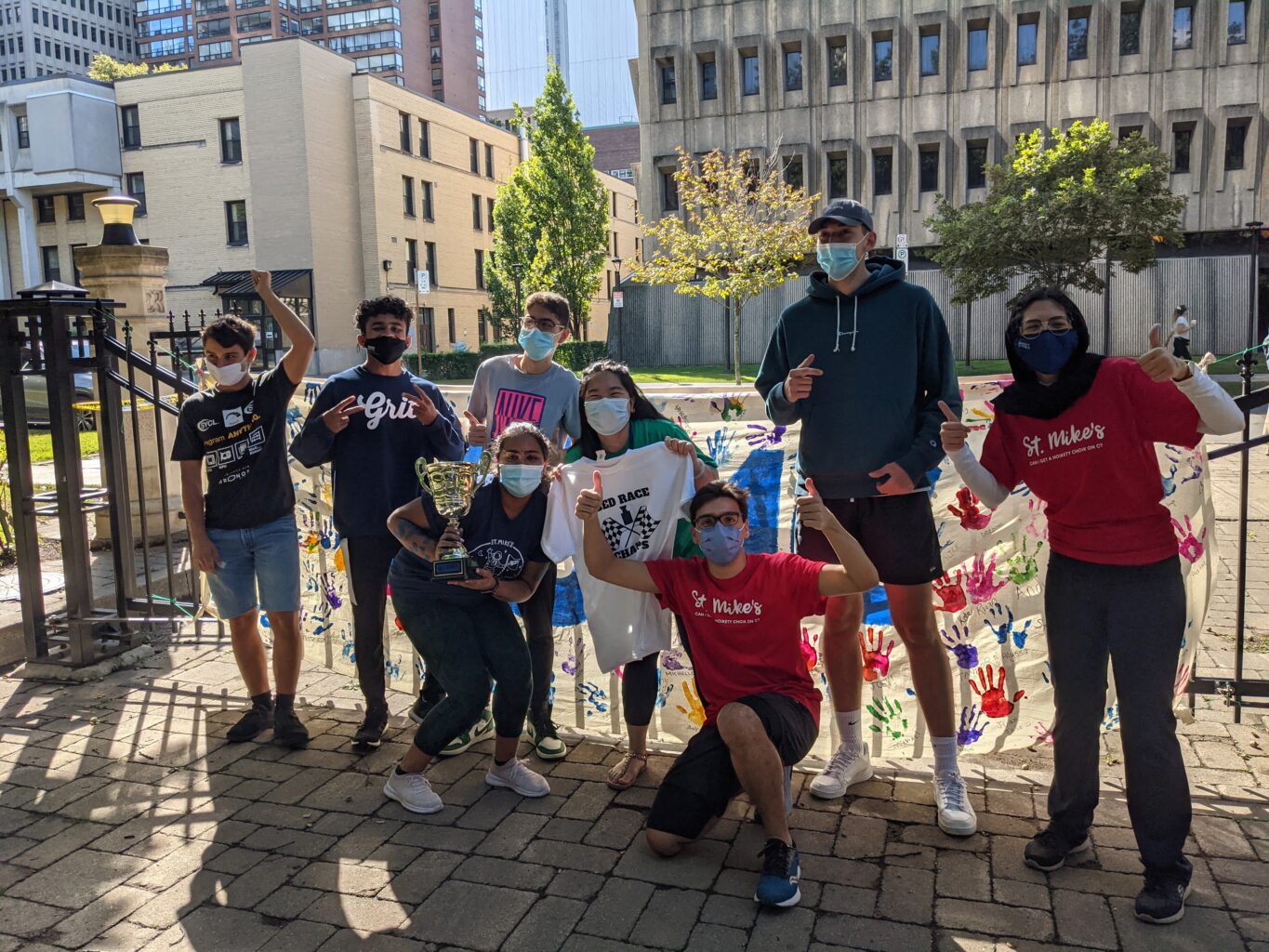
This orientation—which was my first-ever major in-person university experience—made me appreciate in-person interaction a lot more. I was reminded how it’s all the simple things that bring us closer together; things like sitting together and eating together, carrying a box full of orientation T-shirts together, and even running together during bed races (yes, I did have the honour of running in the bed races—and no, my legs weren’t ready for this after a year of staying at home).
This orientation also taught me that I am a fake upper-year, at least when it comes to the campus. During the week I was co-leading some of the campus tours, but did I have any clue what I was talking about? Please don’t expect a yes from me. Good thing was, by the end of my third campus tour I knew all the details of the campus so well that Google Maps might have needed to consider retiring.
Thinking about the bigger picture, it’s just fascinating how all of us came together and did all this work to welcome the new class into our community, and how we did everything we could—from giving tips and running workshops, to setting up campus tours and socials—to help our new class succeed. The passion for giving back to our SMC community made the whole process and all the efforts so much more meaningful.
And yeah, this is the story of me finding my SMC family and falling in love with this college we call our “home away from home,” all thanks to Orientation 2021.
Please note: Orientation 2021 was a hybrid event with all in-person activities following appropriate safety measures.
Read other InsightOut posts.
Matilda Horton is a Victoria College student in her fourth year of her Undergraduate degree, studying Celtic Studies and Drama. She is currently working as an executive for the Celtic Studies Course Union and is in the process of applying to Celtic Studies MA courses across the UK and Ireland. Tilly would be happy to discuss all thinks Celtic Studies at any time, so long as you have a few hours to spare.
A Love for the “Curious World” of Celtic Studies

Some of the first questions asked of Celtic Studies students at the beginning of their introductory classes include: What is Celtic Studies? Who were the Celts? What makes up the Celtic identity?
As you can imagine, I was taken aback by these questions. Aren’t they supposed to tell us what Celtic Studies is? Isn’t that why we’re all here? How can I possibly know all this already?
What I didn’t realize in those first few classes was that Celtic Studies is the pursuit of answers to big questions about a relatively small part of the world. As a life-long lover of puzzles (and their clear-cut solutions), these questions both excited and terrified me. After the initial panic of being met with so many unknowns, I settled into a comfortable state of uncertainty, and this is where the real work began.
Like many of my peers, I came to the program with a genuine interest in Celtic history and identity but with little concrete knowledge. One of my best memories is being seven years old, standing on the side of the road in the north of Scotland. I remember looking around me at the vast landscape and feeling an inexplicable age and weight in the world around me. Since then, I’ve been determined to learn as much as I could about the Celtic world and its history. When I discovered that St. Michael’s offered a program in Celtic Studies, I couldn’t imagine studying anything else. Every day I am offered the opportunity to reconnect with the world that has fascinated me for so long. With every class my peers and I get to dive deeper into the history, culture and concepts that bring back that same feeling of awe in me.
With every class this curiosity is piqued and amazement grows. There is virtually no end to the things we are able to explore within the program. I have been able to delve into Celtic art, history, politics (both modern and ancient), mythology, language, literature, law, music, and so much more. My classmate are musicians, writers, historians, and artists—all of whom, like me, have found a love for the curious world of Celtic Studies. Although the program is on the smaller side, it is mighty. With a variety of student-led and department-run events (Céilí events, guest lecturers, hurling practice, film screening and even baking!) the Celtic Studies community exists vibrantly outside the classroom.
The scholarly experience in Celtic Studies is truly like no other as students have the freedom of studying under a department that is eager for us to explore. Professors challenge students to go further; to follow our inquires as far as they will go, dare to not know, and most of all keep asking questions. Because of these core values of the program, my peers and I have been able to study topics and build skills we never could have imagined (reading ancient Irish and Welsh texts), never thought ourselves capable of (learning a Celtic language!) and will have gleaned facts that will likely stick with us forever (the validity of The Wicker Man: sacrificial ritual or Nicolas Cage film? The world may never know).
I often get the question “what’s next” in my studies. People struggle to see where a degree in something so specific yet all-encompassing may lead. To that I usually have no definitive answer. Not because I have no opportunities: it’s actually quite the opposite. From my degree I have been able to explore paths I never thought possible. Maybe I will work in translations, or publishing, archives, teaching, writing, cultural studies, politics, or curation. Or maybe I will fall in love with a field of Celtic Studies I have never even considered. Ultimately, I am led by that affinity for the endless exploration that this program has instilled in me. As I apply for MA programs across the world in Celtic Studies, I do so fueled by my desire to explore and with an eagerness to see what I discover. No matter what, I will always be asking questions about the Celtic World. What next indeed.
Read other InsightOut posts.
Fall Convocation for the St. Michael’s Faculty of Theology and the Graduate Diploma in Social Responsibility and Sustainability program will take place online on Saturday, Nov. 13, 2021. To celebrate, we’re sharing the stories of some of this year’s graduates.
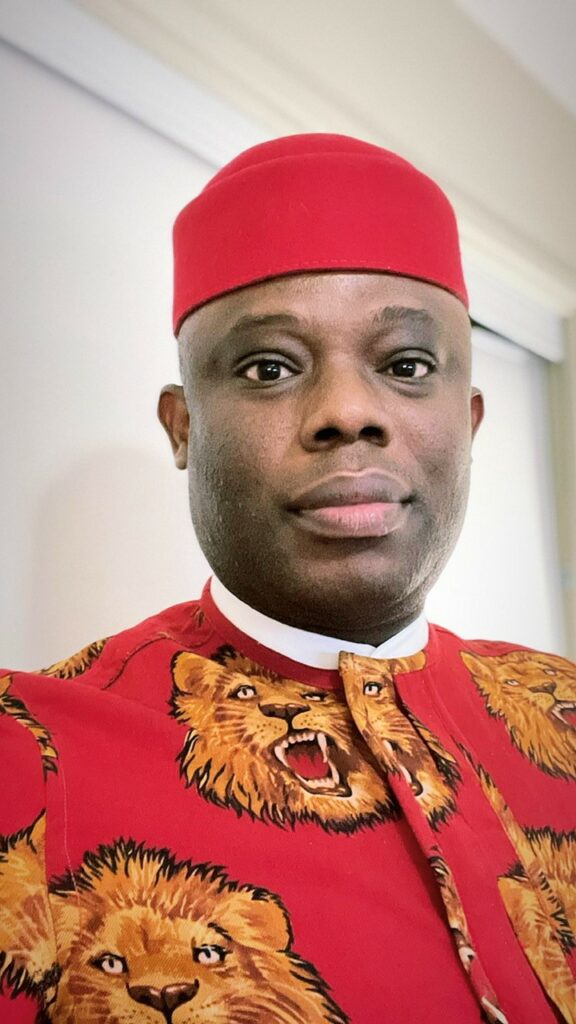
Master of Divinity graduate Samuel O’Ejeregbe was inspired to consider St. Michael’s Faculty of Theology after a priest friend spoke movingly about the quality of intellectual formation offered here.
“I visited Canada for the first time in 2015 to physically see the structures in place and I was utterly impressed,” Samuel recalls. “The professors were so helpful and not really keen on marks but ensuring that, as future Ministers, my classmates and I are a bridge for others, supporting and listening. That struck me!”
Samuel says the speical funding available for international students who are priests or studying for the priesthood is appreciated.
“I am always delighted to let my friends abroad who are keen about studying Theology that St. Michael’s has a good supportive system to support international students. I was moved by the support I received financially from the Faculty, funding that ensured a successful completion of my program particularly during the pandemic. God willing, I will be pursuing a vocation to the priesthood in the Catholic Church.”
St. Michael’s membership in the Toronto School of Theology, with TST’s members reflecting various Christian traditions, was another plus for Samuel, who says he benefitted from the ecumenical approach at TST.
“Love is the greatest. Other religions should not be treated like they are not God’s children because they not Christians.
“St. Michael’s College is welcoming and non-discriminatory, truly living the Gospel message that ‘All be One.’ In my spare time, I hope to assist the University in recruiting friends from the United Kingdom and Africa keen on studying Theology to consider the University of St. Michael’s College as first choice for Creative Theology. Many thanks.”
Celebrate this year’s graduates with us at the Faculty of Theology’s Fall Convocation 2021 page.
Fall Convocation for the St. Michael’s Faculty of Theology and the Graduate Diploma in Social Responsibility and Sustainability program will take place online on Saturday, Nov. 13, 2021. To celebrate, we’re sharing the stories of some of this year’s graduates.
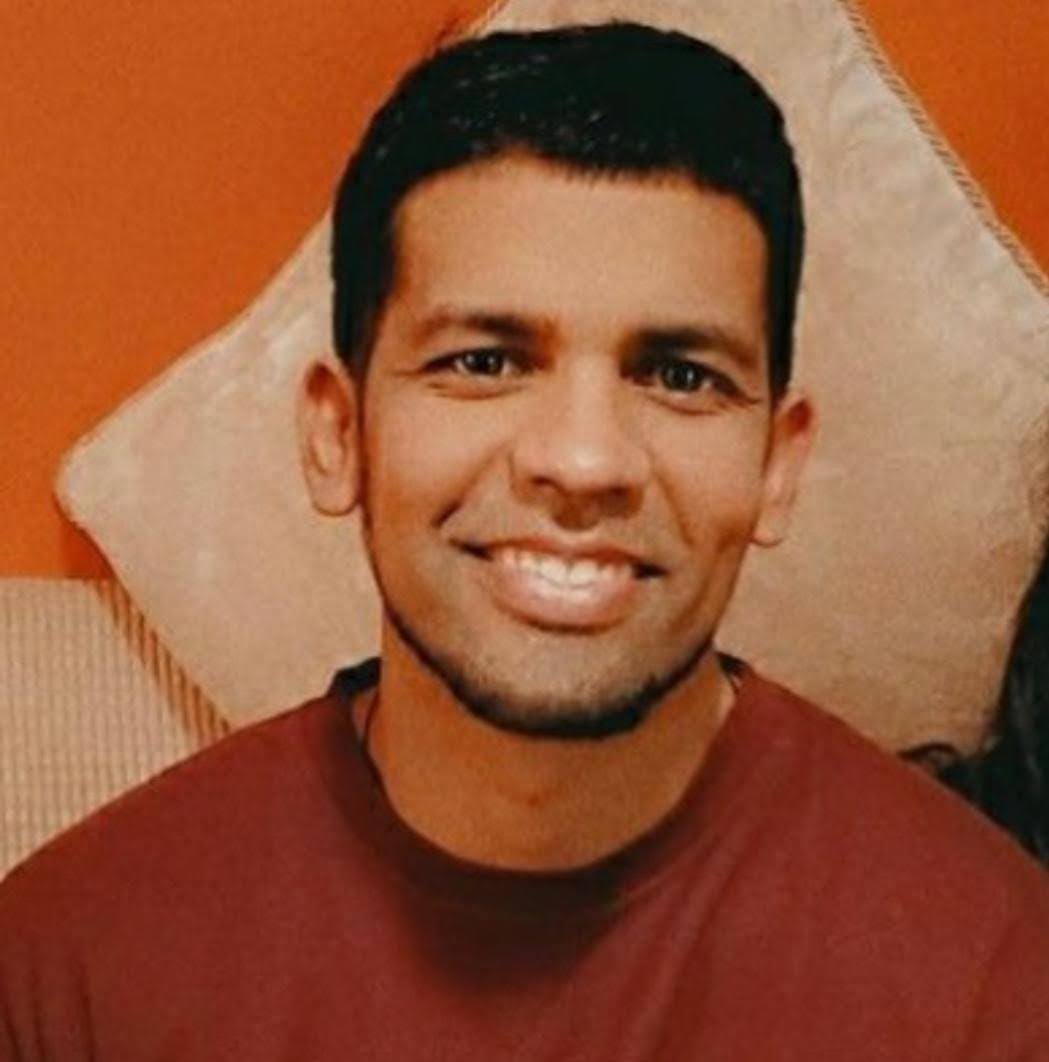
“I was drawn to study at the St. Mike’s Faculty of Theology out of a desire to learn more about my faith and my church,” says Andrew Selvam, a member of the Dufferin-Peel Catholic School Board (DPCDSB) cohort who will be awarded his Master of Religious Education degree on Saturday, Nov. 13, 2021. “At the same time, it became evident that St. Mike’s had an awesome reputation in the field of Theology within the province and country. Having a faculty with a local satellite campus and a program drawn towards educators made it easier to complete my first few courses.”
While the pandemic altered delivery of classes, Andrew says “both the virtual and in-class experiences were enjoyable…. The lectures, readings and discussions were informative and made you want to delve deeper into aspects of faith and course content that you had never thought of before. Professors care about your experience and understanding of the material.”
While earning his degree while working working full-time was a significant time commitment, Andrew notes that program offerings at other colleges within the Toronto School of Theology expanded his choices, both in terms of scheduling and course options. And, he adds, “St. Mike’s also has an incredibly faculty of professors who are here to assist you.”
He singles out experiential learning as a particular benefit to his time at. St. Mike’s, noting the abilty to study ecotheology with the Sisters of St. Joseph at their retreat centre in Cobourg and the opportunity to enroll in A Journey Through History: The Jesuit Mission in Midland were particularly meaningful.
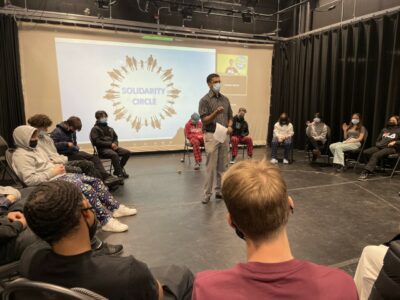
As he looks forward, Andrew says his experience at the Faculty will be a huge benefit as he begins his new ministry as a chaplaincy leader with at Iona Catholic Secondary School, adding that his studies were also relevant to his classroom work as a degree as a science and religion teacher.
“Catholic Social Teaching has made me more aware of the issues facing our world and pushed me further to a spirit of service not only in my local but global community as well,” he says.
“The friends and academic family you build at St. Mike’s will continue to be with you for many years to come,” Andrew says. “I was invited and encouraged by students in the Master’s program at St. Mike’s and hope that I can do the same.”
Celebrate this year’s graduates with us at the Faculty of Theology’s Fall Convocation 2021 page.
Remembering St. Mike’s Fallen
“They shall grow not old, as we that are left grow old,” poet Laurence Binyon wrote in his 1914 classic work, For the Fallen, of those who lost their lives in battle.
More than 150 St. Michael’s men—students and graduates—who died in World War I, World War II, and the Korean War are remembered on the Soldiers’ Memorial Slype, the sandstone archway found between Fisher House and More House. On November 11, 2021 at 10:30 a.m. we will gather there for our Remembrance Day ceremony, recalling our fallen students and all who have lost their lives in battle.
Here are the stories of two St. Michael’s fallen.
Second Lieutenant Joseph Claude Anthony Barker was born in Toronto on March 3, 1895 and attended St. Michael’s in 1912–1913, then enrolled in the College of Dental Surgeons. Through the summer of 1916 he served as a sergeant in the Canadian Army Dental Corps at Camp Hughes, and then returned to college to complete his course. He again served in the C.A.D.C. in Winnipeg and Camp St. Charles in the summer of 1917. In October he joined the Royal Flying Corps at Toronto and trained through the winter in Texas, obtaining his commission in March 1918. After reaching England he was completing his course when he was accidentally killed in a flight near Bournemouth, the day before he was due to go to France. He is buried at Durrington, England.
“I’m infernally proud of being a Canadian,” he wrote in a letter to his family in 1918.
Flight Sergeant John Richard Griffin, the son of John Joseph and Bridget Griffin, was born in Toronto in 1918 and attended St. Michael’s in 1935–1936. He earned his wings with the Royal Canadian Air Force in October 1941 and was sent overseas in November of that year to serve with Division 7 (R.A.F,) Squadron. He died on July 13, 1942 of injuries sustained in combat and is buried in Buxton Cemetery in Derbyshire, England.
“Age shall not weary them, nor the years condemn.
At the going down of the sun and in the morning
We will remember them.”
Laurence Binyon, 1914
Read other InsightOut posts.
Former St. Michael’s College Student Union president Cianna Choo reflects on the role of the student union in building community at St. Mike’s.
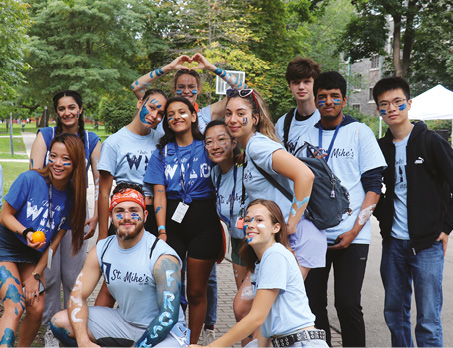
Cianna Choo attended her St. Mike’s orientation in the fall of 2018 and never looked back. “I fell in love with St. Mike’s instantly. The pride you feel walking along Bloor St. screaming cheers,” she recalls. “I knew I wanted to be involved.”
Soon she found herself immersed in activities and has done everything from sitting on a search committee to serving as one of two orientation coordinators for incoming students this past fall.
Today, the 3rd-year Neuroscience, Molecular Genetics and Microbiology student has just finished her term as president of the St. Michael’s College Student Union (SMCSU).
“Whether during COVID or during regular, on-campus times people are looking for a place to fit in while also looking for people who challenge them to think differently,” Choo says in explaining the attraction of St. Mike’s for students. SMCSU wants to engage St. Mike’s students no matter where they are studying on campus, and we have a goal of seeking collaboration. We have around 5,000 students and not all are on the same path.”
One of the places where SMCSU is seeking that collaboration is at the St. George Round Table (SGRT), a student union comprised of divisional student society heads at U of T.
“I feel I’m being heard at St. Mike’s,” Choo says, but with so many students studying across U of T, it is important that she, as a student spokesperson, raise St. Mike’s students’ ideas and concerns to U of T’s community as well.
At St. Mike’s, SMCSU continues to brainstorm and talk to President Sylvester on important issues such as increasing health and wellness supports for students.
“When you’re struggling academically or personally, it is really important that wellness services are accessible and that St. Mike’s can respond immediately,” she says.
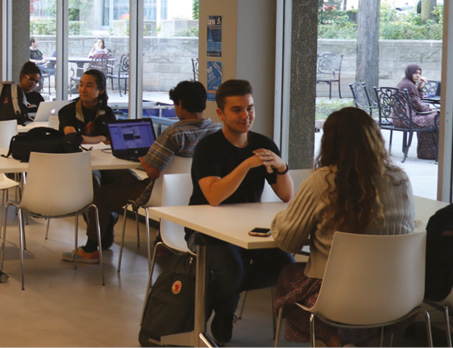
SMCSU’s eye on collaboration also means being conscious of the balance of caring for both residence and commuter students.
“We are passionate about ensuring that what we give to residence students we give to commuter students too. We are hoping to balance these plans by increasing gathering spaces for commuters, such as creating a larger commuter lounge.”
While attentive to traditional student activities such as Friday night socials to bring students together at St. Mike’s, the student leadership team is also focused on issues such as carving out more support for international students.
“International students pay high fees and are often far from home. They are our students and we need to help them feel welcome, feel at home.”
Whether speaking with commuter students or residence students, those from across the globe or from suburban Toronto, Choo says her advice to new students is the same: “Try as many things as you can. Explore and be open to opportunities you might not have considered before. Each experience is a chance to learn more about yourself.”
From University of St. Michael’s College President’s Report, Spring 2021
From navigating an entirely digital academic year to planning out their next adventure in uncharted waters, the 2020/2021 academic year presented novel challenges for St. Mike’s newest alumni.

While all 817 St. Mike’s graduands who will take the virtual walk across the convocation stage tomorrow at noon have had unique USMC journeys, there is one overwhelming sentiment they all agree on: the St. Michael’s community is like no other. “They are definitely some of the best people I have met,” says graduand Natalie Barbuzzi, who studied Environmental and Human Geography.

Sitting down with the St. Mike’s class of 2021, it’s clear what made their time at USMC special was the community. Chiara Perry, Social Science student, says “Regardless of the day I had, as soon as I walked into the Coop there would always be smiling faces greeting me, and how can you not be happy surrounded by your friends?”

Many graduands feel an important thread binding the community together was their appreciation for holistic education. Victoria Lunetta, who studied Political Science and served as chapter president for the Nyantende Foundation, learned her degree is only part of her story: “as I’ve learned from an amazing four years at the U of T… academic pursuits only make up a small part of who I am and who I hope to be.”

As lockdown kept St. Mike’s graduands apart, Adam Da Costa Gomes, Neuroscience and Pharmacology student, challenged what it meant to be a community. He found a change of perspective helped him re-imagine what it meant to find community at a distance.
“I have a strong dislike for the term ‘social distancing’ because that’s not what it is. It’s physical distancing,” Da Costa Gomes explains. “I found by reframing that in my mind, I’ve learned that I’m not socially isolated, and you don’t have to be either.”
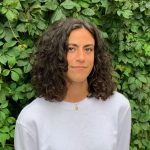
Despite the pandemic, Chiara Greco, Editor-in-Chief of The Mike, saw St. Michael’s students’ passion for creating community grow even stronger. Greco recounts the paper’s 2021 team as the largest ever.
“I’ve been super impressed this year by how many student groups continued to push through and create communities for SMC students despite the pandemic,” Greco says. “The fact that people were still interested in getting involved despite the pandemic really emphasized for me how important student life is to the SMC community.”

Knowing the struggles of finding community, especially after spending a year online, St. Mike’s graduands have some sage words of advice for incoming students.
“Start small, but start somewhere! Join a club that you’re interested in, join a cultural association you resonate with, just make sure you start somewhere!” says Da Costa Gomes.

Sam Gruppuso, Criminology and Sociology student, agrees. “I think if you are new to SMC and trying to find your place, you should try and get involved in as many things as you can and see what feels right to you and stick with it.”
On navigating the academic landscape, Joy Fan, a Public Policy student, reminds students to reflect and go at their own pace. “Re-evaluate your priorities and why you’re overworking yourself,” Fan suggests. “Consider taking a slower pace to university – there’s no need to rush to graduate!”

Reflecting on her own university journey, Sana Moshin recounts a piece of advice she received: “Someone in my first year told me that these would be the best few years of my life, and this certainly held true for the memories that I made in my dorm.”
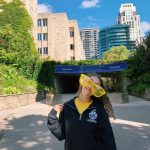
Even though Book and Media Studies student Taylor Medeiros will continue her work creating community with St. Michael’s alumni after graduation, she knows it won’t be the same. “I think that the SMC community is filled with some of the most amazing people I’ve ever met, and I’ll [miss] being able to talk to them every day.”
Greco has one parting message for her fellow grads after reflecting on the distance, burnout, and challenges the Class of 2021 overcame to ensure the community flourished in their final year: “I think what’s important is taking a step back to allow yourself to be proud of everything you’ve accomplished this year.”
Shmily Lin is a first-year student interested in life sciences. He enjoys long walks on the beach, naps, video games and bubble tea.
To My First-Year Self

They say your first year of university is one for the ages. It’s unforgettable, unimaginable, and irreplaceable.
I can’t say they lied.
Like many of us, I went into the year with a profound feeling of loss—that I was missing something I’d never get back. It went beyond turning 18 or leaving home for the first time, and it was coupled with the bitter tinge of disappointment that I’d been robbed of the past four years of hard work.
For the majority in our senior year of high school, perhaps it’s not quite right to say we deserved better. After all, what we get in life is largely drawn in varying shades of privilege. Still, my expectations didn’t seem that unreasonable: partying with classmates while flushing our GPAs down the metaphorical drain, practicing the bleacher walks as the principal handed us our papers, and temporary liberation from learning that was over a decade in the making.
There was a small hope that the pandemic would end along with the last of our childhood, but it seemed only one of those was to be.
I dimly recall spending my 18th birthday in a hotel room at the Chelsea, drinking lukewarm tea from the semi-broken boiler and idly finishing a virtual colouring book with the rest of my quarantine cohort. This was four days after I had arrived in Canada, trading the sunny shores of San Fran for the laze and haze of downtown Toronto.
Exiting that hotel room and re-entering the world was elating, until I remembered that the world was still turned off. University wouldn’t be some magical coming-of-age moment. Nothing had changed except my occupation with fresh air. My life would be lived in my dorm, working on problem sets and hoarding food from the Canada Room.
Life online wasn’t awful, although often I can’t tell whether that’s because I truly feel that way or I’ve just never had the chance to experience anything different. Sometimes I’ll hear stories from the upper years about all the things we’re missing, and they’ll proclaim their profuse apologies. And yet, it’s hard to miss something you’ve never had, much like an absent father or being an only child.
For me, it was okay that the most exciting thing in frosh was when one of our coordinators forgot to un-mute. For me, it was okay that we had to scream over the six-foot distances between the tables in the Canada Room just to have a conversation. For me, it was okay that I have never got to meet my study group in person.
This is the year we were handed, and it was the year I’d make do with.
Personally, online courses were probably the pinnacle of ineptitude. While I can appreciate the convenience of watching all my lectures in the room I sleep, the limited socialization opportunities, the abundance of micro-assignments, and the often deplorable wording of multiple-choice exam questions more than forfeits any positives of zoomiversity.
As a friend so eloquently states, “If I only had an hour left to live, I’d spend it in tutorial, because every time I join it feels like a lifetime.”
People often ask me why I traveled all the way to Canada just to live in another lockdown. And, to be honest, I’d planned my trip when the status quo was to still have a few in-person courses. Perhaps that makes me the biggest clown in the world to spend the year in my dorm room shopping for cute posters and waiting for my Quercus quiz to load. Opportunities were limited, people were scarce, and the food from the Canada Room wasn’t particularly welcoming.
I will say I probably had it better than most. Trudging through high school as an overly sociable person, I took the time to look for what limited opportunities there were—I was elected to my house council, I tried student government, I dabbled in a fair amount of clubs, and I even joined an a cappella group (shoutout to SurroundSound!) to fulfill my dreams of reenacting scenes from Pitch Perfect.
The worst part of lockdown is the repetition of daily habits. The worst part of lockdown at university is the endless cramming of course material, desperately churning out assignment after assignment in hopes of optimizing some strange division of marks. Many courses also had the strangest testing schedules in addition to a mess of other work. In the first semester, I had a course with a midterm in the second week. I had simply thought they weren’t very appropriately named; it wasn’t until much later that I realized midterms usually referred to a test that was actually in the middle of the term.
It’s saddening—but not very surprising—when you realize just how many first years thought the same.
Everything past November felt like even more of a blur, as if my confusion was accelerating with every day that passed. I remember the sadness of not travelling home for the holidays, the stress of finals, and the idle boredom of waiting for an end to a year that seemed everlasting. The second semester felt like Groundhog Day—a reminder that nothing had changed.
I’m living now with the acute knowledge that nothing will change next year either. But if this year has taught me anything, it’s that knowledge can be wrong. Maybe I did go into my first year anticipating a train wreck, and instead I ended up at a foreign station. It wasn’t quite wonderland, but I’m always wonderstruck at how much worse it could’ve been.
I’ve learned that things are never as bad as they seem.
If the pandemic were like a fulcrum, changing the way the world turned, then I still had many levers to pull within myself. So, to my depressed first-year self: you’re gonna have your levers pulled. And, you’re gonna find many levers left to pull.
Life is much a balancing act, and there’s three more years to figure it out.
Read other InsightOut posts.
Christine Way Skinner has been a lay minister for thirty years, a mom for almost that long and a partner to Michael for longer. She is the author of books for both adults and children and, for the next few years, will be a St. Mike’s doctoral student.
A Fork in the Road

What do you do when you are in the middle of a pandemic, you are a few years from retirement and your parish ministry job of twenty-two years is eliminated? Well, let a few tears fall. You rage a little bit. Then you sign up to do a doctorate in theology. Perhaps it might not be what everyone does…but it is what I did.
St. Ignatius of Loyola has been my lifelong guide to discernment. Do you feel a sense of consolation in your decision? It is from God. A sense of desolation? Look for another direction. I had begun a doctorate many years ago, before I had children and before I began parish ministry. The immediacy of mothering and ministry always took precedence over writing and so, after a decade, I withdrew from the program. I was grateful for the education I had received while in that doctoral program and used it extensively in parish ministry. It allowed me to provide adult religious education that nourished the faith of parishioners who wanted to think deeply and broadly about their faith. It supported me in developing religious education programs for children that were not only engaging but sophisticated. The time spend studying at that level had not been wasted.
The longing to learn, to think, to question, to explore, and to challenge my perspectives persistently coursed through my veins throughout the years. I fed it by attending academic conferences and reading voraciously. It seemed enough. For a time. But about 10 years ago, I found myself visiting university websites and began printing off application forms for various doctoral programs. A Doctorate in Ministry seemed the most appropriate as I couldn’t contemplate leaving parish ministry. A D.Min. would spare me the burden of choosing one over another. The printed forms always remained in my “inbox” – uncompleted – until another year passed and they would be recycled and replaced by new versions.
Then, in 2020, my life took a radical turn. I knew immediately the opportunity that was before me. As my youngest son filled out his applications for post-secondary education, I filled out my application for post-post-post secondary education. The bulk of my immediate mothering responsibilities behind me and the ever-expanding tasks of my beloved ministry suddenly part of my history, I was free to surrender to that persistent longing. And so, after many years, I actually filled out an application. I connected with professors from a lifetime ago and collected transcripts of courses that I barely remembered taking—and some that I had relied on daily. I spoke to new professors and thought deeply about which of the many possible directions my study might take. In February, just days after my 55th birthday, I was accepted into the PhD program at St. Michael’s College for the fall of 2021.
It has been a radically different experience contemplating doctoral studies at the age of 55 from the experience when I was 23. I approach it, paradoxically, with a great deal more humility and a great deal more confidence. When I was younger, I was painfully aware of how much I didn’t know. But I was afraid of my ignorance being exposed. This, I no longer fear. At 55, I remain conscious of how much I still do not know. Indeed, I am mindful that I will die having learned but the smallest fraction of what there is to know about the world. And, as student of theology, an even smaller fraction of what there is to understand about the Mystery of God. At 55, I also recognize that I have lived enough days to have gleaned a drop or two of wisdom and that it is my responsibility to contribute those drops in the vast ocean that is human thought. It excites me to know that this is the human condition. Each of us has something beautiful, wise and true to teach. Each of us has even more beautiful, wise and true things to learn.
It is liberating to begin studies at this age. I now know that not one of my papers will be the last word on any topic. I will be able to write them with a certain freedom from obsession because of that. I now know that we can only learn by admitting what we do not know. There is a freedom in that, too. I am privileged to have raised my children, bought my home and need very few material possessions. So, more freedom – to focus on study without the burden of working long hours to ensure a sustainable future (although I will certainly need to work some).
As a gift, I embrace this opportunity – denied, I recognize – to many but offered, surprisingly and grace-fully to me. I study, therefore, for the greater glory of God and for the service of God’s people. For this, I live in gratitude.
Read other InsightOut posts.
Voices Honouring St. Mike’s Fallen
The Soldiers’ Memorial Slype is one of the most moving spots on the St. Michael’s campus. The sandstone archway is found between Fisher House and More House and connects the campus quad to Queen’s Park. Unfortunately, the pandemic has forced the cancellation of on-campus events this Remembrance Day, but our fallen are not forgotten.
Etched into the walls of the spare and understated war memorial are the names of more than 150 men from the St. Michael’s College and St. Michael’s College School, students and graduates, who died in World War I, World War II, and the Korean War.
Here are two of them.
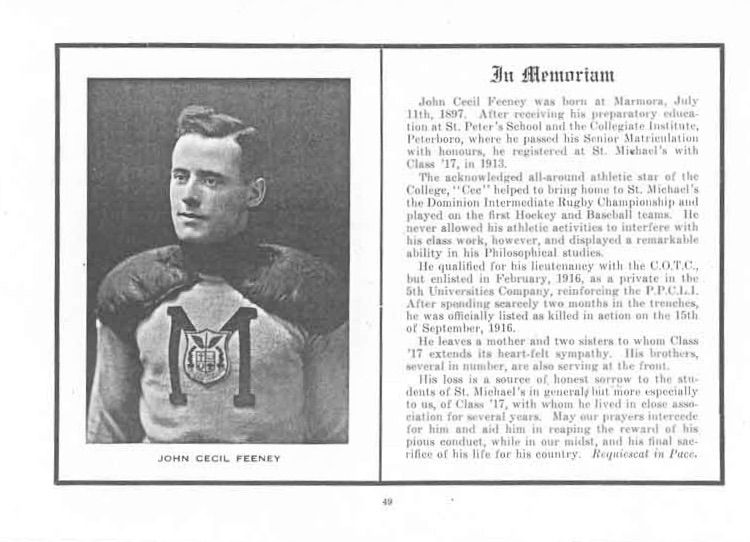
Private John Cecil Feeney was born in Marmora, On., in 1897 and enrolled at St. Michael’s in 1913 to study Philosophy. The St. Michael’s Yearbook of 1917 states that Cee, as he was known to his friends, played rugby, baseball and hockey and was “the acknowledged all-round athletic star of the College.” The yearbook also notes, though, that his love of athletics notwithstanding, Feeney was a dedicated student who “displayed a remarkable ability in his Philosophical studies.”
Although his time serving in the Canadian Officers Training Corps afforded him the rank of lieutenant, he enrolled as a private in the 5th Universities Company, which was part of the Princess Patricia’s Canadian Light Infantry, in February of 1916. In July of that year he joined his battalion in France. Two months later, on September 15, he was killed in action in the battle of Courcelette and was buried there, far from his grieving mother and two sisters, and, as the yearbook notes, “several brothers … serving at the front.” His name appears on the Vimy Memorial in Pas de Calais, France.
“His loss is a source of honest sorrow to the students of St. Michael’s in general,” his classmates wrote, “but more especially to us, the Class of ’17, with whom he lived in close association for several years. May our prayers intercede for him and aid him in reaping the reward of his pious conduct, while in our midst, and his final sacrifice of his life for his country. Requiescat in Pace.”
Feeney is also remembered in the University of Toronto Roll of Service, 1914–1918.
Flying Officer Lawrence Aloysius Doherty, the son of Thomas Arthur and Mary Doherty, was born on April 1, 1918 in Toronto. He was a member of the 414 Squadron of the Royal Canadian Air Force, enlisting in Hamilton in 1940.
While on a secret mission over the English Channel on June 6, 1943, he alerted fellow officer Rowan Hutchinson that he had spotted a trio of German planes—Folke-Wulf 1900s, according to the Canadian Virtual War Memorial—about to attack. His warning saved Flying Officer Hutchinson, but Doherty’s plane was shot down over the Bay of Biscay.
The accompanying newspaper article below quotes Hutchinson as explaining that he was flying in the lead when Doherty radioed to say, “Look out, Hutch!” prompting Hutchinson to turn just in time to see his friend’s plan crash into the water.
“Larry saved my life,” Hutchinson explained.
Doherty, with no known grave, is remembered on the Runnymede Memorial in Surrey, England.
He is also honoured in the University of Toronto Memorial Book of 1939–1945.
They shall grow not old, as we that are left grow old;
Age shall not weary them, nor the years condemn.
At the going down of the sun and in the morning
We will remember them.
“For the Fallen,” Laurence Binyon
1914
Read other InsightOut posts.
Mike Czobit is the director of the Office of the Principal, and the coordinator of SMC One. Before joining St. Michael’s in 2017, he was an editor and writer at World Vision Canada.
There Will Be Cake
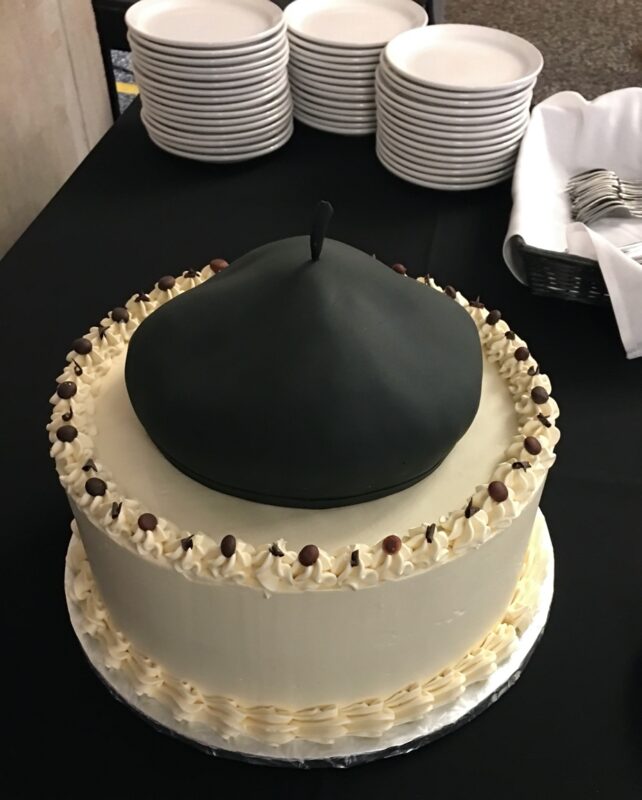
Every year, before the Gilson Seminar in Faith and Ideas meets for its first lecture in September, we have an opening reception and something we call the “Beret’ing In.” To the tune of Prince’s “Raspberry Beret,” each incoming Gilson Seminar student approaches the lectern in Charbonnel Lounge and receives a black beret, officially joining the seminar. After every student has been beret’ed in, cake is served—a special kind of cake: raspberry beret cake.
This tradition is a night of fun and introductions before the hard work of the Gilson Seminar begins. The course, which is split into two half-term classes over the course of the year, is one of three first-year seminars offered by St. Michael’s College as part of our SMC One program. The other two seminars are the McLuhan Seminar in Creativity and Technology and the Boyle Seminar in Scripts and Stories.
These seminars are among the most popular first-year courses at the University of Toronto, owing to a number of factors. For example, each is taught by a member of our talented St. Michael’s faculty in a small class setting that fosters fascinating discussions and close friendships with fellow classmates, and each features an international learning experience. In the Boyle Seminar, students are invited to travel to Dublin after the April exam period. A trip to Silicon Valley takes place during reading week for the McLuhan Seminar. And the Gilson Seminar’s second half-course has its destination in its title: The Gilson Seminar in Faith and Rome.
For most people, international travel these days has been ruled out for health and safety reasons, and for the impracticality of visiting a country when it likely requires a quarantine upon arrival. But, back in February, before the present conditions of international travel took hold, there still was the possibility to go to Rome or Dublin. In fact, that was the plan for both the Gilson and Boyle classes (the McLuhan Seminar had traveled to Silicon Valley last November, before anyone here had really heard of the virus).
In the Principal’s Office, we are responsible for organizing all three SMC One trips. Throughout January and February, we proceeded as usual, preparing students by holding Safety Abroad workshops, requesting traveler information, and making airfare arrangements. We worked with our partners in Dublin and Rome to finalize details for each trip, and in the case of Rome, arranged for tickets for the Pope’s Wednesday Audience. Everything was proceeding as it had every year, except, as everyone knows now, this wouldn’t be a normal year.
By late February, my office was paying particular attention to reports of COVID-19 cases emerging worldwide. When the first few cases surfaced in northern Italy, we were concerned but hopeful that the country would get control of the virus. Reflecting on that now makes me realize how little we all knew and how naïve my optimism was. Day by day, in early March, the number of infected patients rose. Not just in Europe, but also at home. These developments worried our SMC One students, who began asking my office questions about the safety of our planned trips. At the time, we honestly didn’t know what the virus would mean, but we assured our students that safety would be paramount and that the trips could be postponed. Then, on March 12 that happened. The University decided that due to safety concerns, all student travel would be postponed until further notice. This was the right decision.
After we unwound the arrangements for the planned trips, my office had a different task to attend to, which was to start recruiting for next year’s SMC One seminars. When we promote these classes, we do the opposite of shying away from discussing their travel components. But during this recruitment period, getting on a plane to go somewhere far away seemed like the least desirable thing to do. At the same time, the 2020–21 SMC One seminars were months away and the situation in March would change—and, to be optimistic, be much, much better.
We pushed forward with our recruitment effort, inviting incoming U of T students to apply for a spot in our seminars. We expected that we would struggle to fill the classes. We expected that SMC One would have lost its popularity. What happened was something different.
When the application window closed on June 15, we had received the highest number of applications for SMC One in the three years their present format has existed. In fact, we doubled the total number of applications over our previous best. Our incoming students were not deterred by news reports of the virus or of how international travel will never be the same. They reacted to the closing of borders with a greater desire to see them open again. What they want, and what classes such as SMC One will provide, is a return to better times when a desire to explore and experience life and culture in different parts of the world can enrich a university education.
As the new academic year begins, we have begun planning for our SMC One classes. Different this year is that all three will take place in the Winter term, with the hope that all will be able to be in-person or have a larger in-person component than is safe in the Fall term. It is too early to know what international travel will look like in 2021, but we’re hopeful that conditions will improve.
Every year, the Gilson Seminar begins with berets and cakes. We hope to see this tradition resume in this coming year’s Gilson class. And when the cake is finally served, it will have the double meaning: welcoming a new class to St. Michael’s College and also celebrating how far we’ve come through difficult times. When we began our recruitment effort for SMC One in the spring, we were pessimistic about our prospects of filling these classes. Our students showed we should have felt otherwise.
Read other InsightOut posts.
Catherine Mulroney is a communications officer at the University of St. Michael’s College. She is also a double alumna of St. Mike’s, holding a B.A. in English and Mediaeval Studies and a Master of Divinity degree. That equals many hours in Kelly Library and many, many overdue fines.
Raising Our Voices
It began—as many of the best things do—with someone volunteering an absent colleague for a little extra work.
Our new St. Mike’s blog, InsightOut, is the result of an after-hours conversation with Communications Director Laurie Morris and Theology prof Dr. Darren Dias on March 16, the last day we were all present on campus. Dr. Dias mentioned that his colleague, Dr. Michael Attridge, was self-quarantining at home after a research trip to Italy.
“It’s a good story,” Fr. Darren said. “You should ask Mike to write something for the website.”
Then the wheels began to turn. While not one of us could predict just how the comings weeks and months would play out, we knew we were facing an extraordinary moment in the university’s history. There would be value, we thought, in hearing each other’s experiences in, and thoughts about, living through such a momentous period.
Four months later, we now have a pattern established of InsightOut blog posts running on the St. Mike’s home page every Monday and Thursday. Each story, each opinion, is unique. And as the person privileged with soliciting and receiving submissions, I am humbled by the chance to be part of the process.
Graduate student Fr. Gustave Noel Ineza, O.P., for example, spoke about his childhood during the Rwandan genocide and urged us not forget the suffering of the broader world as we focus on local troubles.
Alumnus Dr. Christopher De Bono,Vice President of Mission, People and Ethics at Vancouver’s Providence Health Care, wrote about how moving he found his neighbours’ nightly ritual of banging pots and pans and making noise to celebrate the dedication of health care workers.
Interim Principal Dr. Mark McGowan, meanwhile, a professor of History and Celtic Studies, submitted a video explaining the typhus epidemic of 1847 in light of the current situation.
Professors have written about what their subject areas tell them about the pandemic, while students have talked what St. Mike’s means to them. And alumni members like Patricia Dal Ben, along with her colleague John Kostoff, a member of St. Michael’s Collegium, offered their professional wisdom on how families can keep a faith life alive when unable to get to Mass.
Some people have shyly offered to submit while others, when approached with a specific topic, agree with grudging good humour.
Coming posts will touch on the reality of working from home as a parent, how we are preparing for the coming academic year, and even how to get married during a pandemic. Pieces have ranged from moving to amusing.
Anyone who has worked through these past months will have experienced their colleagues in new ways. Zoom meetings reveal family photos or a glimpse of a partner or pet. A phone call might be interrupted by a delivery person at the door of what has become a home office.
For those of us working at St. Mike’s, the blog has taught us about family, we’ve heard admissions from those who miss their colleagues, we now know about our officemates’ hobbies, and we have gained insight into who we are as a community and what makes us unique. When we are at our best, it seems, we are closer to being family than colleagues.
But lest this sound like busy work or a grand vanity project, it’s anything but. While we’ve gained insight into our colleagues, the blog’s purpose is very much outreach. Having worked on planning various campus events, I know how people look to St. Mike’s to keep them engaged with the world and continuing on a path of lifelong learning. And if we can’t do that in person, some reflections and mini-online lectures are a sound alternative.
Parents of future students may come away from this blog reassured that not only are the people who’ll be working with their children skilled, capable professionals, they are also decent and caring people.
Future students can read the blog and find out some of the cool work happening on campus, and look forward to engaging in the kinds of discussions that make university a once-in-a-lifetime experience.
And alumni can engage with InsightOut and know that their alma mater remains vibrant and in good hands.
One of the great ironies of this time of masks and social distancing is that through it we have been brought closer together. We now know more about each other and, more often than not, knowledge brings with it respect. We have learned to work together in new ways and have seen the value in teamwork.
As we approach the fall, this blog will begin to pivot toward other aspects of life at St. Mike’s, looking ahead to a time when we can put the pandemic behind us.
If you are connected with St. Mike’s and would like to participate in InsightOut, please send me an email to chat about a submission.
Having heard the stories of the St. Mike’s community, I am confident we will head into the fall ready to take on pretty much anything. As the hashtag says, we really are all in this together.
Read other InsightOut posts.
Hi. I’m Peter Mason, a first-year engineering student from the U.K. living in the Historic Houses. In the St. Mike’s community, I’ve loved everything from talking to film assistants on their on-campus sets to just being close to my friends. From my love of travelling, I’m working on sustainability projects around Canada and the larger world, and supporting small Canadian businesses affected by COVID-19 by writing a children’s book, working with thisbag.ca. Always smiling.
Forward.
Our quarantine. We’re stuck at home, unable to travel freely and be together, but things are opening up soon. I’m from England, but I was in the GTA for quarantine until very recently, there for an extra three months, with a good friend from St. Mike’s. Aside from adjusting, I spent time thinking about my extended stay, what’s happened this past year and where my motivation has gone.
In my quarantine in Canada, I treated each day as its own, focusing on the super short term. I didn’t know when flights would open up, and so it was best not to think about being ‘isolated’, ‘stranded’ or any of the above. And I didn’t feel that way, but perhaps that’s because I’m pretty used to adapting. With this attitude, I was able to take each day, and I felt happier. Not every day would be productive but I’d learn something and take that positive step into the next one. I also meditated more. I’m grateful for the memories I’ve made and the people who were by my side this year. Meditating helps set up my day for whatever could happen. It also helps gradually inch away at hard thoughts and choices rather than reacting to them once they hit you all at once.
I received genuine kindness from my friend’s family during my extended stay in Canada, and this is a reflection of how I’ve felt throughout my time in Toronto so far. Unexpected, but I felt very welcomed and I can only be thankful. It was hard to say goodbye, but I know I’ll see them again. At the airport, I took extensive care to be aware and clean. Yet, there was no one there! I started to think there were more staff than passengers. It was a very eerie, silent experience and, I pictured what the deserted airport looked like the last time I was here five months earlier. I remember a lengthy Starbucks queue. It felt as if I was part of a TV show and I was left alone in an airport.
In the fall semester, I fell a little bit into the annoying trap of saying I had a lot of work. I’m in that small bracket of engineering students at St. Mike’s. Once I heard the same line from my roommate, I re-evaluated what I was saying. I began to balance classes, soccer and social activities in St. Mike’s better, and in a different way to the winter semester. However, I kept the same mindset. My attitude going into university was to hope to enjoy what I was studying, make some friends and keep on helping people. If I was smiling, I’d be alright. I would be pretty flexible to dip my toes into new things and meet new people and looking back I think I can say I met some pretty motivated people. They’ve introduced me to Canada and its culture, and I’ve shared what I’ve known.
I like to think I’ve done my best to contribute back to it, and hope my actions and words have helped people this year. Yet, I didn’t make it simple. For those who don’t know me, I end up balancing a lot and taking too much on my plate. The reality dawned on me, and my friend’s opinion was right. I couldn’t study and get the grades to retain my scholarship, play for three soccer teams, follow my passions, and be a part of St. Mike’s without burning out. I have those around me to thank. And for those of you I knew better, I miss your smiles.
As I look back, I do so looking forward. I remember how travelling used to be my goal, and I reminisce about St. Mike’s dynamic and vibrant individuals. Yet, I realize I shouldn’t wait, but keep making steps forwards. Whether that’s sharing initiatives, listening and learning and supporting my friends, I’m not 100% sure what’s ahead, but I’ll be ready. If this can get us closer to a future where we are proud to see each other again, I’ll keep trying.
For that future we are trying to chase, how do we try to define that? When Matthew McConaughey won an Academy Award for Best Actor in 2014, he spoke of his hero being himself in 10 years. He’d always look up to the future him, but never be his hero as he’d always be 10 years away. This is great on a personal level for moving forward. I couldn’t have imagined my life being like this 10 years ago, but I’d be proud of the big moments and the small laughs. I hope we can together reflect on the progress we’ve made in a year, or in a decade. We’re moving to Mars, we can produce more sustainable clothes, and we’ve reduced famines globally. We’re not there yet by a long way, but let’s appreciate our progress and look up to the community we will define together.
In the last few weeks, I read a lot, listened more and kept on learning. This helped me start my blogs on Medium and Vocal, and allowed me to grow. We’ve all grown, too. From the start of quarantine, I remember the social media shenanigans, sadness at missing basketball games, or waving a final goodbye. But look and think about what has happened since. My friends have made visors for fire stations, supported Black Lives Matters protests, and taken on leadership positions across so many different areas. We’re tackling mental health issues among ourselves and preparing ourselves for when we return. I’ve chosen to better myself and share that with others. It is the confidence I’ve gained from being at St. Mike’s this past year that I can use to make a longer lasting change, one that I couldn’t have made before meeting everyone.
Read other InsightOut posts.
These last few months have not been easy, but St. Michael’s student athlete Curtis Harvey has found a way to make a difference.
Countless students headed home when the university announced the cancellation of all in-person classes due to the COVID-19 outbreak on March 13; however, the fourth-year Varsity Blues men’s hockey player stayed put in his Toronto apartment.
“I’ve been on my own for most of quarantine as my roommates moved back after the school year,” said the industrial relations major from Keswick, Ont. “My mom took over my room in Keswick to stay somewhat isolated from my dad and sister.”
Harvey’s mother, Jayne, works at River Glen Nursing Home in Sutton, Ont., and like so many healthcare heroes, did her best to isolate herself from her family.
“It has been weird whenever I go home,” added Harvey. “For the most part I stay outside but not being able to hug my family hasn’t been easy.”
Just when they were getting used to their new ‘normal’, the River Glen Nursing Home suffered a COVID-19 outbreak. Jayne and 30 of her coworkers moved into a nearby motel to fully isolate from their families.
Wanting to help and witnessing all of the generosity in the community, Harvey sprang into action. He enlisted the help of the Varsity Blues men’s hockey team to raise money and provide his mom and her coworkers meals after their long shifts.
“I first pitched the idea when Coach [Ryan] Medel gave me a phone call after we heard about the delay to the start of the season,” said Harvey. “He thought it was a great idea and said if there was anything he could do to help, he would. I sent a message in the team group chat explaining the situation and set up a GoFundMe page where they could make donations. My teammates and the staff were incredibly generous.”
To date, Harvey and the men’s hockey team have provided two meals to Jayne and her coworkers in Sutton, with a third on the way, thanks in large part to U of T assistant coach and former NHL’er Mike Zigomanis.
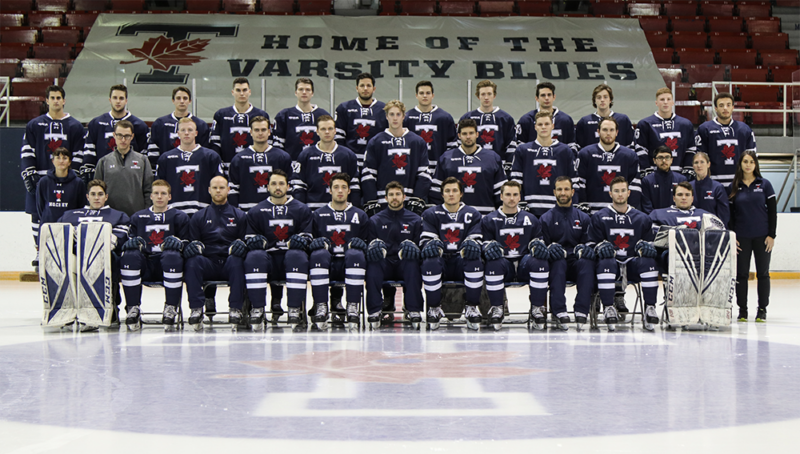
“I got the idea from the community. A lot of people and local shops have been donating supplies or meals to healthcare workers. I figured if I could make their day even 1% better, it would be worth it.”
Harvey also credits his friend and current Ottawa Senator, Chris Tierney, for the great idea.
“Chris donated a weeks’ worth of meals for nurses and I thought it was amazing.”
Jayne is just one of many healthcare heroes who continues to fight this pandemic and Harvey couldn’t be more proud of her.
“My mom is doing well and she just had her eighth negative test. It’s been hard on her not being able to come home every night and have the support from our family. My dad’s been great through this. He often will grab food from town and bring it to her for dinner. He’ll sit by his car and they’ll talk about the day and enjoy a meal together.”
The burning question in everyone’s mind is ‘what will you do when this is all over’? For Harvey, he’s excited to spend quality time with his family again.
“I know we are hoping to be able to go up to the cottage together at some point this summer. We just got it last fall so we’ve been chomping at the bit to get up there and utilize it.”
Julia Orsini is a member of the graduating class of 2020. On Tuesday, June 2, 2020, she was granted an Honours Bachelor of Arts degree with a Major in Political Science and Double Minor in English and Italian Culture and Communication. She will be pursuing a Master’s Degree in Marketing at Schulich School of Business in September 2020.
Double Blue Forever
Coming from a long line of family members with double blue running deep in their veins, I was so excited to carry the torch in my academic journey and become a St. Michael’s College student myself. By reflecting on my time working with USMC Orientation, teaching chants like Hoikity Choik and Bubbaloo, I couldn’t help but remember learning them at a young age and wearing my dad’s oversized SMC sweater. For decades, St. Mike’s has influenced education through Basilian teachings to transform young enthusiastic student minds into great leaders, and the university welcomed me with open arms the fall of 2015 with opportunities to grow and develop.
At USMC we are always quick to discuss our tight-knit community. It is no wonder the place quickly became the home that I had been expecting on my arrival, and hence why it will be so difficult to leave now that I have graduated. I learned early on that your university experience will be whatever you put into it, and I knew being heavily involved in the USMC community from the start was integral to my five years here. As I prepare to leave the gates of USMC behind I am confident that my time and experiences here have helped me mature in ways I could have never imagined when I first stepped foot on campus. My time with the St. Michael’s Troubadours Drama Society and The Mike are notable memories, including having the opportunity to find creative ways to connect the Young Alumni community as a work-study student at the Office of Alumni Affairs. The latter is now becoming reality for me as I become part of the Young Alumni Community myself.
Although our USMC Class of 2020 had the unconventional experience of graduating via a YouTube Convocation, I truly believe that everything happens for a reason and that God does not give you more than you can handle. I believe that the Class of 2020’s unwavering determination to continue learning without a traditional university experience is a testament to our strength as a community capable of accomplishing greatness.
Despite not having the traditional convocation, the University of Toronto administration still managed to recreate the procession, which I watched as I gathered with my family at home on the couch. Instead of wearing fancy heels that bore the impact of walking across campus from USMC to Convocation Hall, I opted for comfy house slippers. Rather than trying to find my parents in the sea of people as I waited for my name to be called out, we screamed, celebrated and cried when my name appeared on our television screen, and we held each other tightly. It turns out our unprecedented virtual convocation allowed me to celebrate instantaneously with my family in a way that transcended distance, continents and time zones.
I am proud to be a St. Michael’s student turned Young Alumni member, and share with the graduating class the optimism for a better and safer future as we continue to form new knowledge, skills and experiences to keep the world on turning.
Read other InsightOut posts.
Ann Mathew graduated from St. Michael’s College, University of Toronto, in 2019 with a double major in English and Christianity & Culture. While an undergraduate, she served as an editor on Saeculum, the student peer-reviewed journal associated with the Christianity & Culture program. She has just completed her first year of the three-year Master of Divinity program at the Faculty of Theology. A member of the Faculty’s Student Life Committee, she also sits on one of the subcommittees preparing for the coming visit by the Association of Theological Schools, the Faculty’s accrediting body.
Adjusting to the New Normal
Writing this draft in the glory of the Risen Lord, I am also thrilled to have completed my first year of the Master of Divinity program at the Faculty of Theology at St. Michael’s College. Although this global situation of the COVID-19 pandemic has deeply affected all of our lives, taking a special toll on the state of classrooms, the fact that I had enrolled in a couple of introductory online courses at the Faculty meant I was quite prepared for the virtual classroom setting. That being said, this shift in one’s surroundings was indeed surprising.
Being a commuter student, this change was admittedly rather welcome. To avoid rush hours and wind chills between home and campus for the second half of the Winter semester was an unexpected blessing in the present circumstances. The faculty and administration were rather prompt in addressing us about the changes that were about to take place. In light of the various final papers and deadlines, I recall the commute to campus to hoard up on library books before the closure. While many online resources have been made accessible to us by the university, there were still a few books that I needed to check out. My transit experience on March 16th was interesting, insofar as that, during what would have been an otherwise crowded morning commute, the TTC subways ran almost barren to the bones. Strategically planning my time between the Emmanuel College and John. M. Kelly libraries, I managed to bring home some 12 books. The ride home was eerie in that many at Union Station were homebound—luggage and neck pillow-clad, with no return date in sight.
The remaining four weeks of classes flew by and we all seemed to adjust to our Zoom meetings, despite technical difficulties with Internet crashes at home, screen shares and background noises. Given the limited access to research materials, my professors graciously agreed to deadline extensions, along with concessions to primary sources. Throughout my undergraduate years, the Kelly Library gave witness to my eremitic lifestyle as each semester concluded. This time, however, my family got to experience my two weeks as a recluse. Truth be told, I rose with Christ on Easter Sunday as I submitted my final research paper.
The whole world has more or less been brought to a halt. Each one of us plays a crucial part in maintaining normalcy, and the community at St. Mike’s has helped me adjust to this new normal, especially during the most stressful time of the semester. Currently, I am awaiting the commencement of online courses in the summer. Until then, I am passing time by engaging in some leisure reading, creative writing, family prayer, card games and such. As Archbishop Cardinal Collins often mentions in his daily homilies, let us continue to demonstrate our “love for our neighbour” in these days of keeping to our homes. May we find inspiration in the most trivial of things, all the while getting a step closer in knowing ourselves and emerge out of this phase as finer human beings.
Read other InsightOut posts.
Seven members of the Class of 2020 have received Student Leadership Awards from the University of Toronto for their outstanding extra-curricular contributions to the College and the university as a whole. Over their university careers, these students have organized St. Michael’s Orientation, served as dons and mentors, edited journals, founded clubs, coached intramural teams, held Student Government positions, and much more.
St. Michael’s congratulates:
Michelle De Pol – coordinated the St. Michael’s Mentorship Program, served in several leadership roles for St. Michael’s Orientation, and was Co-Founder and President of Cards for Humanity, a club serving homeless youth.
Samuel Vincent Gearing – very active in Student Life as a Residence Don and Campus Ministry Student Leader, and served as Vice President, Religious and Community Affairs for the St. Michael’s College Student Union.
Bridget Carroll Hager – Editor of Garm Lu, a Celtic Studies journal, and was also a Commuter Don.
Robin Martin – Vice President and then President of the Women and Gender Studies Student Union, Crisis Analyst and then Specialized Agency Director for UofT’s Model United Nations conferences, and served in multiple leadership roles for St. Michael’s Orientation.
Charlie Mitchell – Residence Don for three years, a St. Mike’s Intramural Basketball Coach, and the President of the American Culture Club.
Paul Nunez – founded and served as President of St. Mike’s Wellness Club, and was also a St. Michael’s Orientation Marshal.
Anna Zappone – coordinated St. Michael’s Orientation in 2019 after supporting the event in other leadership roles in prior years; she also served as Vice President, Communications for the St. Michael’s College Student Union.
Established in 1994 by the University of Toronto Alumni Association (UTAA) and the Division of University Advancement, the University of Toronto Student Leadership Awards (formerly the Gordon Cressy Student Leadership Awards) recognize students who have made outstanding extra-curricular contributions to their college, faculty or school, or to the university as a whole.
Second-year St. Michael’s student Oghogho Abigail Iyekekpolor understands the importance of feeling represented.
She recalls sitting in a high school class in Toronto when the work of Caribbean poet and playwright Sir Derek Walcott was being discussed.
“I looked around my class and I was the only black person, yet here were all these other students engaged in his work. It almost brought tears to my eyes,” she recalls.
She had a similar experience this semester when, on the first day of one of her classes, a black woman professor walked in to teach.
“It took me telling my friends what it meant to me for them to understand. People don’t recognize how important it is to have people they can relate to, who are models for them,” she explains. “It’s important for people to take the time to think about how other people – and they themselves – are represented.”
Now, Iyekekpolor is putting that understanding into action at St. Mike’s by launching a new social media campaign called #SoulsofSMC. The campaign, to be overseen by the Office of Student Life, will focus on students on campus whose stories will inspire and motivate their peers to get involved in a range of activities.
“It’s great to know there are other students at St. Mike’s who share your values and experience,” she says.
Weekly posts will focus on someone – usually a student leader – who will select from a list of questions to share her/his experience at St. Mike’s, offering answers to questions such as how to develop a sense of St. Mike’s as home, or how to navigate cultural challenges. The option to choose which questions to answer promises that the profiles will be as unique and diverse as the students themselves.
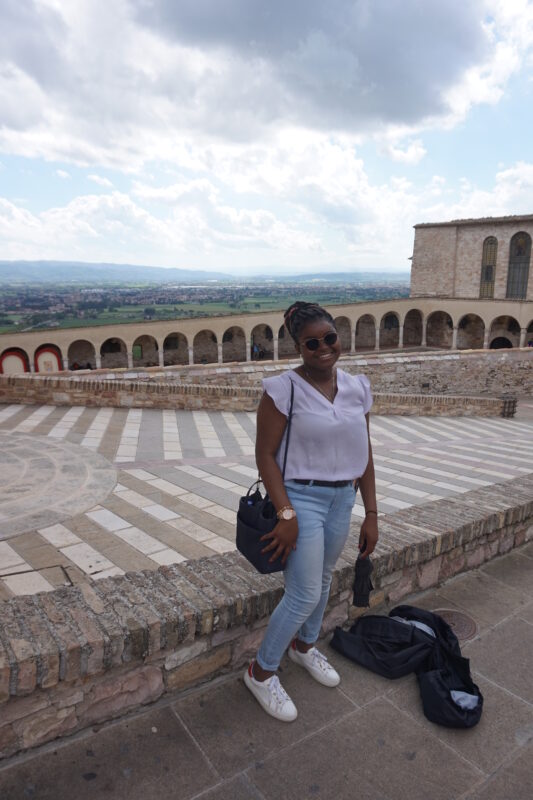
Many weeks the posts will be linked to a theme. As the project launches this week, for example, the post will be tied to the Week of Prayer for Christian Unity, which has just concluded. The following theme will be February’s Black History Month, and Iyekekpolor and Student Life Associate Emma Graham have a lengthy list of suggested themes on how to celebrate the community.
It’s no surprise this dynamic idea was created by a dynamic student. Double majoring in neuroscience and psychology, with a minor in French, she was a participant in her first year in St. Mike’s SMC One program the Gilson Seminar in Faith and Ideas. Iyekekpolor also works part-time as a Student Life programming assistant, splitting her time between handling social media posts and helping to plan events with various clubs on campus. It was her idea, for example, notes Graham, to plan Season it Just Right!, two February workshops on African and Caribbean cooking to mark Black History Month.
When she’s not engaged in school or work, Iyekekpolor also belongs to an a cappella singing group through the Faculty of Music and is preparing for a big competition. Her long-term goal is a career in medicine.
You’ll find #SoulsofSMC in the following locations:
Twitter: @USMCStudents
Instagram:@ustmikesstudents
Facebook: St. Michael’s College Students


